
Lit Hub's Most Anticipated Books of 2020
A Look Ahead at the Year in Reading
Considering the fact that it was the end of the decade, and that we’re all trying to distract ourselves from the encroaching heat death of the planet, it’s not surprising that the 2019/2020 list season on the literary internet has been particularly robust—and much too long. That said, we couldn’t help but end it with a bang. For our very last list (of this kind anyway) of the season, we hereby present the 281 (sorry, we couldn’t help it, all other lists must die by our hand) 2020 books most eagerly anticipated by the Literary Hub staff. Get going—this is going to take a while. This is a snapshot of the year to come in books—some of which we’ve read, some of which we haven’t, but all of which we think deserve your attention.
JANUARY
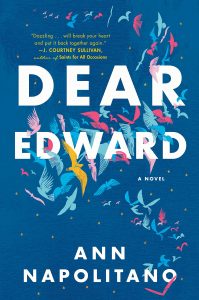 Ann Napolitano, Dear Edward
Ann Napolitano, Dear Edward
Dial Press, January 6
Twelve-year-old Edward Adler is the sole survivor of a plane crash that kills not only his parents and brother, but 191 other passengers. Following two timelines. Napolitano tells the story of Edward and his family boarding the plane at Newark Airport, a narrative somehow filled with suspense, even though we know the ending, and the aftermath of the crash when Edward moves in with his childless aunt and uncle and must figure out how to move on with his life. As Ron Charles so aptly describes in the Washington Post, “Napolitano has written a novel about the peculiar challenges of surviving a public disaster in the modern age. She shows with bracing clarity just how cable news and social media magnify misery and exposure as never before.” It is a devastating novel, of course, but also a story that pointedly asks, and answers, how we can live when living seems impossible. –Emily Firetog, Lit Hub Deputy Editor
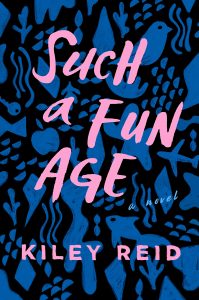 Kiley Reid, Such a Fun Age
Kiley Reid, Such a Fun Age
Putnam, January 7
Kiley Reid’s much buzzed-about debut, about a young black babysitter working for a white family (the mother of which is an influencer of sorts) in Philadelphia, is the kind of book you have no choice but to read from cover to cover, forsaking all other obligations. (If you can swing it, I recommend tearing through it on a plane, where there’s less chance of interruption.) It’s juicy and smart and timely (and Lena Waithe has already acquired the rights to adapt it into your next favorite film and/or tv show). –Jessie Gaynor, Social Media Editor
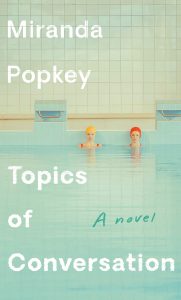 Miranda Popkey, Topics of Conversation
Miranda Popkey, Topics of Conversation
Knopf, January 7
In Popkey’s debut novel, a narrator recounts a series of encounters, of conversations spread over 17 years, from 2000 to 2017. Almost all are between women, and the eponymous topics of conversation are just what you might expect: desire, sex, self-loathing, art, being children, being parents, being lovers. Popkey is the closest I’ve read to a millennial Rachel Cusk, but the real pleasure in this novel is the cadence of her sentences, looping and digressive, self-editing—these are sentences that show their work, and the effect is mesmerizing. “Conversation is flirtation,” our narrator tells us. “Tease out enough rope and the listener, she’ll hang on your every word.” Consider me seduced. –Emily Temple, Lit Hub Senior Editor
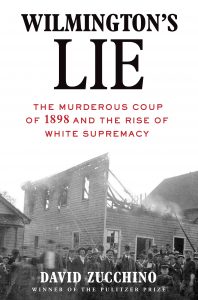
David Zucchino, Wilmington’s Lie
Atlantic Monthly, January 7
For many (too many), it took the seismic election of Donald Trump to fully apprehend the racism upon which America is built (being told repeatedly that the moral arc of the universe bends toward justice has a way of reconfiguring the histories we’re prepared to accept). Which makes David Zucchino’s propulsive history of the 1898 Wilmington coup as important as it is tragic, a case study in the failure of post-Civil War Reconstruction. Through the 1890s the city of Wilmington, North Carolina was a model for burgeoning black middle class life, an example of what a racially mixed community in the south might look like on the eve of a new century… Until a consortium of white supremacists, in government and out, stepped in to destroy it. –Jonny Diamond, Lit Hub Editor in Chief
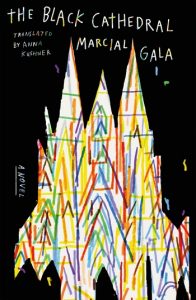 Marcial Gala (tr. Anna Kushner), The Black Cathedral
Marcial Gala (tr. Anna Kushner), The Black Cathedral
FSG, January 7
Marcial Gala’s The Black Cathedral (translated by Anna Kushner) isn’t an easy novel to pin down: it abounds with narrators, and its sprawling narrative can feel overwhelming at times. But what ultimately emerges is a story of family, an account of a transforming Cuba, an exploration of religious devotion, and a harrowing tale of a sinister man engaged in horrific acts. The Black Cathedral might not be what you first expect, but its unpredictability serves as one of its many strengths. –Tobias Carroll, Lit Hub contributor
 Robert Hass, Summer Snow
Robert Hass, Summer Snow
Ecco, January 7
For half a century, Robert Hass’s companionable voice has been a guiding sound in an age against wisdom. His work approaches the scale of what we do not know with respect and variety. A long-time translator from poets of the east, especially Basho and Buson, Hass also appreciates the clarifying ring of a single image. Still, from Field Guide, his 1973 debut, onward, he has developed his own warm kind of prosody: a loose, rangy, California poetic line that is a West coast sonic cousin to Whitman’s, without the barbaric yawps, and a more pronounced eastward spiritual lean. Hass’ last all new book was thirteen years ago, so Snow in July is an event, and it does not disappoint. This voluminous collection features a host of knock-out new poems, elegies, prose riffs and dispatches from the snowy peaks of a life approaching its eighth decade. –John Freeman, Lit Hub Executive Editor
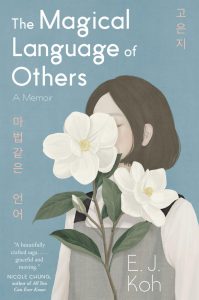 E. J. Koh, The Magical Language of Others
E. J. Koh, The Magical Language of Others
Tin House, January 7
In 1993, E.J. Koh’s father accepted a job in Seoul, Korea, stashing his teenage daughter with her brother in Davis, California. The job came with perks, but not for the author of this exquisite memoir, who grew up feeling abandoned, stripped of her past. How could her mother leave a daughter behind? Years later, after an itinerant youth, some of it spent as a dancer in Korea, Koh discovers a box of letters from her mother, written in Korean, asking for forgiveness. The Magical Language of Others translates these letters into English, weaving them elegantly into Koh’s own story, crafting a meditation on longing and the ties that were supposed to bind. At first, in the letters, mother and daughter converse in broken Korean, but as Koh’s familiarity with the language grows, so does the complexity of what Koh’s mother can tell her. Eventually, when Koh begins to study Japanese, they switch into that language and the learning begins again—and the stories grow. In the book’s latter parts, we learn that Koh’s maternal grandmother was also separated from her children when she lived in Japan during a tumultuous time, disguising herself as Japanese for her own safety. As Koh describes her own trips to Japan, she powerfully captures the way time accordions in the body. How the tongue contains all the secrets to the past, if only one can teach it the languages of others. –John Freeman, Lit Hub Executive Editor
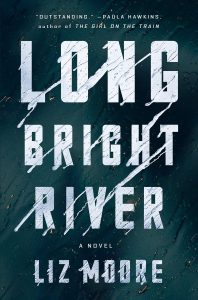 Liz Moore, Long Bright River
Liz Moore, Long Bright River
Riverhead, January 7
The Rome Prize for Literature winner and author of The Unseen World (2016) returns with a character-driven literary thriller set in a Philadelphia neighborhood ravaged by opioid addiction. The lives of two once-inseparable, now estranged sisters—Kacey, a homeless addict, and Mickey, a beat cop patrolling the same dangerous streets that have stolen Kacey away from her—converge once again when Kacey disappears at the same time a mysterious series of murders occur in Mickey’s district. Moore’s previous novel was both an intricate, suspenseful mystery story, and a sublimely written meditation on familial love and loss. Long Bright River promises the same immersive, hybrid pleasure. –Dan Sheehan, Book Marks Editor
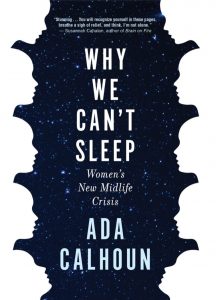 Ada Calhoun, Why We Can’t Sleep
Ada Calhoun, Why We Can’t Sleep
Grove, January 7
If Helen Gurley Brown’s 1982 Having It All coined an adage, Why We Can’t Sleep shows what happens when the shine has worn off. Drawing on hundreds of interviews with middle class, middle-age women of all races and from nearly all 50 states, Ada Calhoun shows where Gurley’s motto led Generation X women—the first cohort of women not just told that they could have it all, but that they ought to. Exhaustion, Calhoun reports, has been the destination. Marriage implosions, rising debt, and a constant sense of failure pop up throughout this brief but potent and sometimes funny book. Calhoun tries to take stock of what a mid-life crisis looks like for her generation of overstretched middle class women. Indeed, Gen-Xers carry more debt than Millennials and Boomers around them. How do Calhoun’s subjects respond?
One mother takes a hammer to her kid’s iPad when a final warning doesn’t send him back to homework. Another calls in sick and goes to movies during the day to cry in private. It might be easy to make fun of such responses—many people in the country, let alone the world, don’t have an iProduct of any kind to smash, let alone a job to shirk, but Calhoun is quick to acknowledge how for the women she interviews that awareness adds yet more shame to their feeling. Why can’t they get it together, why can’t they just be grateful? Pain and being overwhelmed, Calhoun concludes, at least for the women she interviews, is not an enlarging experience but an isolating one. On that level, Why We Can’t Sleep might do much to let readers like the women Calhoun writes about that they are not alone. –John Freeman, Lit Hub Executive Editor
 Courtney Maum, Before and After the Book Deal
Courtney Maum, Before and After the Book Deal
Catapult, January 7
For most writers (a broad category of aspirational self-identification that warms my heart!) getting an actual book deal is the be all and end all, the final trophy at the end of a thankless, grueling marathon… But wait! There’s more, a lot more. If any of this gives you anxiety—the before or the after—Courtney Maum is here to help, along with the 150 literary stars she’s called on for advice. The key word in the book’s subtitle—“A Writer’s Guide to Finishing, Publishing, Promoting, and Surviving, Your First Book”—is that last one in the series, and Maum should know: a great exemplar of what it takes to make a life in literature, Maum is a tireless advocate of her fellow writers, while also finding the time to publish five books (thus far), and run an annual writers’ retreat, The Cabins. This is the how-to book for a new era of publishing. –Jonny Diamond, Lit Hub Editor in Chief
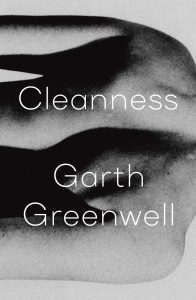 Garth Greenwell, Cleanness
Garth Greenwell, Cleanness
FSG, January 14
“Oh god,” I yelled out on page three of this novel. My husband poked his head into the bedroom. “What?” I buried my face, in distress, in literary ecstasy, in relief. “I just love him so much,” I said. “He’s still so good. The sentences!” “Ok dear,” said the retracting head. But the intense elegance of Garth Greenwell’s prose—even when he’s describing rough sex or embarrassing passes or drunkenness—always startles me. It’s insane that anyone should be this good at writing, that anyone should be able to stir up the emotions of strangers so quickly, so deftly. This novel, like Greenwell’s first, What Belongs to You, is set mostly in Sofia, Bulgaria; also like his first, it is a profound meditation on love and ways to love; also like his first, it is sad, beautiful, and cathartic. It may stir up feelings you didn’t know you had, or those you didn’t want to face. But you’ll be glad you did, in the end. –Emily Temple, Lit Hub Senior Editor
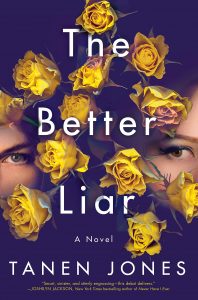 Tanen Jones, The Better Liar
Tanen Jones, The Better Liar
Ballantine, January 14
Tanen Jones’ debut joins a host of crime novels featuring women teaming up for nefarious ends, including Lisa Lutz’s The Passenger and Amy Gentry’s Last Woman Standing, and I’m delighted to see so much teamwork gracing the page of the feminist thriller (although of course, even the best partnerships can fall apart given the right stressors). After her father’s death, a young woman finds out she won’t inherit anything unless she can find her sister, estranged for over a decade. When she fails to track her errant family down, she hires a drifter to impersonate her missing sister so as to be able to claim her inheritance. At first, the arrangement is working out for everyone—but both women have their own secrets to hide. –Molly Odintz, CrimeReads Associate Editor
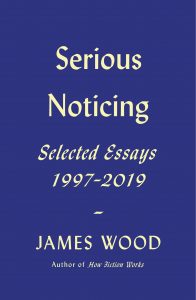 James Wood, Serious Noticing
James Wood, Serious Noticing
FSG, January 14
James Wood has been writing criticism for 30 years now, but in America his impact emerged in the late 1990s, when The Broken Estate was published, his name built on skewering big-name writers. There was—and has always been—far more to his work than reputation hunting. As an essayist, his ability to climb inside a book and speak of it in the book’s own language is unparalleled. Reading Serious Noticing, a selection of his work since 1999, is to watch Wood wrestle with tradition and new work in ways that feels intimate, hilarious, sometimes almost personal. Metaphors and similes animate each of these essays. “Chekov is more gloomily scrupulous than Hrabal,” Wood notes, “who likes to heat his caught enigmas.” “Krasznahorkai’s work tends to get passed around like rare currency,” he writes in another essay on the Hungarian cult writer. And of Helen Garner, “her unillusioned eye makes her clarity compulsive.”
Essay to essay, even when Wood tromps into the knee high snow drifts of high art, the action easily returns to those of us who live on earth. Perhaps it’s because reading is how Wood notices the world, and, in his own English way, loves it. Unlike his father, who became a priest in his fifties, Wood remains spiritually untethered, his Sundays as free as ever. So he reads. “Often in life,” he writes, “I have felt that an essentially novelistic understanding of motive has helped me to begin to fathom what someone else really wants from me, or another person. Sometimes it’s almost frightening to realize how poorly most people know themselves; it seems to put an almost priestly advantage over people’s souls. This is another way of suggesting that in fiction we have the great privilege of seeing how people make themselves up—how they construct themselves out of fictions and fantasies and then choose to repress or forget that element of themselves.” –John Freeman, Lit Hub Executive Editor
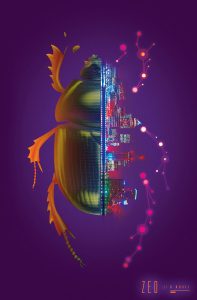 Joanna Kavenna, Zed
Joanna Kavenna, Zed
Doubleday, January 14
This spooky thriller by England’s most brilliant mid-career novelist feels like an apocalyptic sequel to I, Robot directed by Samuel Beckett. It’s sometime in the near future and software giant Beetle has created a new algorithm so powerful, so good at surveilling us, that there are no more surprises. And of course, no free will. That is until one morning, Beetle employee Douglas Barley wakes to learn that a man has gone home after a hard night on the booze to murder his wife and family. What follows is a brilliant satire of how hard tech giants work to pretend what they’re doing is merely handing us a tool, when in fact they’ve scrambled the very functioning of our minds—which, originally, were meant to work together. Full of hilarious riffs on the way language itself fights back against control, and plot twists that seem to borrow from a gumshoe crime caper, Zed is a fabulously intelligent rejoinder to the idea that a tech dystopia is inevitable. –John Freeman, Lit Hub Executive Editor
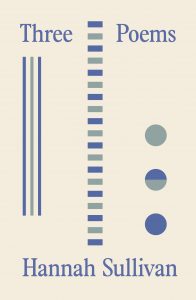 Hannah Sullivan, Three Poems
Hannah Sullivan, Three Poems
FSG, January 14
The normcore title of Hannah Sullivan’s T. S. Eliot prize-winning collection doesn’t prepare you for the tenderness that lives in its pages. Seven decades after Frank O’Hara’s famous walk among the humdrum cabs of Manhattan, Sullivan to comes to New York to see it for herself and is perplexed, simultaneously glad and underwhelmed. The long opening poem, told in second person, is hymn to that complex emotion: of arriving after the party is over. How you have to learn to see around what you expected. Not long after a first season in the city, the poem’s heroine is “listening to Bowie in bed, thinking about the hollows / Of his eyes, his lunatic little hand jigs, longing for Berlin in the seventies.” What is nostalgia, the poems seem to ask, if it emerges out of experiences not yet had? Of things one did not actually live through? Sullivan’s ability to enfold the ongoingness of seeing into being lends her poems a companionable air in a time of bewildering media. Right up front they admit they do not have the American sublime figured out, and as Sullivan moves from love to its crinkled aftermath you feel as a reader like you’ve been befriended by an honest and true voice in the old-fashioned sense, one you’ll want to hear from again. –John Freeman, Lit Hub Executive Editor
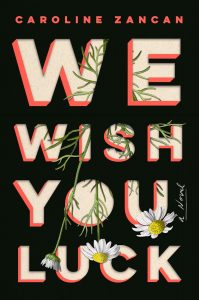 Caroline Zancan, We Wish You Luck
Caroline Zancan, We Wish You Luck
Riverhead, January 14
Well, this novel is literary catnip if I’ve ever seen it: young writers, bad teachers, revenge, poetry. A Eugenides-esque chorus of students narrate the events of their time at a low residency MFA program in Vermont (the author graduated from the Bennington Writing Seminars, and is now a Senior Editor at Henry Holt), piecing together what they know, imagining what they don’t know, and telling the story of what happens when one brilliant student dies, and when the mysterious girls who love him make it their business to make those responsible pay. –Emily Temple, Lit Hub Senior Editor
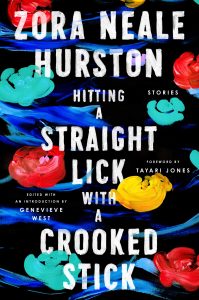 Zora Neale Hurston, Hitting a Straight Lick with a Crooked Stick
Zora Neale Hurston, Hitting a Straight Lick with a Crooked Stick
HarperCollins, January 14
Thank God for archives. In 2016, Amistad at last released Zora Neale Hurston’s Baracoon, which grew out of her interviews with Cudjoe Lewis, the last remaining survivor of the Middle Passage. The book, written in the 1940s, had languished unpublished in the Alain Locke collection archives at Howard University. Not long ago, a handful of short stories from very early in Hurston’s career also turned up in the infrequently visited stacks of a research library. Here they are now as Hitting a Straight Light with A Crooked Stick, and they do not need any dusting off.
Take Hurston’s first published story, “John Redding Goes to Sea,” issued in 1921 in Howard University’s literary journal, published the year after Hurston earned her associate’s degree, before leaving for New York. In the tale, a young boy who dreams of going to sea becomes upset when the twigs he imagines are boats are caught in the reeds at the bank. Attempting to console his son, John’s father inadvertently warns him that life might be getting used to things “getting tied up.” The older man then swiftly corrects himself. “Now, no, chile, doan be takin’ too much stock of what Ah say. Ah talks in parables sometimes.” Reading these stories now, it’s hard not to see Hurston herself inhabiting this exact contradiction—telling the reader something hard, then allowing the form’s necessary obliqueness to apologize if what she says hurts. Read longitudinally, eventually leaving Florida and coming to Harlem, the collection feels like a narrative-based parallel to Jacob Lawrence’s Migration series, only here there’s a variety of sound and texture to the gesture, as if Hurston knew from the beginning how important it was for sound to migrate too, from country to the city, from speech into books. As a result, in her pages, Harlem sounds more like itself: a place full of people from far away, trying and failing to unlearn where it was they were from. –John Freeman, Lit Hub Executive Editor
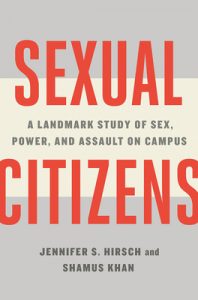 Jennifer S. Hirsch and Shamus Khan, Sexual Citizens
Jennifer S. Hirsch and Shamus Khan, Sexual Citizens
Norton, January 14
The last few years have brought a renewed public conversation around sexual assault on college campuses, involving both a reconsideration of the legal landscape around it and a debate about the language we use to enact it. In Sexual Citizens, Jennifer S. Hirsch and Shamus Khan discuss the ways that social environments can exacerbate the risk factors for assault, drawing from the Sexual Health Initiative to Foster Transformation (SHIFT) at Columbia University and stressing the roles of cultural norms and gendered power structures. Their book promises to add important insight to a complicated, often-maligned set of issues, and I’m curious to see what they have discovered. –Corinne Segal, Lit Hub Senior Editor
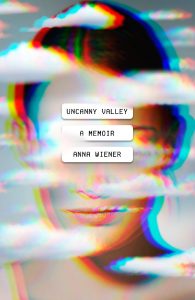 Anna Wiener, Uncanny Valley: A Memoir
Anna Wiener, Uncanny Valley: A Memoir
MCD, January 14
There are lots of memoirs about the tech industry, but Anna Wiener’s “literary-minded outsider’s insider account” does more than reveal the surreal extravagance of tech-bros in Silicon Valley. Wiener tracks her own motivations for leaving her publishing job in New York, the promises of the digital economy, and the promise of the utopian future that economy claims to want to build. Come for the unmasking of start-up culture, stay for the personal narrative of aspiration and disillusionment. –Emily Firetog, Lit Hub Deputy Editor
 Scarlett Thomas, Oligarchy
Scarlett Thomas, Oligarchy
Counterpoint, January 14
In Thomas’s latest, Tash, the 15-year-old daughter of what she has only recently discovered is a Russian oligarch lands at a minor boarding school in England, where all of the girls are obsessed with a) the legend of Princess Augusta, whose portraits coat the walls, and who may or may not have been “ravaged” by a sultan, and b) starving themselves. Tash quickly joins in, but eventually she begins to wonder if there is something more behind the institution’s reputation for anorexia. Like all of Thomas’s work, it is weird, and clever, and dark, though it’s rather smaller in scope than 2015’s The Seed Collectors. –Emily Temple, Lit Hub Senior Editor
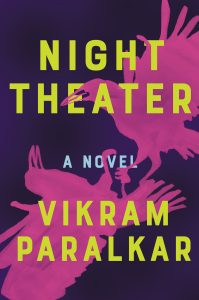 Vikram Paralkar, Night Theater
Vikram Paralkar, Night Theater
Catapult, January 14
A teacher, his pregnant wife, and their young son walk into a clinic late one night. It sounds like the start of a joke, but it’s actually the start of a wildly surreal novel, in which this family tells the surgeon that they have been killed and given a chance to come back to life, if he can mend their wounds by sunrise. (We love an ominous one-night-only challenge!) Written by an actual physician-scientist, Night Theater dredges up ethical/existential questions and a whole lot of wonder. –Katie Yee, Book Marks Assistant Editor
 Nicolette Polek, Imaginary Museums
Nicolette Polek, Imaginary Museums
Soft Skull, January 14
When an oyster gets a splinter, it produces a pearl. (Its organs create a hard shell around the foreign object.) This is what the stories in Nicolette Polek’s debut collection remind me of. It’s a world we recognize, but something is always off. In the first story, a woman carries a rope barrier with her everywhere, to separate herself from the world. In another, at the supermarket, “a group of people circle their carts around a watermelon display like a death dance.” Both halves of a couple want to go dancing, but they stay in instead for fear of dragging the other out of their comfort zone. Imaginary Museums reads like a kind of Twilight Zone, in which everyday people living their everyday lives find themselves in a prison of their own making. There’s something dark about them, but then you turn the page and find yourself laughing at her dry wit. Each story is tightly coiled, brightly polished, and they’re all a delight to discover. –Katie Yee, Book Marks Assistant Editor
 Meng Jin, Little Gods
Meng Jin, Little Gods
Custom House, January 14
When 17-year-old Liya’s mother—a brilliant physicist who kept her secrets, including the identity of Liya’s father—dies, Liya makes a pilgrimage to Beijing, where she was born, determined to find out the truth of both her mother’s life and her own. An ambitious and artful debut. –Emily Temple, Lit Hub Senior Editor
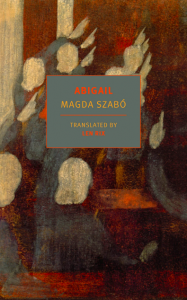 Magda Szabó, tr. Len Rix, Abigail
Magda Szabó, tr. Len Rix, Abigail
NYRB, January 21
In 2015, I became obsessed with Hungarian novelist Magda Szabó’s elusive, elevated novel The Door—read if you have not, I beg you!—and so the prospect of a newly translated work, especially one that is apparently the favorite of Szabó’s countrymen, and also especially one about a rebellious teenager who is sent to a horrid boarding school (this is very much my jam, guys) gives me the purest thrill of anticipation. –Emily Temple, Lit Hub Senior Editor
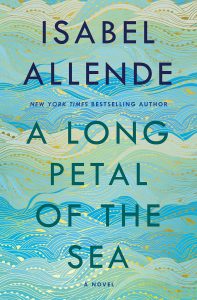 Isabel Allende, A Long Petal of the Sea
Isabel Allende, A Long Petal of the Sea
Ballantine, January 21
For decades, fascism, displacement, mass exile, and the looming threat of war have not felt so universally salient as they do now. Isabel Allende returns with an epic novel, A Long Petal of the Sea, that charts these themes, following a young widow, Roser, and an army medic, Victor Dalmau, who flee to Chile after Franco and his fascist party come to power in Spain. Roser and Victor’s new lives do not mark the end of their troubles, however, as the specter of European warfare continues to hound them. The exiles hold onto their dream of returning home, but where is that now in the wake of such widespread desolation? –Aaron Robertson, Lit Hub Assistant Editor
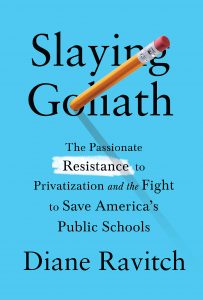 Diane Ravitch, Slaying Goliath
Diane Ravitch, Slaying Goliath
Knopf, January 21
Diane Ravitch’s latest book opens with an eye-popping quote. “If a foreign country had inflicted upon our public education system what Ed Reform plutocrats and their toadying political sycophants have imposed upon it,” this anonymous source says, “we would have considered it an act of war.” Is this an exaggeration? Slaying Goliath reminds us that it is not, as Ravitch, a former US assistant secretary of education under George H. W. Bush, quickly lays bare the four decade-long fight to unplug, defund, and ultimately make money off one of the biggest non-businesses in American life: educating our young.
In Reign of Error, Ravitch reminded us that this movement began as a way to break the teacher’s union, that it has been funded by a handful of multimillionaires and billionaires, including the Walmart family, Mayor Mike Bloomberg—yes, that one—and our current secretary of education. Most of the premises they beat public school with are false. Even if you believe, as many educators do not, that test score matrixes are a valid way to measure education, there is no evidence privatized schooling improves test scores. Instead it has been proven to increase segregation, impoverishment of public schools, and can lead to corruption.
The good news is that a decade on, Betsy Devos’s appointment aside, there are some victories to celebrate, Slaying Goliath dedicates most of its pages to drawing attention to the many forces that have amassed in defense of public schooling, from the teachers and activists who defeated the outrageously well-founded Question 2 in Massachusetts, to the NAACP’s leadership role in standing against the expansion of charter schools. Ravitch argues powerfully for other activists to follow suit, keep their message simple, and remind voters of the importance of an educated populace. The fight continues, but Slaying Goliath ought to be required reading for any educator today who still has to deal with the teacher-demeaning logic which a small, rich lobby has been pumping into our public space. –John Freeman, Lit Hub Executive Editor
 Jeanine Cummins, American Dirt
Jeanine Cummins, American Dirt
Flatiron, January 21
“This book is not simply the great American novel,” Sandra Cisneros wrote of this story of a woman and her child fleeing the violence of their Mexico town for the northern border, “it’s the great novel of las Americas. It’s the great world novel! This is the international story of our times. Masterful.” –Emily Temple, Lit Hub Senior Editor
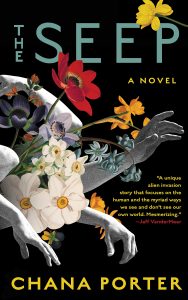 Chana Porter, The Seep
Chana Porter, The Seep
Soho Press, January 21
Speculative fiction rarely depicts alien invasions as benevolent, but Chana Porter’s delicious first novel, The Seep, does just that. Bodiless, multi-dimensional aliens—“the Seep”—have communed with humanity, helping our poor, flesh-anchored souls to see that life and meaning extend beyond the corporeal, are rooted in the interconnectedness of everything. Whatever humans can imagine is now possible, including the complete avoidance of pain, regret, and despair. The only problem? Those are exactly the things that make us human. The Seep is a glorious interrogation of human feelings and relationships and how they shape who we are. –Amy Brady, Lit Hub contributor
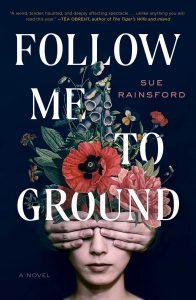 Sue Rainsford, Follow Me to Ground
Sue Rainsford, Follow Me to Ground
Scribner, January 21
How’s this for a premise: Ada and her father possess the power to heal human illness by temporarily burying bodies in the mystical healing Ground, near their home at the edge of a village. Locals come to them for help. There’s a good, careful system. Then one day, Ada meets Samson, and their affair threatens to disrupt everything. Sue Rainsford’s beautiful debut novel works its own kind of magic. This wildly inventive story reads like a centuries’ old myth you can’t believe you’ve never heard before, and her prose will hold you captive like a spider’s thread. –Katie Yee, Book Marks Assistant Editor
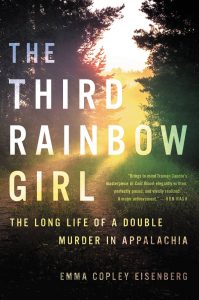 Emma Copley Eisenberg, The Third Rainbow Girl
Emma Copley Eisenberg, The Third Rainbow Girl
Hachette, January 21
Two young women, Vicki Durian, 26, and Nancy Santomero, 19, were murdered on June 25, 1980 in Pocahontas County, West Virginia. Three girls were on their way to a gathering called the Rainbow Festival, and two were murdered en route. What happened to the third? Emma Copley Eisenberg was living in West Virginia when she first came across the story of the murders, and her time spent in the state helps get the texture and nuance right. The result is dazzling. –Lisa Levy, CrimeReads Contributing Editor
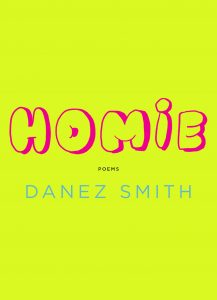 Danez Smith, Homie
Danez Smith, Homie
Graywolf, January 21
I remember beginning Danez Smith’s breakout 2017 collection Don’t Call Us Dead on the subway on the way home from work—and then getting to my stop and not being able to put the book away. I read it while walking from the station to my apartment, and I read it while climbing the stairs, and I finished it in the hallway, with my coat still on. So . . . it’s good. Which means I’m obviously looking forward to Smith’s next volume, which is officially titled Homie and which the publisher describes as “part friendship diary, part bright elegy, part war cry.” –Emily Temple, Lit Hub Senior Editor
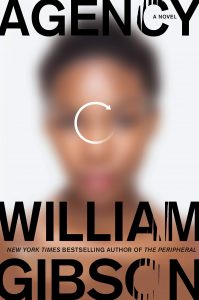 William Gibson, Agency
William Gibson, Agency
Berkley, January 21
In William Gibson’s follow-up to The Peripheral, the inventor of cyberpunk has a harrowing new tale of apps gone awry. In the present day, an app-whisperer works to design a personal assistant with some surprising combat skills. 100 years in the future, powerful figures attempt to change the path of history, and perhaps avert an apocalypse. –Molly Odintz, CrimeRead Associate Editor
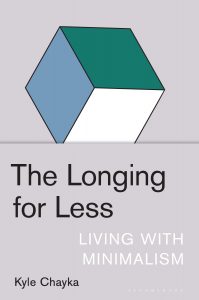 Kyle Chayka, The Longing for Less: Living with Minimalism
Kyle Chayka, The Longing for Less: Living with Minimalism
Bloomsbury, January 21
The last few years have seen the proliferation of a number of new products and services aimed at promoting a certain image of “minimalism,” from mid-century furniture to digital detox. The word has become a catchall for any product or idea that promises to simplify or ease our lives, but, in the process, mostly encourages us to accumulate more stuff. In The Longing for Less, Kyle Chayka draws on his experience as a cultural critic to look past this consumerist ethos at the philosophers, artists, and writers who pioneered the concepts underlying minimalism, from Jun’ichirō Tanizaki to Donald Judd and John Cage, as well as the ways their ideas surround us in our everyday lives. –Corinne Segal, Lit Hub Senior Editor
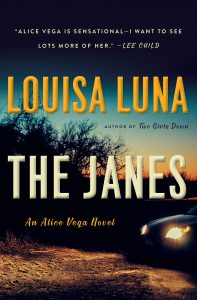
Louisa Luna, The Janes
Doubleday, January 21
Luna’s compelling PI Alex Vega and her partner Max Caplan return, and this time, they’re investigating the murders of two young women. The case takes them into the shadowy world of human trafficking and the sex trade, as the two work to not only find the murderer but also do what they can to restore humanity to the victims. Luna’s thrilling novels have established her as a powerful up-and-coming voice in the genre, and we can’t wait to see what she does next. –Molly Odintz, CrimeReads Associate Editor
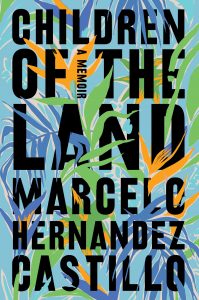 Marcelo Hernandez Castillo, Children of the Land
Marcelo Hernandez Castillo, Children of the Land
Harper, January 28
I’ve followed Marcelo Hernandez Castillo’s work as a poet for years, including on the Undocupoets Campaign, where he worked with co-founders Javier Zamora and Christopher Soto to eliminate citizenship requirements from poetry book prizes. Children of the Land is his story of migration from Mexico in 1993 and everything that followed as his family was subject to the violence and dehumanization of the US immigration system. The book also addresses Castillo’s changing relationship with language as he progresses through his education, eventually enrolling in an MFA program at the University of Michigan. It’s a moving, gripping testament to the ways in which US immigration policy fractures lives. –Corinne Segal, Lit Hub Senior Editor
 Rashid Khalidi, The Hundred Years’ War on Palestine
Rashid Khalidi, The Hundred Years’ War on Palestine
Metropolitan Books, January 28
Focusing on six declarations of war, this book tells a century’s history of colonialism from a Palestinian perspective that is often erased from academic and Western political discourse. Khalidi draws on familial archives, from documentation of his great-great-uncle and former mayor of Jerusalem, Yusuf Diya al-Khalidi, which debunks several colonial myths imposed on pre-Balfour Palestine, to stories Khalidi’s father revealed to him just months before passing. This book is a masterful work of scholarship and personal history excavating unlike any I’ve seen before; this will become a major force in the Palestinian historical cannon in the years to come. –George Abraham, Lit Hub contributor
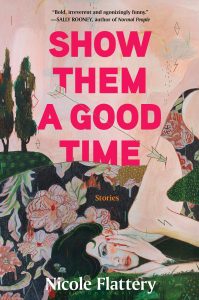 Nicole Flattery, Show Them a Good Time
Nicole Flattery, Show Them a Good Time
Bloomsbury, January 28
Flattery is a rising star back in the UK and Ireland (where she already has a heap of awards to her name), and with very good reason. Her debut collection is a magnificently mordant work, full of delicious one-liners, perennially creeping menace, and hypnotically nihilistic depictions of cold-eyed young women trapped in strange, lonely, sometimes dystopian situations, often surrounded by predatory or unhinged older men. In one story, “Hump,” an office worker develops a hunchback after her father’s death. In another, “Abortion: A Love Story,” two female college students join together to tell their stories in the format of a play. Reminiscent of the writing of Mary Gaitskill, Lorrie Moore, and Ottessa Moshfegh, Show Them a Good Time is a deft and dazzling work of pitch-black humor and deep, disquieting sorrow. –Dan Sheehan, Book Marks Editor
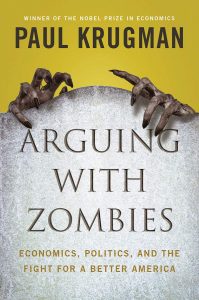 Paul Krugman, Arguing with Zombies
Paul Krugman, Arguing with Zombies
Norton, January 28
We are living in a time of zombie ideas, Paul Krugman has been arguing. Ideas that should have died long ago when hit by evidence—trickle-down tax breaks, the madman syndrome of leadership—but have refused to go away. What have they wrought? This collection of Krugman’s pieces for the New York Times takes readers on a tour of that world. From the road to Obamacare to its long (and ongoing) pushback, to the election of Donald Trump and the “revelation” that he would leave the American worker behind, it’s not a pretty picture. In short it’s become a time against truth.
What a ghoulish assortment of villains who emerge in its pages, from Trump to McConnell to Paul Ryan—remember him!—and others. Krugman might be a Nobel Prize winning economist, but he is plugged in to Washington power and reminds us where our politicians call from and who they heed. Kavanaugh isn’t just unfit to be a judge, for example, Krugman reminds, he’s also an anti-worker extremist. Kavanaugh even decided a worker killed by a whale at Seaworld should have known better, and that Seaworld was’t liable for her death. In a time when keeping oneself educated against the tsunami of lies pouring out of Washington can feel like a full-time job, this collection is far more than a hunk of old journalism, it is a lamp in a storm. –John Freeman, Lit Hub Executive Editor
 Jessica Stern, My War Criminal
Jessica Stern, My War Criminal
Ecco, January 28
History never really ended and its sitting in a prison cell in The Hague. Radovan Karadzic, the “charming” poet-psychiatrist and leading voice of genocidal Serbian nationalism, will spend the rest of his life locked up for his role in the Bosnian War, and the subsequent massacre of 8,000 Bosniaks, mainly men and boys, at Srbrenica in July 1995. For a two-year period between October 2014 and November 2016 Karadzic was visited by terrorism expert Jessica Stern, who sought, as we must, to understand the psychology of genocide: its motivations, its acts, its perennial surfacing among so-called civilized society. What followed was a series of interviews that form the backbone of this chilling account of how quickly societal order can collapse, particularly when given just the right push from intelligent, charismatic men. –Jonny Diamond, Lit Hub Editor in Chief
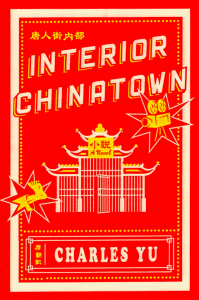 Charles Yu, Interior Chinatown
Charles Yu, Interior Chinatown
Pantheon, January 28
I think about the first story in Charles Yu’s 2012 collection Sorry Please Thank You, “Standard Loneliness Package,” about once a week. I won’t describe it (you can read it here) but it has never quite left my mind, and as a result, I am always here for new work from Yu. His latest novel, Interior Chinatown, is a metafictional send-up of Asian American tropes, and it sounds perfectly odd and funny and deep, like the rest of his writing. Can’t wait for another story to mull over until the end of time. –Emily Temple, Lit Hub Senior Editor
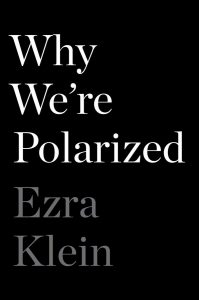 Ezra Klein, Why We’re Polarized
Ezra Klein, Why We’re Polarized
Avid Reader, January 28
Ezra Klein is a born explainer. In his podcast (Impeachment, Explained) and many television appearances, Klein has the energized, sleeves-rolled up demeanor of a person holding important information. He often does, and lately that information concerns the ways that loopholes and outright misinterpretation can be used to subvert the democratic process. In his first book, Klein takes a step back from the current mayhem to ask, how did we get so far gone that a mainstream political party could resort to such tools? To essentially shutting down government to control it? Why We’re Polarized tells this story, and while it does not go as far back as Michael Tomasky’s fantastic If We Can Keep It—Why We’re Polarized focuses on the Goldwater election and its aftermath—Klein’s book is more up to date. It is also more hopeful. Demagoguery on par with Trump is a sign that the Republican party has been losing power and its hold over American people, Klein impressively argues. A few key changes, after a very important election—such as giving Washington DC and Puerto Rico statehood, overhauling the electoral college—would restore people to the equation, diffusing the partisan based polarization. Let’s hope the explainer can become a predictor. –John Freeman, Lit Hub Executive Editor
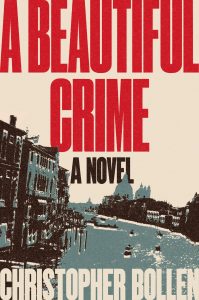 Christopher Bollen, A Beautiful Crime
Christopher Bollen, A Beautiful Crime
Harper, January 28
The first chapter of this novel gave me major Tom Ripley vibes—which is about as high a compliment as I can pay to a crime novel. But while Bollen’s latest is as sumptuous and fraught as Highsmith’s classic, it’s a satisfyingly updated version (the thieves are a gay couple, one white, one black, in a well-rendered contemporary Venice), and full of delights all its own. –Emily Temple, Lit Hub Senior Editor
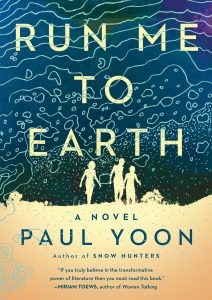 Paul Yoon, Run Me to Earth
Paul Yoon, Run Me to Earth
Simon & Schuster, January 28
This new novel by Young Lions Fiction Award winner Paul Yoon (Snow Hunters, The Mountain) is the story of Alisak, Prany, and Noi—three orphan teenagers trying to survive in a war-ravaged, and unexploded ordinance-littered, Laos in 1969. After seeking shelter in a bombed-out field hospital, the trio become medical couriers for an impassioned French doctor who eventually secures them safe passage out of the country. What follows is a decades-spanning journey of horror and hope, as Yoon tenderly traces the divergent paths of these four wounded souls, still haunted by their past but determined to persevere. –Dan Sheehan, Book Marks Editor
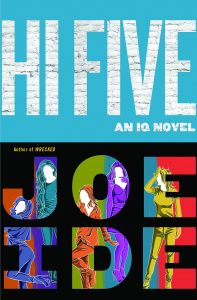 Joe Ide, Hi Five
Joe Ide, Hi Five
Mulholland, January 28
Ide is one of the rising stars of crime fiction, and he’s back this month with the fourth installment in his celebrated IQ series, which follows the investigations and adventures of a young, community-spirited, crime-solving man nicknamed IQ, born, raised, and operating out of South Central L.A. In Ide’s latest, IQ gets dragged into a case by a local arms trafficker and heads to new terrain to solve a murder in toney Newport Beach. The twist this time around is the key person-of-interest has multiple personalities, each one with a different story. –Dwyer Murphy, CrimeReads Managing Editor
FEBRUARY
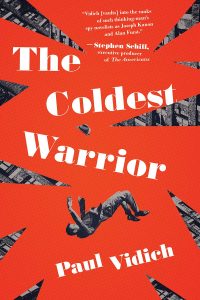 Paul Vidich, The Coldest Warrior
Paul Vidich, The Coldest Warrior
Pegasus, February 4
The title does double duty here—Vidich’s latest is about a cold case investigation during the Cold War, split between the 1950s and the 1970s. In 1953, a CIA scientist’s death from falling is quietly labeled as suicide; two decades later, a friend of the family reopens the case after learning that his old comrade’s demise may have been linked to experiments in psychedelic drugs. A richly detailed work of investigative crime writing perfect for fans of procedurals and spy fiction alike. –Molly Odintz, CrimeReads Associate Editor
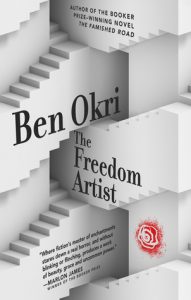 Ben Okri, The Freedom Artist
Ben Okri, The Freedom Artist
Akashic, February 4
The latest novel from the Booker Prize-winning author of The Famished Road has already been out in the UK for a year; I have no idea why we’ve had to wait so long to read it stateside. The Freedom Artist is a fable-like allegory set in a dystopian future in which the “Hierarchy” is dominant, the citizens trapped and muted, except sometimes when they are heard screaming in their sleep. It is through this world that Karnak must travel to find his lover, who has been arrested for asking the question: “Who is the prisoner?” –Emily Temple, Lit Hub Senior Editor
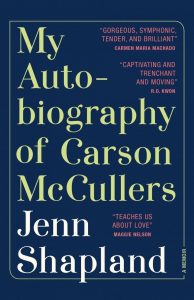 Jenn Shapland, My Autobiography of Carson McCullers
Jenn Shapland, My Autobiography of Carson McCullers
Tin House, February 4
I used to work with Jenn Shapland as a bookseller back in Austin, where we both interned at the Harry Ransom Center, one of the nation’s best literary archives, at different points in our academic lives. Her debut is a beautifully written and hard-to-categorize meditation on Carson McCullers and the hidden literary history of queer women, inspired by Shapland’s work cataloguing McCullers’ personal effects at the Ransom Center, then later discovering transcripts from McCullers’ therapy sessions at a different archive that gave voice to the desires that remained subtext in most non-fiction treatments of McCullers’ work. Already earning blurbs from the like of Maggie Nelson, this one is not to be missed! –Molly Odintz, CrimeReads Associate Editor
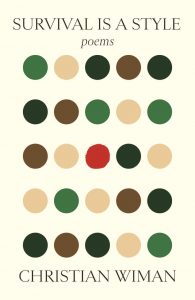 Christian Wiman, Survival is a Style
Christian Wiman, Survival is a Style
FSG, February 4
Christian Wiman has for a long time been the poetry world’s navy blue jacket with a surprisingly silk lining. Survival is a Style turns these modes inside out, embracing vibrancy as a way of being, and somber formality as, well, a formality to be deployed. The wisdom of experience, which he bore with great dignity in his work of the past decade, across memoirs and poems that probed faith and mortality, is now simply inhabited. Here are poems of exuberant observation and a hard won freedom. In some cases, even of the liberty to be silly. One tiny miracle of this new work is that Wiman does not simply report from this newly reached territory: he makes the best parts of it ours, transferring the sound, the gladness, the awareness of how temporal all of it is, right into our bodies. –John Freeman, Lit Hub Executive Editor
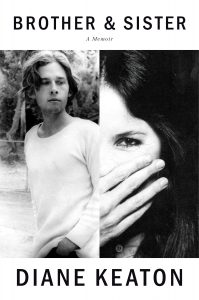 Diane Keaton, Brother & Sister
Diane Keaton, Brother & Sister
Knopf, February 4
If you’ve been following Diane Keaton’s life on screen—if you loved her in The Godfather and Annie Hall and Something’s Gotta Give and the severely underrated Morning Glory—you might be curious about her life off of it. Enter: Brother & Sister, her new memoir about her complicated, winding relationship with her younger brother. As children, they were thick as thieves. As adults, their paths diverged. Not only is this a deeply personal portrait of Diane Keaton’s family, but it’s also a beautiful look at the bonds and barriers of siblinghood. –Katie Yee, Book Marks Assistant Editor
 Sarah Gailey, Upright Women Wanted
Sarah Gailey, Upright Women Wanted
Tor, February 4
Sarah Gailey impressed us all with their debut Magic for Liars, a queer romance meets murder mystery investigation set inside a magic school, and their followup promises to be just as genre-bending. In Upright Women Wanted, Gailey creates a neo-Western adventure set in the near future, in which gunslinger librarians fight post-apocalyptic fascists, which sounds both politically responsible and incredibly fun. –Molly Odintz, CrimeReads Associate Editor
 Judith Butler, The Force of Non-Violence
Judith Butler, The Force of Non-Violence
Verso, February 4
Considering the rise of punching-a-fascist videos, it may not appear to be the best timing for a book on nonviolence. Unless, of course, you are the University of California theorist Judith Butler, who has made a profound contribution to the theory of nonviolence in this short new book. It is precisely when violence seems most obvious, Butler argues, that we need to imagine an alternative. If only because, for Butler, nonviolence is “a sustained commitment, even a way of rerouting aggression for the purposes of affirming ideals of equality and freedom.” There are no breaks, in that sense, Butler argues, in the position, no loopholes, because for nonviolence to be coherent it must undertake a utopian view that all lives are equally valuable, that they are, to use her word, worthy of grief. Following Butler as she works piece by piece through her argument, prizing aggression apart from violence, fantasy (conscious dreaming) from phantasy (uncontrolled) is nothing short of dazzling. There is a contradiction at the heart of her logic too that she explores in great depth. That for us to live in a state of nonviolence we need to also dismantle individualism. For there we learn the notion of self-value over others. It is heartening in dark times to see a philosopher of this calibre using the light of her sharp mind to see a way toward pacifism. –John Freeman, Lit Hub Executive Editor
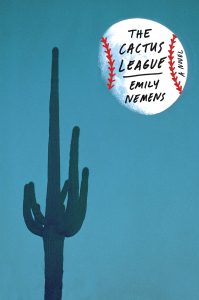 Emily Nemens, The Cactus League
Emily Nemens, The Cactus League
FSG, February 4
Baseball has always been America’s most literary of sports, its regal (some would say glacial) pace an ideal stage for intimate human drama: dizzying highs, bathetic lows, extreme close-ups, all in nine innings. So I’m pretty excited to see what Paris Review editor Emily Nemens does against the backdrop of major league spring training in the Arizona desert. I’ve long been a fan of Nemens’ short fiction, and everything about this debut novel—a golden boy on the edge, old-timers trying to stay relevant, a sportscaster narrator—has it at the top of my TBR pile. –Jonny Diamond, Lit Hub Editor in Chief
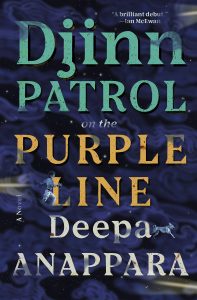 Deepa Anappara, Djinn Patrol on the Purple Line
Deepa Anappara, Djinn Patrol on the Purple Line
Random House, February 4
Debut novelist and journalist Deepa Anappara’s Djinn Patrol on the Purple Line is one of the more anticipated books of 2020, having been hailed by authors like Ian McEwan, Anne Enright, and Chigozie Obioma. Set in a Delhi shantytown, Djinn Patrol is loosely inspired by a series of real-life child disappearances that happened throughout urban areas in India. When a young classmate goes missing, nine-year-old Jai, a fan of reality detective shows, and his friends Pari and Faiz decide to use the lessons they’ve learned from TV to find their friend. But more and more children continue to disappear. An apathetic police force (and rumors of a demonic djinn) compound the children’s problems, and what begins as an innocent search evolves into something much darker. –Aaron Robertson, Lit Hub Assistant Editor
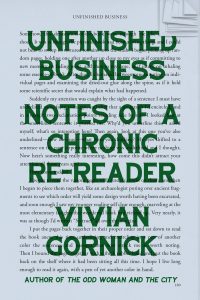 Vivian Gornick, Unfinished Business
Vivian Gornick, Unfinished Business
FSG, February 4
It has been Vivian Gornick’s position that the work of self-analysis is never complete. Some might find in this endlessness a horror; Gornick has made of it a strength, turning her search to understand herself, in books like The Odd Woman in the City, and Approaching Eye Level, into a sound unlike any other in American life writing. Gornick’s prose is warm where others are ashamed, open-ended where others slam shut doors and scold, funny when so many take themselves too seriously. Gornick brings all these sounds to the work of reading, too, which she views with the same infinite loop. “It has often been my experience that re-reading a book that was important to me at earlier times in my life is something like lying on the analyst’s couch,” she writes in the opening of her latest book, Unfinished Business, a meditation on rereading. These new essays, drawing from errands of introduction and anniversaries of convenience, return to authors she has read before and sees them anew: D.H. Lawrence, Marguerite Duras, Colette, Elizabeth Bowen, A.B. Yeshuoa and others appear in the lamplight of her attention and are regarded with fondness and, in some cases, intriguing autobiographical lacunae. No light entertainments in the bunch. “I’d grown up in a noisy left-wing household where Karl Marx and the international working class were articles of faith,” Gornick reminds, at one point, “feeling strongly about social injustice was a given.” For more on that, pick up Gornick’s The Romance of American Communism, which is being reissued in February by Verso. It contains a miniature political biography of Gornick’s family at a time when communism, in America, was on its death throws, and her part of the Bronx still spoke Yiddish. Meanwhile, if you need to be reminded of the lifelong luxuriance of reading, it’s hard to imagine another book in 2020 will come even close to Gornick’s Unfinished Business. –John Freeman, Lit Hub Executive Editor
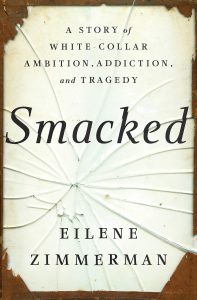 Eilene Zimmerman, Smacked
Eilene Zimmerman, Smacked
Random House, February 4
Addiction narratives come in many shapes and sizes and we need to pay attention to all of them—America remains in the grip of a corporate greed-induced opiate epidemic that does not recognize lines of class or race. For journalist Eilene Zimmerman, the story she unravels is a deeply personal one as she tries to understand the secret addictions of her ex-husband, a highly successful workaholic who loses his life to an ever-intensifying series of reliance on pills, cocaine, methamphetamine, and opioids. But Zimmerman goes a step further in her reporting to reveal a professional world of high-achieving personalities who’re more often than not vulnerable to the temptations of addiction. –Jonny Diamond, Lit Hub Editor in Chief
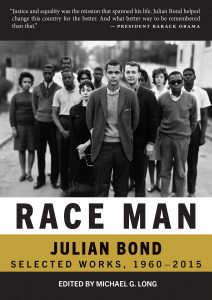 Julian Bond, Race Man: Selected Works, 1960-2015
Julian Bond, Race Man: Selected Works, 1960-2015
City Lights, February 4
When he died in 2015 at age 75, Julian Bond had spent nearly 60 years promoting his race. He was a race man in the old fashioned sense of the word, in the way Thurgood Marshall was a race man. As Bond himself put it simply in his only book, the 1972 A Time to Speak, a Time to Act. “Most of my life has been colored by race, so much of my thinking focuses on race.” As an activist, one of Bond’s extraordinary qualities is how broadly he interpreted this act of thinking, how many ethical dilemmas rolled into it. How unstinting was his commitment to nonviolence. This meant, for him, joining hands with LBGTQ activists, advocating for fair and equally funded education, it meant protesting the apartheid regime in South Africa. It meant expanding the notion of what it means to be violent. “Violence is black children going to school for 12 years and receiving 5 years of education,” he writes. This book, assembled from talks and essays, op-eds and other literary interventions, is an inspiring example of how broad and many-sided a life spent advocating for black liberation could be in the 1960s, 1970s and on to our day. Bond was well aware of the Second Reconstruction being recreated in America, and the legal push to undo all of Johnson’s civil rights legislation. He would have despaired at Trump’s election and the way the courts are being packed with fellow travelers, chipping away at civil rights protections. Handing victory after victory to people on the side of the powerful and greedy. He also would have found ways to organize. This enormous-hearted, unflinching book gives readers a vision of how that can be done. –John Freeman, Lit Hub Executive Editor
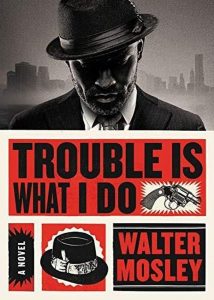 Walter Mosley, Trouble is What I Do
Walter Mosley, Trouble is What I Do
Mulholland, February 4
While Mosley is best known for his Easy Rawlins series, I’ve always been partial to his Leonid McGill series, featuring a morally ambiguous protagonist who protects his family before all else, even as the various members of his extended clan drive him to distraction. Leonid’s new task is irresistible: he’s to inform a prominent white family of their many black relatives, upon the request of an elderly Mississippi bluesman. –Molly Odintz, CrimeReads Associate Editor
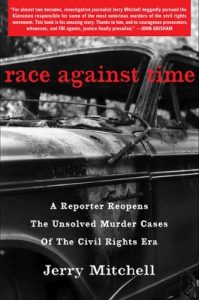 Jerry Mitchell, Race Against Time
Jerry Mitchell, Race Against Time
Simon and Schuster, February 4
It was an open secret, the guilt of those involved in the infamous 1964 murder of three civil rights activists in Mississippi, and yet no murder charges were brought in the wake of the terrible crime. It took 41 years and the tireless work of investigative reporter Jerry Mitchell to finally see the plotters of the Mississippi Burning case face justice, a story revealed one dramatic episode at a time, as Mitchell unearths documents and meets with the very men he’s trying to catch. I wouldn’t be surprised if this shows up on the big screen very soon. –Jonny Diamond, Lit Hub Editor in Chief
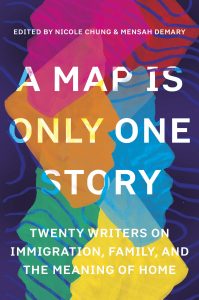 Nicole Chung and Mensah Demary, eds., A Map is Only One Story
Nicole Chung and Mensah Demary, eds., A Map is Only One Story
Catapult, February 4
At Catapult, Nicole Chung and Mensah Demary have worked to publish voices from all over the world on the human geography that defies political borders and how immigration policy takes shape in the everyday lives of individuals. A Map is Only One Story draws from that work, presenting pieces from 20 writers that weave reporting with personal stories of immigration and identity. The collection includes work by a number of writers I’ve read and loved before, including Victoria Blanco, Nur Nasreen Ibrahim, and Porochista Khakpour, along with others who have brought sustained attention to these issues, and I’m excited to see what they all do next. –Corinne Segal, Lit Hub Senior Editor
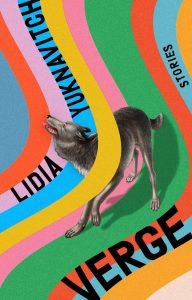 Lidia Yuknavitch, Verge: Stories
Lidia Yuknavitch, Verge: Stories
Riverhead, February 4
In her latest collection of short stories, Lidia Yuknavitch addresses the themes that most interest her, that exist on the verge—as her title says—or on the boundaries between sex and trauma, art and violence. Verge is full of suspense, directed with empathy at describing the psychology of the marginalized. An eight-year-old becomes an underground courier of frozen organs across Eastern Europe; a janitor takes trash and assembles it into a miniature city, a creation which ultimately frightens him. Young or old, male or female, the characters in Verge will shock and impress themselves onto the reader. Yuknavitch has after all been called a “galvanizing” voice in American fiction. –Eleni Theodoropoulos, Lit Hub Editorial Fellow
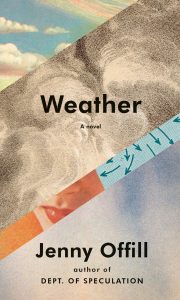 Jenny Offill, Weather
Jenny Offill, Weather
Knopf, February 11
Like Offill’s breakout novel Dept. of Speculation, Weather is slim and elliptical and brimming with intelligence—the kind of book that taps directly into the psyche of a certain kind of reader (and worrier, and parent, and artist). But more than anything, it feels as you read like a mirror held up to the anxieties of the modern moment, that constant mix of global (what will become of our planet, our children, how can we protect either one), massive (how it feels to have elected this president) and personal (what do you do when your brother has a child, and then when his life implodes?). The novel is peppered with wry jokes, invented or borrowed, and it’s hard not to read them as nervous coping mechanisms, like the urge to make a joke after a tragedy. Weather will go down as one of the first great novels to engage directly with climate change and our collective anxiety and denial thereof; I have a hunch many novelists will be following Offill’s lead. –Emily Temple, Lit Hub Senior Editor
 Mark Bibbins, 13th Balloon
Mark Bibbins, 13th Balloon
Copper Canyon, February 11
The day after Mark Bibbins’ friend and ex-lover’s Mark Crast died of AIDS in 1993, 600 balloons were released from Washington Park Lake in Albany to raise money and call attention to people living with the disease. 12 balloons had been sponsored in Crast’s name, but not one for him, hence the title of this fierce, pure, harrowing book length poem, which returns to that time in a series of lyric addresses mostly to the departed. Retelling the story of their love affair, or those terrifying times, of love and desire before the disease and after, and of the strange acoustics danger gives to everyday actions. Bibbins is an agile and knowing poet; a rippling and polished armor coats even his most intimate poems. Who else has absorbed John Ashbery’s lessons as well as he? Here, however, all of that protection has been undressed. The stark, unfussy lines with their steep enjambments make 13th Balloon feel like something rescued from time. If only, one imagines, it could have the safe remove of a relic. But it doesn’t, the book is as raw and shocking as the events it describes must have felt, nearly 30 years ago. The list of exceptional books wrenched from the mouth of the plague is deep, but Bibbins has just added another essential one to it. –John Freeman, Lit Hub Executive Editor
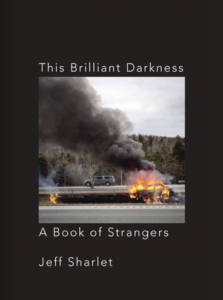 Jeff Sharlet, This Brilliant Darkness
Jeff Sharlet, This Brilliant Darkness
W. W. Norton, February 11
In between his father’s heart attack and his own two years later, Jeff Sharlet collected stories and experiences of those on the outskirts of life—Charley Keunang, a once-aspiring actor shot by the police on LA’s Skid Row; the gay pride amidst the homophobia of Putin’s Russia; homeless teen addicts in Dublin; a lonely woman with dementia whose only friend was a houseplant. This Brilliant Darkness thins the line between author, subject, and reader to ask: how do people live with suffering? –Emily Firetog, Lit Hub Deputy Editor
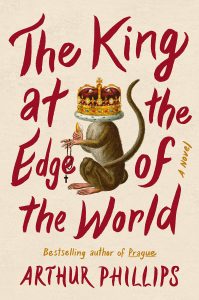 Arthur Phillips, The King at the Edge of the World
Arthur Phillips, The King at the Edge of the World
Random House, February 11
Arthur Phillips is a writer you can’t pigeonhole. Each of his books is quite different, which makes for exciting reading—though he does apparently have a yen for history, as is borne out in his latest. The King at the Edge of the World is set in 1601 as Queen Elizabeth is dying and her agents are trying to figure out if her likely successor, King James VI of Scotland, is secretly a Catholic—and using a physician, maybe “the only Muslim in England” to do so. –Emily Temple, Lit Hub Senior Editor
 Edward Hirsch, Stranger By Night
Edward Hirsch, Stranger By Night
Knopf, February 11
Edward Hirsch’s poetry is deeply felt but not sentimental, accessible but not simplistic. In Stranger By Night, his tenth collection, Hirsch reflects on his life as his vision begins to fail. It strikes me as the perfect book for a moment in which we’re recognizing the importance of doing less—a kind of slow reading. –Jessie Gaynor, Social Media Editor
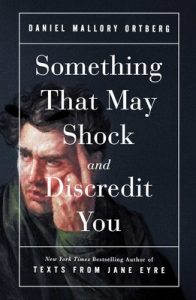 Daniel Lavery, Something That May Shock and Discredit You
Daniel Lavery, Something That May Shock and Discredit You
Atria, February 11
From the author of Texts from Jane Eyre—and one of the few people who can make looking at the internet all the time feel worthwhile—comes a hilarious essay collection that picks apart pop culture as we know it. Can’t wait? You can read an excerpt here. –Emily Temple, Lit Hub Senior Editor
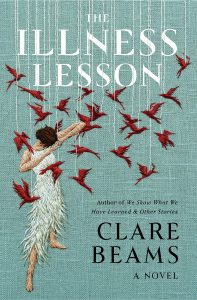 Clare Beams, The Illness Lesson
Clare Beams, The Illness Lesson
Doubleday, February 11
Samuel Hood and his daughter Caroline found a school in 19th-century New England, promising a groundbreaking education for young women. But when a flock of red birds descends on the town, the students begin to get sick—rashes, seizures, headaches, verbal tics, night wanderings. Samuel brings in a doctor who dictates the girls’ experience, and Caroline must choose to defy not only her father but all the men around in her order to save the girls, and herself. –Emily Firetog, Lit Hub Deputy Editor
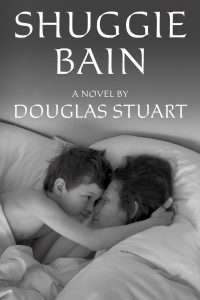 Douglas Stuart, Shuggie Bain
Douglas Stuart, Shuggie Bain
Grove, February 11
This heartfelt and harrowing debut novel—which has been compared to the work of Édouard Louis, Frank McCourt, and Hanya Yanagihara, and which Kirkus has already called “a masterpiece”—from Scottish fashion designer Stuart details the relationship between a sweet young boy and his beautiful, alcoholic mother. Set in 1980s Glasgow—a city ravaged by poverty, drug addiction, and unemployment during the Thatcher years—the book, which unfolds over the course of a decade in a series of vignettes that give a window into the emotional lives of each member of the Bain family, is rightly being heralded for its visceral, emotionally nuanced portrayal of working class Scottish life and its blazingly intimate exploration of a mother-son relationship. –Dan Sheehan, Book Marks Editor
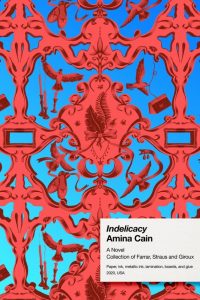 Amina Cain, Indelicacy
Amina Cain, Indelicacy
FSG, February 11
In what Blake Butler described as “a strangely ageless world somewhere between Emily Dickinson and David Lynch” (count me already sold on this novel, to be honest), a cleaning woman at an unnamed art museum in an unnamed city dreams of a life of ease, where she’s free to do nothing but write about art—until she gets it, courtesy of a wealthy husband, and it turns out to be not exactly what she imagined. Patty Yumi Cottrell described it as “an exquisite jewel box of a novel with the passion and vitality found only in rare and necessary works such as The Hour of the Star and The Days of Abandonment. Through this timeless examination of solitude, art, and friendship Amina Cain announces herself as one of the most intriguing contemporary writers of our time.” –Emily Temple, Lit Hub Senior Editor
 Mi-ae Seo, The Only Child
Mi-ae Seo, The Only Child
Ecco, February 11
While much of crime fiction features a parade of children in danger, what about those novels featuring children who are the danger? For those looking to be terrified by sociopathic youths, or those just looking for an all-around nailbiter of a thriller, we recommend The Only Child, in which a behavioral psychologist who studies serial killers becomes the caretaker of a very, very, creepy little girl. –Molly Odnitz, CrimeReads Associate Editor
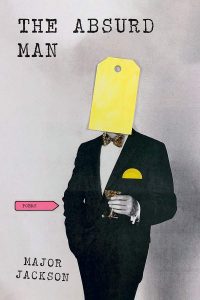 Major Jackson, The Absurd Man
Major Jackson, The Absurd Man
Norton, February 11
Major Jackson’s fifth collection borrows Camus’s figure of the absurd man, searching for meaning in a meaningless world, and reinvents him in the today’s times, sending him on a journey from China to the poet’s own Philadelphia. No American poet wears his genius as lightly as Jackson, whose poems here reach new heights of companionable style. From a simple winter’s day to moving across a city, observing, Jackson writes with the eye of a photorealistic, revealing that even in meaningless, the sights and sounds of the world can be reward enough in a life tilting toward madness. –John Freeman, Lit Hub Executive Editor
 N. Scott Momaday, The Death of Sitting Bear: New and Selected Poems
N. Scott Momaday, The Death of Sitting Bear: New and Selected Poems
Harper, February 12
Although best known for House of Dawn, which won a Pulitzer Prize 50 years ago last year, making him the first Native American to be awarded one, Kiowa writer N. Scott Momaday has always been a poet. “When I was a boy,” he writes in the introduction of these selected poems, “walking in the pristine sunshine and seeing the bright land rolling away to the horizon, the seed of poetry was invested in me.” So much of Momaday’s poetry moves like this statement. As in landscape paintings, the land is active and colored like light. There’s a miniaturization at work on the human. And reading the poems feels like moving through an active space. “On the frosted field,” goes one, “the tracks of many children / crisscross in the noon.” The poem “Linguist” explains, perhaps, how such a stillness is achieved. “First the language of love, / Then that of fear, then that of solitude.” There’s so much space around these poems, Momaday’s elegant discretion allows who decades to pour through them. He is a master of making the immense force of the past felt. “Like grasshoppers,” he writes here, going further back, “the soldiers and settlers came.” The order of that sentence tells you much about how Momaday orders the world. –John Freeman, Lit Hub Executive Editor
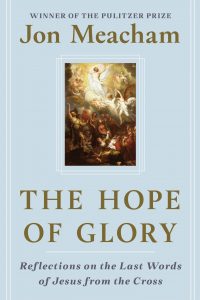 Jon Meacham, The Hope of Glory
Jon Meacham, The Hope of Glory
Convergent, February 12
Pulitzer Prize-winning historian Meacham goes deep on the seven final sayings of Jesus Christ (as recorded in the Gospels), in an attempt to unpack the depth and meaning of Christianity’s foundational words. It is qualities of mercy, grace, and kindness, rather than anger, judgement, and guilt, that Meacham, a former vestryman at Trinity Church Wall Street, seeks to reveal in what is being described as his most intimate book yet. –Jonny Diamond, Lit Hub Editor in Chief
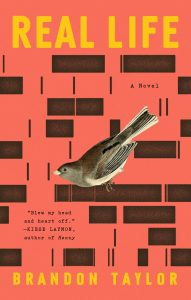 Brandon Taylor, Real Life
Brandon Taylor, Real Life
Riverhead, February 18
Brandon Taylor’s first novel takes place over one weekend at a lakeside Midwestern university. Wallace, an introverted biochemistry grad student from Alabama, finds himself embroiled in an intense, and potentially abusive relationship with a white male student. The story of Wallace’s traumatic past, and his confrontations with racism and isolation, give Taylor’s book the emotionally honest texture that has led various publications to list Real Life as one of the most anticipated debuts of the new decade. –Aaron Robertson, Lit Hub Assistant Editor
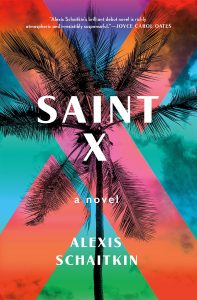 Alexis Schaitkin, Saint X
Alexis Schaitkin, Saint X
Celadon Books, February 18
In Schaitkin’s atmospheric debut novel, seven-year-old Claire’s sister is murdered while their family is vacationing on an unnamed island in the Caribbean (the eponymous Saint X). Though two men are arrested, the evidence against them is watery at best, and they’re soon released. Years later, when Claire is an adult, a chance meeting with one of those men sends her on a quest to find out what really happened to her sister all those years ago. Chang-rae Lee called it “a marvel of a book, a kaleidoscopic examination of race and privilege, family and self, told with the propulsive, kinetic focus of a crime thriller.” –Emily Temple, Lit Hub Senior Editor
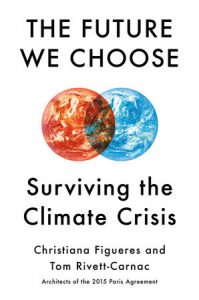 Christiana Figueres and Tom Rivett-Carnac, The Future We Choose
Christiana Figueres and Tom Rivett-Carnac, The Future We Choose
Knopf, February 18
Two of the main architects of Paris Accords lay out in stark detail what remains to be done, and what can be done, to affect the future of our climate. Will anyone listen? They describe two scenarios. What happens to the planet if we do not meet the agreement goals; and what happens if we do. You will want to live in the latter planet. Their style of narration is brisk, informed, and carries none of them gloom porn you sometimes feel in the expanding space of climate catastrophists. Figueres is a diplomat; Rivett-Carnac a political strategist. They are people with almost seventy years of collectivism behind them. Here’s to hoping this book reaches as many people as possible. –John Freeman, Lit Hub Executive Editor
 Julian Barnes, The Man in the Red Coat
Julian Barnes, The Man in the Red Coat
Knopf, February 18
Barnes’ new book tells the life story of surgeon and statesman (more widely known by patients and paramours as “L’amour médecin”—Dr. Love), Samuel Pozzi. A society doctor in Belle Époque Paris, he brought pioneering modernity to surgery and patient care while living a famously complicated private life, involving everyone from Henry James and Oscar Wilde to Sarah Bernhardt and Proust. In describing the time and place, Barnes tracks not only the glamor and pleasure of Pozzi’s world but, likewise, the surprising violence, prejudice, and nativism as well. –Emily Firetog, Lit Hub Deputy Editor
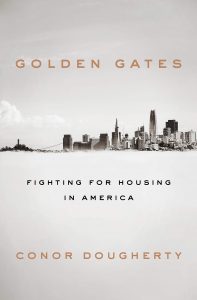 Conor Dougherty, Golden Gates: Fighting for Housing in America
Conor Dougherty, Golden Gates: Fighting for Housing in America
Penguin Press, February 18
Housing is at the core of inequality in the United States. How did it get so hard? Why are so many Americans spending over half their income on rent? How did San Francisco become the home of the $4,000 Chinatown studio? Conor Doughtery’s lucid first book tells this important story, zeroing in on San Francisco, and shining a light on some key heroines, like Sonja Trauss, a law-school and Ph.D drop out who was working at a bakery in Oakland (it was cheaper then commuting to a tutoring job) when she decided to attend a housing hearing and ask a sensible question: why can’t there be more affordable housing built? Why just 83 units? He also introduces us to a nun whose Catholic nonprofit has to fend off real estate speculators in her neighborhood, and a city worker who would rather quit than enforce zoning he knows is unfair. Parts of this book will infuriate, especially as forces mobilize against Trauss’s organization, but watching the various stories unfold Dougherty reveals few outright villains here. Instead, what emerges is a system that has not yet accepted the reality of the people who life within it. Dougherty’s propositions for how to make housing more fair are sane and will ought to influence a debate or two in years to come. –John Freeman, Lit Hub Executive Editor
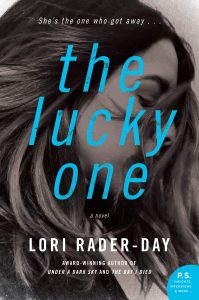 Lori Rader-Day, The Lucky One
Lori Rader-Day, The Lucky One
William Morrow, February 18
In Lori Rader-Day’s new mystery, The Lucky One, protagonist Alice has never quite gotten over her mysterious childhood abduction, despite being found less than 24 hours into her captivity. Decades later, Alice volunteers for an online group in support of those missing loved ones, only to find the face of her captor appear on screen. The Lucky One promises to be another signature Lori Rader-Day blend of psychology, suspense, and noir. –Molly Odnitz, CrimeReads Associate Editor
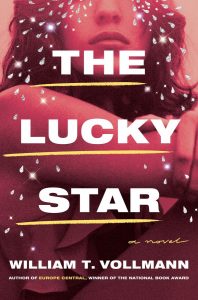 William T. Vollmann, The Lucky Star
William T. Vollmann, The Lucky Star
Viking, February 18
This big, underwater-lit novel returns Vollmann’s work to the dive bars and gender-fluid clubs of San Francisco. Only now it’s 2015 and a very different city. As in The Royal Family, his 1999 epic about a family of sex workers, many of whom lived on the street, the cast of The Lucky Star assembles a family of choice, mostly around a downtown place called the Y, run in part by bartender Francine. There’s a hard-drinking regular named Richard, who sometimes narrates; Shantelle, a transgender sex worker, Neva, who is connected to them all; and someone named Frank, who has changed his name to Judy Garland. Vollmann has been writing in this space since the mid 1980s, when it was considered the demi-monde, but far less so now. Indeed, in the last decade Vollmann himself began cross-dressing under the name Dolores, which led (of course!) to a book, The Book of Dolores, and a write-up in the New York Times. Moving between his cast in these pages, Vollmann admirably captures the pull of vulnerability and invention, how sex can be, in the right space, a powerful way to know one’s self, and ultimately, how much each of his characters here needs a space to be themselves. –John Freeman, Lit Hub Executive Editor
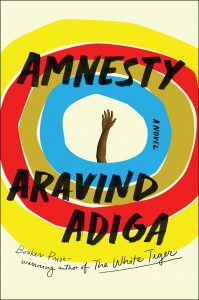 Aravind Adiga, Amnesty
Aravind Adiga, Amnesty
Scribner, February 18
Aravind Adiga’s new novel unfolds over one day in Sydney, Australia, during which Dhananjaya Rajaratnam—aka Danny—tries to outwit an employer’s attempt to silence him. “Danny” is illegal, and earns a living as a house cleaner. When he witnesses what is probably a murder, his client reminds him how easy it would be to drop a call into the Immigration authorities. Adiga is one of the great observers of power and its deformities, showing in novels like his Booker Prize winning White Tiger and Last Man in Tower how within societies, the powerful lean on the less powerful, and the weak exploit the weaker all the way down. Telling the tale of Danny’s immigration along the story of one tense day, he has built a forceful, urgent thriller for our times. –John Freeman, Lit Hub Executive Editor
 Ken Liu, The Hidden Girl and Other Stories
Ken Liu, The Hidden Girl and Other Stories
Saga, February 25
The Hidden Girl is Ken Liu’s first collection since his award-winning The Paper Menagerie and Other Stories was published in 2016. It compiles sixteen of Liu’s recent science fiction and fantasy stories, in addition to a short novel and an excerpt from The Veiled Throne, the third book in Liu’s Dandelion Dynasty Series. If this is anything like his previous work, fans can expect a diverse set of tales that infuse Liu’s often surrealist scenarios with sharp philosophical reflection. –Aaron Robertson, Lit Hub Assistant Editor
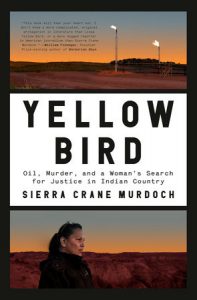 Sierra Crane Murdoch, Yellow Bird
Sierra Crane Murdoch, Yellow Bird
Random House, February 25
Under the auspices of empires and corporations alike, America has been built from murderous and unrelenting conquest: of land, of resources, of people, a war of extraction that continues to this day, at great human cost, in the Bakken oil fields of the Dakotas. Yellow Bird tells the story of Lissa Yellow Bird who returned to her home, the Fort Berthold Indian Reservation, to see it radically changed by the oil fields and the men and money they bring. But it is the disappearance of oil worker Kristopher “KC” Clarke from the reservation oil field that captures Yellow Bird’s attention, and forms the throughline of Sierra Crane Murdoch’s deeply reported story of greed, healing, and generational trauma. –Jonny Diamond, Lit Hub Editor in Chief
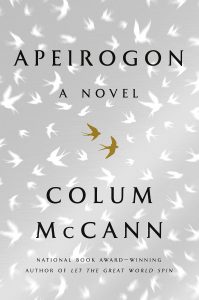 Colum McCann, Apeirogon
Colum McCann, Apeirogon
Random House, February 25
The latest novel from the National Book Award-winning author of Let the Great World Spin tells the story of two men, one Israeli and one Palestinian, both based on real people, both of whom lose their young daughters because of needless violence, and both of whom translate their grief into friendship and joint advocacy for peace. Told in short sections counting down from 500 to 1, and incorporating photographs and quotes from other thinkers, this novel might be McCann’s most ambitious yet. –Emily Temple, Lit Hub Senior Editor
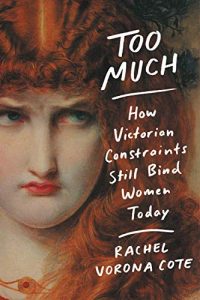 Rachel Vorona Cote, Too Much
Rachel Vorona Cote, Too Much
Grand Central, February 25
Lit Hub contributor Rachel Vorona Cote blends cultural criticism and Victorian literature in a book that explains the ways in which all women are still susceptible to being called “too much,” exploring how culture grinds away our bodies, souls, and sexualities, forcing us into smaller lives than we desire. An erstwhile Victorian scholar, Cote sees parallels between the Victorian fixation on women’s “hysterical” behavior and our modern policing of the same. Too Much encourages women to reconsider the beauty—and power—of their excesses. –Emily Firetog, Lit Hub Deputy Editor
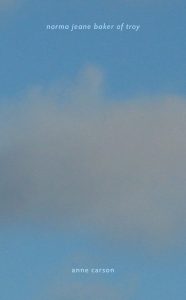 Anne Carson, Norma Jeane Baker of Troy
Anne Carson, Norma Jeane Baker of Troy
New Directions, February 25
Any new book from Anne Carson is reason for celebration. This hybrid work, originally staged as a play (of sorts) at the Shed, starring Ben Whishaw, examines the lives of Marilyn Monroe and Helen of Troy, only merged and transformed as only a poet and classicist of Anne Carson’s quality (and weirdness) would ever think to do. I’m here for whatever she wants to try. –Emily Temple, Lit Hub Senior Editor
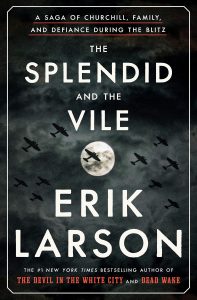 Erik Larson, The Splendid and the Vile
Erik Larson, The Splendid and the Vile
Crown, February 25
When the King asked Winston Churchill to Buckingham Palace on the night of May the 10th 1940, the British Bulldog was not the most obvious choice to replace Neville Chamberlin. Although head of the Admiralty for the second period in war time, Churchill was 65 years old, he drank too much, and he was widely thought to be impulsive. While considered great at orating, he was not deemed reliable. Time would prove this wrong, as Larson’s phenomenal new book reminds in vivid detail as it chronicles Churchill during the Blitz.
Drawing on a forensic level of research, Larson recreates this much studied (and storied) time and brings it viscerally to life. This book is peppered with eye-popping details. Like how the Germans developed bombs which screamed as they fell, to further terrorize civilians. Or that the British public was told if parachuters started landing in their cities to destroy any maps at home and take the carburetor out of their cars to render them useless. Larson describes how for Mary Churchill the war only became real not when her father became PM, but when Cafe de Paris, one of the clubs she used to drink in, was shelled, killing band members and dancers in the middle of a party. One man torn right in half.
And yet the parties continued. As the bombs were dropping, Churchill’s son Randolph was on a ship heading to Egypt, gambling up debts equivalent to $190,000 today. He cabled home to his wife, Pamela, instructing her to pay ten quid at a time to the various shipmates—most of them very wealthy—to whom he’d lost. Pamela eventually sold her wedding presents, jewelry, rented their house out, and moved to London to get a job so she could pay off her husband’s debts.
London through this period was under war rations. At night the city was so black people walked into each other or into the street to be hit by cars. To his credit, Averhill Harriman, though the son of a railroad baron, new what to expect. When he flew to London to meet Churchill and begin coordinating diplomacy, he bought tangerines in Lisbon on his layover and gave them to Clementine Churchill, noticing her unfeigned gratitude.
Drunk and ambitious, approaching his seventh decade, Churchill waded through the conflict doing what he could best: persisting and being stubborn for one. Shortly after arriving, Harriman had dinner with Churchill and wound up spending a bombing raid night with the PM, as 100,000 incendiary canisters were dropped on London. They watched from the roof of No. 10 with metal helmets on. 200 fires were started instantly. Meantime, Churchill prepared the nation with speeches and talks and kept them up as the raids continued. Using that time’s technology to the limits of his reach, but not becoming a demagogue in the process. He wanted England to think of itself and to prepare. This is a deeply compelling work of history, and without resorting to heroism, it makes one long powerfully for real leadership. –John Freeman, Lit Hub Executive Editor
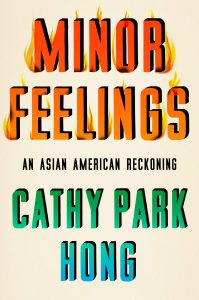
Cathy Park Hong, Minor Feelings
One World, February 25
In this memoir in essays, the poetry editor of the New Republic (and the author of one of our favorite poetry collections of the decade) unpacks her experiences as an Asian American—and the “minor feelings” of shame, sadness, dysphoria, and more which it engenders—as well as the culture, not least the culture of whiteness, that surrounds her. An incisive book from one of our best poets and writers. –Emily Temple, Lit Hub Senior Editor
MARCH
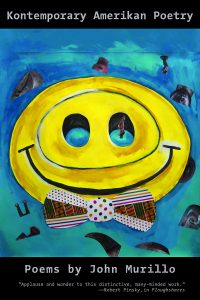 John Murillo, Kontemporary Amerikan Poetry
John Murillo, Kontemporary Amerikan Poetry
Four Way Books, March 2
John Murillo’s second volume of poetry is an illuminated mediation on the way memory throws shadows on the wall. How we see ourselves in the past, as participants, or watchers, looking at injustice. Like Aracelis Girmay’s Teeth, this is a book of personal archaeology. The poet lays out his findings, tenderly, dating them, a poem from Ontario, California, in this year, when something nearly lethal happened, an event that could have changed the course of his entire life. In other places, the poem squeezes into a small line, slipping into the crawl spaces where relics were kept. A .45, a father’s war medals. The accoutrements of violence. Would he use them? Would he disinherit himself? Would his spirit hold? What a powerful book this is, told in a tone without trembling, nor any bravado. Lines of it will linger on your retina afterwards like these poems have been shown to you, in lamp light, or fire. –John Freeman, Lit Hub Executive Editor
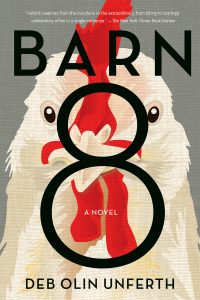 Deb Olin Unferth, Barn 8
Deb Olin Unferth, Barn 8
Graywolf, March 3
Look, I love Deb Olin Unferth, and it is my policy to read anything she writes. That would be true even if I had only read this one piece of flash fiction by her, but I have read almost all of her books, and my policy stands. I once went to a reading she gave and had to take notes on my arms in eyeliner because I’d forgotten my notebook. Anyway. In her latest book, two egg industry auditors (yes) decide to attempt “one of the greatest animal heists in history” (oh yes) by stealing a million hens from an Iowa egg farm. Unferth is the master of being funny and political and weird and serious at the same time, and this book sounds no different. Can’t wait to crack it open. (Sorry not sorry for this egg pun.) –Emily Temple, Lit Hub Senior Editor
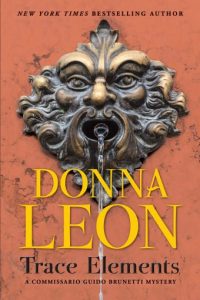 Donna Leon, Trace Elements
Donna Leon, Trace Elements
Grove, March 3
In Donna Leon’s latest, Commissario Guido Brunetti and his colleague Claudia Griffoni are called to a hospice to witness a patient’s dying words. She’s convinced her late husband’s death was no accident, and only manages to mutter a few phrases indicating a debt to a dangerous lender before expiring. It’s up to the Commissario to investigate, especially as he’s never been able to let an unsolved mystery go. –Molly Odintz, CrimeReads Associate Editor
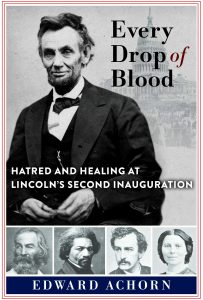 Edward Achorn, Every Drop of Blood
Edward Achorn, Every Drop of Blood
Atlantic Monthly, March 3
Wish you’d been at Lincoln’s inauguration? Here’s your ticket. Drawing on historical wizardry—diaries, accounts, and memoirs—Achorn has assembled a prismatic portrait of that fateful day which reads like one long rolling dolly shot of history. Some of the figures are unknown, whereas others, like Walt Whitman, have figured largely in Lincoln’s presidency. And yet Achorn manages to retrieve new information, showing what Whitman, on assignment for the New York Times, conceived of as news. Frederick Douglas also looms large, but Acorn has a tougher time of accessing his essence. In a time of bot-and-propaganda enhanced actual divisions in America, this book argues the republic has been there before and got through, though it took a lot of blood. –John Freeman, Lit Hub Executive Editor
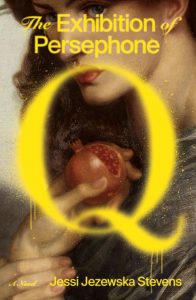 Jessi Jezewska Stevens, The Exhibition of Persephone Q
Jessi Jezewska Stevens, The Exhibition of Persephone Q
FSG, March 3
At the beginning of this cool-toned debut, Percy has not yet told her husband she is pregnant—nor that she has been waking up in the middle of the night and pinching his nostrils closed, to no apparent purpose. Then she receives a mysterious package in the mail: inside, the catalogue to a photography exhibit—the photographs taken by her ex-fiancé, the girl in them bearing an uncanny resemblance to her own self. Odd and diffuse, it’s a worthy addition to the field of cool-girl lit. –Emily Temple, Lit Hub Senior Editor
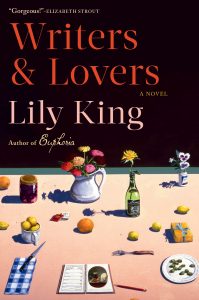 Lily King, Writers & Lovers
Lily King, Writers & Lovers
Grove, March 3
Casey is 31 years old, a waitress clinging to dreams of becoming a writer. Her mother is dead, she is torn between two men who are polar opposites, and she is an absolute delight to spend time with. The pleasure of reading this novel comes from walking alongside Casey in her everyday life. Her wandering, her waffling, her indecision, her panic—all relatable. The characters feel like flesh and blood humans. The specificity with which she describes the nuances of working in a restaurant—all spot-on. You’re right there with her, and she makes for great company. –Katie Yee, Book Marks Assistant Editor
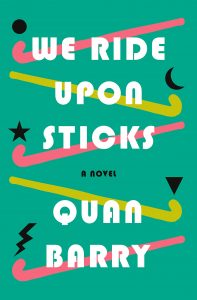 Quan Barry, We Ride Upon Sticks
Quan Barry, We Ride Upon Sticks
Pantheon, March 3
All I had to know about this one to get excited for it was that a) it is about a girls’ field hockey team in Danvers, Massachusetts in the 1980s and b) the field hockey team signs a dark pledge to Emilio Estevez in order to win games (why didn’t our soccer team ever think of that) and c) it works, but also rather goes awry. Of course it does. Now that I am halfway through, I can confirm that it is a) truly laugh out loud hilarious (and if you knew how cold my heart was this would mean more to you) and b) an ode to the actual, not all that intense female friendships most of us had in high school and c) the most pleasurable book I’ve read in a long, long time. –Emily Temple, Lit Hub Senior Editor
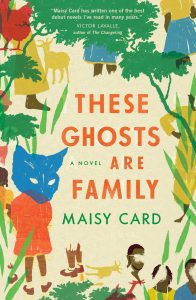 Maisy Card, These Ghosts Are Family
Maisy Card, These Ghosts Are Family
Simon & Schuster, March 3
At the center of Maisy Card’s novel, These Ghosts Are Family, is a Jamaican family that has moved from colonial Jamaica to present-day Harlem. The drama unfolds after Stanford Solomon reveals that he is not really who he says he is: he faked his own death, stole the identity of a friend, and is really Abel Paisley. Over the course of the novel, the fates of the Paisley family members come untethered and the narrative shows the impact that Abel’s choices have had on them. What make dramas so interesting, despite their common themes of identity and family relationships, are the particular circumstances and depth of their characters. These Ghosts Are Family operates on two levels: it pursues the personal (e.g., infidelity, lies, betrayal) while also exploring the universal; through the lens of one family, it confronts the enduring traumas of colonial history, slavery, and forced migration. –Eleni Theodoropoulos, Lit Hub Editorial Fellow
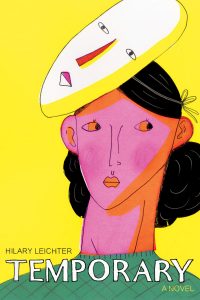 Hilary Leichter, Temporary
Hilary Leichter, Temporary
Coffee House, March 3
I have long been a fan of Hilary Leichter’s fiction, and am very much looking forward to her debut novel, Temporary, which has been described as a Calvino-esque critique of the American Dream, in which the main character takes on ever-stranger job placements, from work on a pirate ship to sitting on the board of a corporation to shining an endless closet of shoes. We could honestly use a little absurdist humor in the face of late-capitalism’s ubiquitous predations. LOL. –Jonny Diamond, Lit Hub Editor in Chief
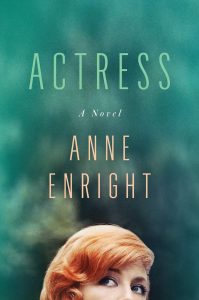 Anne Enright, Actress
Anne Enright, Actress
Norton, March 3
Booker Prize-winning Anne Enright is one of the best writers on families working today. Her newest novel tells the story of Irish theatre legend Katherine O’Dell from the perspective of her daughter, Norah. Bouncing between the glamor of post-war America and the shabbiness of 1970s Dublin, the novel recounts secrets, crimes, and fame, but also, critically, perfectly, explores the relationship between mothers and daughters in light of them. –Emily Firetog, Lit Hub Deputy Editor
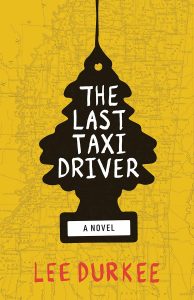 Lee Durkee, The Last Taxi Driver
Lee Durkee, The Last Taxi Driver
Tin House, March 3
Lee Durkee is the funniest writer you’ve never heard of, but that may change. His 2001 debut, Rides of the Midway, is a 1970s coming of age masterpiece, full of quaaludes and clairvoyance and people who know Jesus personally. It managed to capture the improbability of belief, and the magic of how it keeps rebooting in the human species. Now, nearly 20 years later, at last we have Durkee’s second book, his own reboot, and wow is it worth the wait. Not surprisingly, it features a writer whose promising debut has long since been forgotten, who has limped home to Mississippi after years in Vermont, and who now pays the bill driving a Town Car so gut-shot even guys who bring six-packs into the ride wince when it goes over pot holes. Durkee’s narrator is a chatty, friendly observer of the world he encounters. And across one mammoth all night shift, which feels like a future Tom Waits vehicle if there ever was one, we see him cut across all manner of life. He picks up men recently out of prison, and others who belong there. Some passengers clearly just need a listen to. There’s no false hope here, the book suggests, just a new life and a new destination. In our times this creates a spark like flint striking dark rock. –John Freeman, Lit Hub Executive Editor
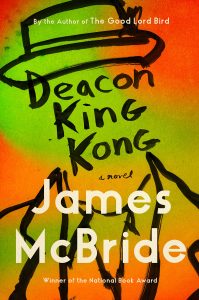 James McBride, Deacon King Kong
James McBride, Deacon King Kong
Riverhead, March 3
National Book Award-winner James McBride returns with a comic new novel set in 1960s New York. After a church deacon named Sportscoat wanders into a Brooklyn housing project and shoots a drug dealer, the people affected by the murder must reckon with Sportscoat’s decision, from the residents to the cops, Italian mobsters to the members of the same Baptist church where Sportscoat once served. These characters lives ultimately intersect in unexpected ways. McBride brings his darkly optimistic sense of humor to an odd tale of a crotchety deacon gone rouge. –Aaron Robertson, Lit Hub Assistant Editor
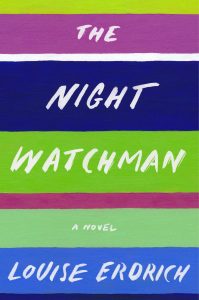 Louise Erdrich, The Night Watchman
Louise Erdrich, The Night Watchman
Harper, March 3
Louise Erdrich is the most enchanting novelist in America today. She has so many registers, and in recent years, so much invented territory which is hers alone. With the publication of LaRose in 2016, she concluded a trilogy of novels about justice. The many ways injustice seeps down into the most intimate relationships. The Night Watchman takes on a new public level of concern. Thomas, the so-called Night Watchman of the title, is the leader of a tribe whose reservation land is under threat. Though mostly a night watchman, he also has to plan to go to Washington and argue before committees on behalf of the people he represents. The book, in many ways, is a study in how we are haunted by people we should stand up for. Patrice, Thomas’s niece, goes to Minneapolis in search of her missing sister, who almost surely has met a grim fate. Other characters begin with good intentions and get distracted. All this is handled with a matter-of-fact grace and awareness that work and family take almost all of her characters’ energy. Ultimately, it is this network, lived rather than built or curated, which comes to their aid. What a thing it is to be alive during Erdrich’s time, to see kindness and cruelty engaged with equal grace. –John Freeman, Lit Hub Executive Editor
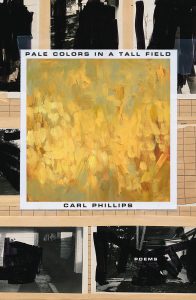 Carl Phillips, Pale Colors in a Tall Field
Carl Phillips, Pale Colors in a Tall Field
FSG, March 3
I have never heard a bad word about poet Carl Phillips, whose next collection considers the intersections of memory, colors, and forgetfulness. If we imagined our recollections as colors, what hues would they have? Which parts of ourselves would appear vividly, and which parts dim? Phillips has the ability to be both enigmatic and reassuring in his work, always going past where you think the poem aims to go, and achieving something greater, as in his poem, “The Same in Sun as It Felt in Shadow”: “Crownless now, intransitive, neither at rest nor / not at rest between to be shaken and to be / less shaken, in his head he’s the magnolia’s / branches, he’s the cast of ravens scattered loose / among them.” –Aaron Robertson, Lit Hub Assistant Editor
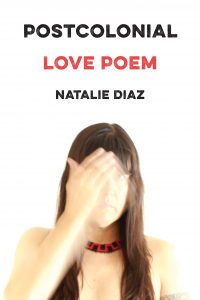 Natalie Diaz, Postcolonial Love Poem
Natalie Diaz, Postcolonial Love Poem
Graywolf, March 3
Natalie Diaz’s second collection has been so highly anticipated, so yearned for, so slowly revealed, one poem at a time, here and there, and now, at last it is here. God, is it beautiful, and like all the best poetry, it makes you want to be in it up to your neck. Furious and tender, warm and embodied, these poems make you want to love, they make you want to think. They cause you to read slowly, and pay attention. Moving from sensual poems addressed to a lover, to poems that make it clear how much of a body like hers must be reclaimed from public space in order to love—like the poem “American Arithmetic,” which ran here at Lit Hub—this is a breakthrough collection. In a world where nothing feels so conservative as a love poem, Diaz takes the form and smashes it to smithereens, building something all her own. A kind of love poem that can allow history and culture and the anguish of ancestors to flow through and around the poet as she addresses her beloved. –John Freeman, Lit Hub Executive Editor
 David Farrier, Footprints : In Search of Future Fossils
David Farrier, Footprints : In Search of Future Fossils
FSG, March 3
What will modern-day civilizations leave behind? David Farrier confronts this question in a book whose premise is both disconcerting and fascinating: that using unprecedented forms of technology, we have built structures and systems that will outlast us. Farrier reports on ocean plastic, nuclear waste, and other industrial and geological forms that humans have created, and I’m curious to see what his book anticipates about the ways that these objects will endure through time, even as this book may raise questions about how far into the future human civilization is meant to last, on a rapidly warming planet. –Corinne Segal, Lit Hub Senior Editor
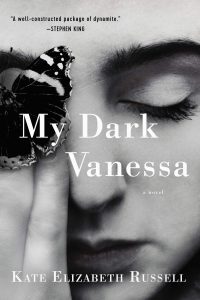 Kate Elizabeth Russell, My Dark Vanessa
Kate Elizabeth Russell, My Dark Vanessa
William Morrow, March 10
Despite the way the term gets bandied about, it’s rare that I ever actually find something “unputdownable”—I am unfortunately quite easily distracted. So believe me when I tell you that this novel had me hooked and good. It’s narrated by Vanessa, who has what she thinks of as a love affair with her teacher when she’s only 15—a love affair that she must re-evaluate years later, when he’s accused of sexually harassing other students. The writing is immersive, the plot swift, but the most impressive thing about this novel is that just where most narratives of this kind usually stop, Russell pushes onward, exploring the lives of her characters both immediately after and years after the events in question. –Emily Temple, Lit Hub Senior Editor
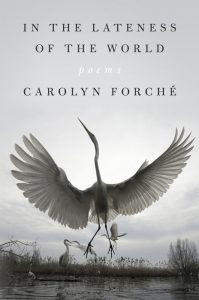 Carolyn Forché, In the Lateness of the World
Carolyn Forché, In the Lateness of the World
Penguin Press, March 10
It has been 17 years since Carolyn Forché published a book of poems, and In the Lateness of the World announces she is back. Coming fast on the heels of her memoir of last years this book is bursting with poems of migration, crossing, and looking back. It is as if the poet is standing, one foot in the river, wondering which way the next crossing will go. Drawing on her own travels and periods of reporting, on the world’s seemingly endless upheaval, these poems move beyond disquiet and creates the charged ethical field in which we all live, all the time, especially at that moment we move. –John Freeman, Lit Hub Executive Editor
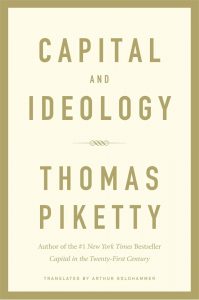 Thomas Piketty, tr. Arthur Goldhammer, Capital and Ideology
Thomas Piketty, tr. Arthur Goldhammer, Capital and Ideology
Belknap, March 10
French economist Thomas Piketty’s 2013 bestseller, Capital in the 21st Century, was an unlikely BIG SERIOUS BOOK smash hit which revealed in rigorous detail what many had come to understand as plainly as an eviction notice nailed to the front door: radical income inequality is very bad. In his latest, Capital and Ideology, Piketty connects the dots and “exposes the ideas that have sustained inequality for the past millennium, revealing why the shallow politics of right and left are failing us today, outlining the structure of a fairer economic system.” Look, normally when I’m talking to someone and they plead for a “politics beyond left and right” I worry I’m talking to a religious libertarian or an anarcho-fascist, but given his earlier work, I’m looking forward to digging into Piketty’s latest. –Jonny Diamond, Lit Hub Editor in Chief
 Clarissa Goenawan, The Perfect World of Miwako Sumida
Clarissa Goenawan, The Perfect World of Miwako Sumida
Soho Press, March 10
In the second novel from the author of Rainbirds, a young woman named Miwako Sumida—a sophomore at Waseda University in Tokyo—hangs herself in a faraway forest, leaving her friends to try to unravel her life and understand her death. Sharlene Teo called it “an elegantly cryptic, poetically plotted Murakami-esque whydunit.” –Emily Temple, Lit Hub Senior Editor
 Michelle de Kretser, On Shirley Hazzard
Michelle de Kretser, On Shirley Hazzard
Catapult, March 10
For a few years, now, the Australian publisher Black Inc. has been putting out a fantastic series in which the best contemporary writers spend 40,000-odd words investigating the work of a literary icon—past titles include the likes of Nam Le on David Malouf and Ceridwen Dovey on J.M. Coetzee. In the latest for the series, released in the US by Catapult, Miles Franklin award-winning novelist Michelle de Kretser ventures part criticism part biography on the absolutely brilliant Shirley Hazzard (do yourself a favor and read The Transit of Venus, if you haven’t). This is the kind of close reading—of a life and its writing—we should have more of. –Jonny Diamond, Lit Hub Editor in Chief
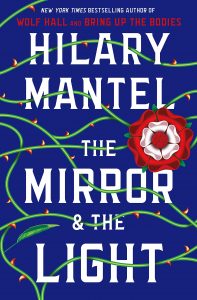 Hilary Mantel, The Mirror & The Light
Hilary Mantel, The Mirror & The Light
Henry Holt, March 10
We’ve been waiting years for this, and now it’s finally (almost!) here. The Mirror & The Light follows Wolf Hall and Bring Up the Bodies as the last novel in Hilary Mantel’s acclaimed trilogy exploring the life of Thomas Cromwell, which has so far garnered two Man Booker prizes for the author, making her the first woman and first Brit to win twice. Sir Peter Stothard, who chaired the Booker judge panel in 2012, said Mantel had “rewritten the book on writing historical fiction” with the series. Mantel herself added in May that the trilogy’s final installment “has been the greatest challenge of my writing life, and the most rewarding; I hope and trust my readers will find it has been worth the wait.” I’m sure we will. –Corinne Segal, Lit Hub Senior Editor
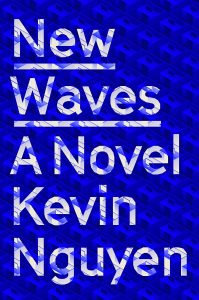 Kevin Nguyen, New Waves
Kevin Nguyen, New Waves
One World, March 10
Full disclosure: Kevin Nguyen is as sharp and funny (and a little mean) in person as he is on twitter, a consistency for which I have ABSOLUTE RESPECT, and that I’m confident will translate perfectly to his debut novel, New Waves. Billed as part page-turning heist story, part incisive critique of startup culture’s oblivious racism, Kirkus Reviews called New Waves, “A blistering sendup of startup culture and a sprawling, ambitious, tender debut.” Which sounds about right. –Jonny Diamond, Lit Hub Editor in Chief
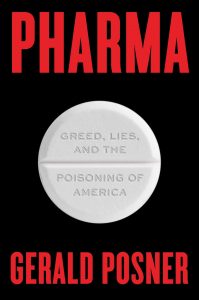 Gerald Posner, Pharma: Greed, Lies. and the Poisoning of America
Gerald Posner, Pharma: Greed, Lies. and the Poisoning of America
Avid Reader, March 10
The cat’s out of the bag on this one, we all know pharma has been a disaster for many Americans, but Gerald Posner specializes in telling you what you don’t know: in his New York Times bestsellers like Case Closed and books like Hitler’s Children or God’s Bankers, what he has perfected is achieving the kind of disgust only a massive research dive can bring. An almost existential, mind-bending level of disgust. The sort of disgust that turns the corner firmly on any light or air flowing the other direction. Considering how much has been written in recent years on the Sacklers and many other pharmaceutical makers who appear in these pages, Posner manages to tell us yet more information. As far back as the 1950s they were running shell companies to disguise sponsored research, and they had garnered the FBI’s attention because they were hiring blacklisted communist writers to work in media arms. The screenwriter Walter Bernstein, interviewed here last year, the only who declined the job. The juggernaut rolled on, and by rolling together the building of their empire with the out of control prescription mentality of modern medicine, Posner has created a medical leviathan for our times. –John Freeman, Lit Hub Executive Editor
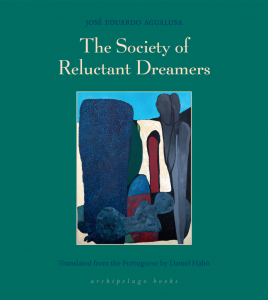 José Eduardo Agualusa, tr. Daniel Hahn, The Society of Reluctant Dreamers
José Eduardo Agualusa, tr. Daniel Hahn, The Society of Reluctant Dreamers
Archipelago, March 10
I loved Agualusa’s A General Theory of Oblivion, in which a woman bricks herself into her own apartment and doesn’t come out for 30 years (dream), so I’m looking forward to the next of his novels to be translated from the Portuguese by Daniel Hahn. It is also about the history of Angola, but here the protagonist is free to wander, interviewing writers (like Julio Cortázar) and revolutionaries—if only in his dreams. –Emily Temple, Lit Hub Senior Editor
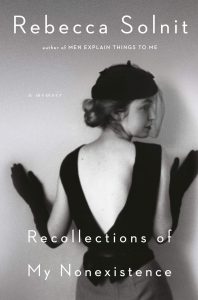 Rebecca Solnit, Recollections of My Nonexistence
Rebecca Solnit, Recollections of My Nonexistence
Viking, March 10
Over the past several years, Rebecca Solnit has established herself as a guiding light in these dark times. From Men Explain Things To Me to Call Them by Their True Names to the pieces here on Literary Hub dot com, she has written about almost everything. She’s a trusted voice. Whether she’s writing about feminism or the environment or politics, she often asks: how did we get here? In Recollections of My Nonexistence, she answers a different question, which is: how did you get here? This memoir tells the story of Rebecca Solnit against the backdrop of 1980s San Francisco and is a fascinating homage to the books and people who shaped her worldview. –Katie Yee, Book Marks Assistant Editor
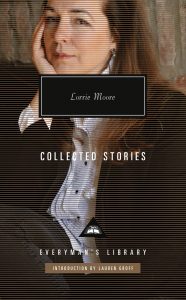 Lorrie Moore, Collected Stories
Lorrie Moore, Collected Stories
Everyman’s Library, March 12
She is the helium which has been piped into the short story, the writer who has done the rare thing in American humor: turning the mundane extraordinary, rather than the other way around. Now, at last, all four of Lorrie Moore’s collections have been stuffed into one big, delicious book. What a gift this will make to readers and young writers. All the holiday charade parties run amok, the love affairs that fall on characters like a safe from the sky. The shattering trips to the ER with children. To read Moore’s stories is to feel the ecstatic, terrifying lightning zot of being alive. The risk and the companionship of being in a world where the rewards are few. She makes her bleakness a cozy blanket, so gorgeously made. There’s not a boring sentence in the 776 pages here. And very few writers work in prose transfer this kind of energy from brain pan to reader. –John Freeman, Lit Hub Executive Editor
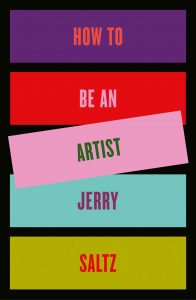 Jerry Saltz, How to Be an Artist
Jerry Saltz, How to Be an Artist
Riverhead, March 17
You probably know Jerry Saltz as the Pulitzer Prize-winning art critic for New York magazine, the erstwhile art critic for The Village Voice, and the marquee judge on the short lived reality show Work of Art: The Next Great Artist. So it’s safe to say he’s more than qualified to write an inspirational handbook for the wannabe-artist in all of us. –Emily Temple, Lit Hub Senior Editor
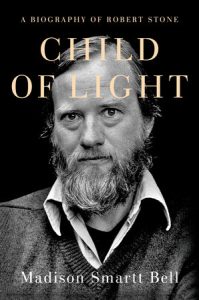 Madison Smartt Bell, Child of Light: A Biography of Robert Stone
Madison Smartt Bell, Child of Light: A Biography of Robert Stone
Doubleday, March 17
The time is ripe for a Robert Stone revival. A moralist disguised as a hippy, a reporter who went to war and became a novelist: he was the closest thing America had to Graham Greene. Whereas Greene saw England’s empire failing before most, Stone realized America had an imperium far earlier than most. He also saw through sacred pieties of American power faster than just about any novelist of his time. He might have looked like a Hemingway character, with a ship captain’s beard, but Stone was a rare kind of moralist all the way through. From his pages have sprung novelists as diverse as Jennifer Egan and his friend, Ken Kesey, with whom he traveled on the merry prankster bus. “We always called him the merry paranoid,” Kesey joked once. “Bob Stone was the first one to come along to make paranoia work for him.”
This spring there are three ways to leap into his work afresh or again. Library of America has put together three of Stone’s best books into one volume—his wild, psychedelic Vietnam novel, The Dog Soldiers, which won the National Book Award; along with Flag for Sunrise and Outerbridge Reach, also finalists in the 1980s and 1990s. The former is the kind of Latin American thriller Tom Clancy would write if he thought, the latter a beautiful, unnerving book about a man circumnavigating the world by sailboat. Stone made his restlessness work for him, and it meant you can enter his books and go many places. The Eye You See With, a book of selected nonfiction, shines most though when it’s about America. In one essay, he attends the 1988 Republic National Convention and witnesses the naked contempt on display for poverty, an issue Stone took personally, having been destitute himself.
Raised at an orphanage after his mother was diagnosed schizophrenic. A runaway to the navy at 17. He remained a skeptic his whole life. In the early 1990s, while many liberals were praising the strategy of don’t ask don’t tell, Stone unloaded on the military for not only allowing this fiction, but not investigating sexual assault of female officers. Madison Smartt Bell brings this and many other sides of Stone alive in his biography, Child of Light, which is particularly good at showing how a man who grew up alone and sometimes afraid could find himself at home in the world. Could turn himself, through work and guilt, and then mercy, into a man capable of living beyond paranoias. –John Freeman, Lit Hub Executive Editor
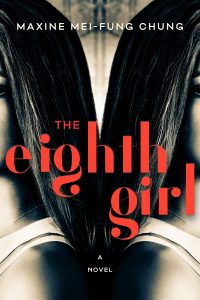 Maxine Mei Chung, The Eighth Girl
Maxine Mei Chung, The Eighth Girl
William Morrow, March 17
Alexa Wu is not who you think she is: she has alternate personalities she cannot control. Only her stepmother, her shrink, and her best friend, the mysterious Ella, know about her condition. When Alexa gets a job at a high-toned gentleman’s club in London, she is drawn into a dark world where she comes close to discovering Ella’s secrets. But Alexa must keep it together in trying circumstances if she is going to help her friend and stay intact. –Lisa Levy, CrimeReads Contributing Editor
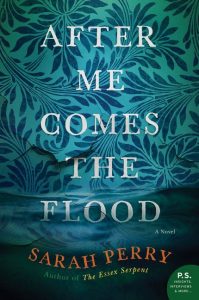 Sarah Perry, After Me Comes the Flood
Sarah Perry, After Me Comes the Flood
Custom House, March 17
Fun fact: Sarah Perry, the bestselling author of The Essex Serpent, wrote After Me Comes the Flood first. Her fans will not be disappointed. Opening with a delicious premise, the mystery and confusion unfolds immediately for plain John Cole, whose car one day breaks down in the middle of a country road. When he approaches a house, a stranger—a woman, who is laughing (cue the tension)—says she has been waiting for him. Inside her house, in fact, awaits a group of people who seem to know and be expecting him. But how could they have predicted this would happen? How could they have expected him? And, above all, what can they want? –Eleni Theodoropoulos, Lit Hub Editorial Fellow
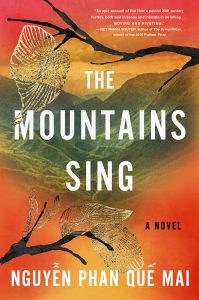 Nguyen Phan Que Mai, The Mountains Sing
Nguyen Phan Que Mai, The Mountains Sing
Algonquin, March 17
In this panoramic epic, Hương, a middle age writer returns to Hanoi and relives the stories of her family’s long and tortured past. She recalls the stories her grandmother told of being raised in Vietnam before the sudden, brutal land reforms. How her family went from wealthy to impoverished overnight, and her daughter, Hương’s mother, suffered terribly as they moved to Hanoi at the mercy of South Vietnamese soldiers. Like the work of Duong Thu Huong, who deserves the Nobel one day, this book brings to life a crucial part of Vietnamese history from within. You heart will not leave this book untouched. –John Freeman, Lit Hub Executive Editor
 Harry Dodge, My Meteorite: Or, Without the Random There Can Be No New Thing
Harry Dodge, My Meteorite: Or, Without the Random There Can Be No New Thing
Penguin Books, March 17
In this essentially uncategorizable memoir-cum-meditation-cum-manifesto-cum-map of the world, Harry Dodge considers the death of his father and the life of his mother, as well as a meteorite ordered from eBay, and the nature of love and art. “I could say this is the smartest memoir I ever read but that’s pulling us back to the safe place,” wrote Eileen Myles. “We are animals, machines, friends, reading things and we’ve never been talked to this way before. Seductive and wise, My Meteorite is the conversation you want.” Not for nothing, but Ben Lerner, Eula Biss, Miranda July, Wayne Koestenbaum, Ocean Vuong, and a host of others seems to agree. –Emily Temple, Lit Hub Senior Editor
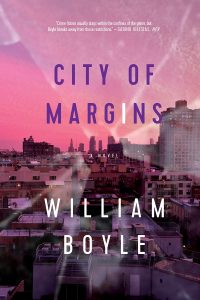 William Boyle, City of Margins
William Boyle, City of Margins
Pegasus, March 17
In the last few years Boyle has quietly proven he can take on any number of kinds of crime fiction, from a screwball farce to a hardboiled noir to a heartfelt examination of lonely people whose lives cross. His territory is Brooklyn, but not the borough of Williamsburg tourists and Brooklyn Heights millionaires: his characters live modestly in places like Gravesend, away from the gentrifiers out by Coney Island. In Margins Boyle again taps his knack for creating a world full of characters on the make or about to get taken in the ecosystem of noir. –Lisa Levy, CrimeReads Contributing Editor
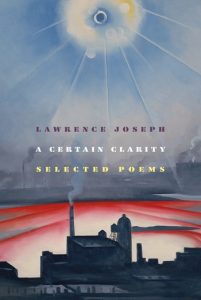
Lawrence Joseph, A Certain Clarity: Selected Poems
FSG, March 17
In a year full of handy new selections and long overdue returns, the poetic event of 2020 ought to be the publication of Lawrence Joseph’s A Certain Clarity. Raised the son of a Lebanese-American grocer in Detroit, he grew up in that city’s riots, then studied English Literature at Cambridge and law at Michigan. Moved to New York at the height of the 1980s wealth creation. Walking the city’s streets, he has been a Virgil in our psychotically greedy times. He hears and sees New York City with a gumshoe’s love and an outsider’s ear for pain. Reading through these poems, which date back to the 1970s, it’s clear Joseph was a moralist before it was fashionable, deeply tuned to justice because he had lived through its opposite. As an Arab-American, he has watched as one after another U.S. government propped up, patronized, and undercut regimes throughout the Middle East. The range of his voice is simply awesome. He can speak low, and with a painterly attention to light; he sings love songs of marriage and the solitude of two; and when he’s angry, he can weave a seething prosody that’d make Blake wonder if the angels he saw were demons. In our sinister times, nothing coming out this year, from America or elsewhere, will make such good companion reading to those wondering if the world really is on fire. Would that our times were not catching up so bleakly with Joseph’s clear vision. –John Freeman, Lit Hub Executive Editor
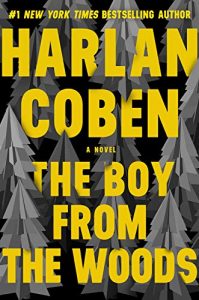 Harlan Coben, The Boy from the Woods
Harlan Coben, The Boy from the Woods
Grand Central, March 17
Coben may be best known for his twisty plots, but when it comes crafting characters, he’s just as good. Case in point: The Boy From the Woods introduces a compelling new series lead, the mononymed Wilde, once a feral boy found in the wilderness, and now an ex-military operative who still has no memory of his early childhood. Enter a missing girl and a friend’s plea to help find her, and you’ve got another fantastic thriller from one of the best. –Molly Odintz, CrimeReads Associate Editor
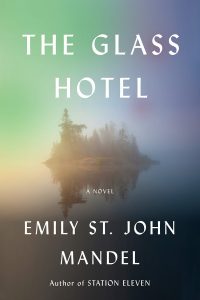 Emily St. John Mandel, The Glass Hotel
Emily St. John Mandel, The Glass Hotel
Knopf, March 24
Mandel’s first novel since her 2014 hit Station Eleven is also an apocalypse novel, in a way—only there are many apocalypses, and they are much smaller, and much more personal. This luscious, mesmerizing book follows a cast of characters who orbit, in various ways, a man running an elaborate Ponzi scheme—a scheme that, of course, must eventually come to an end. To say more would be to rather give it away, but suffice it to say that Mandel’s latest is as compelling as Station Eleven, but somehow more elegant, more haunting, and stranger. –Emily Temple, Lit Hub Senior Editor
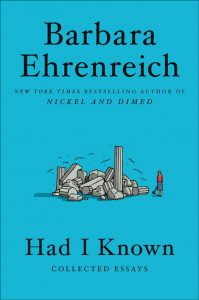 Barbara Ehrenreich, Had I Known: Collected Essays
Barbara Ehrenreich, Had I Known: Collected Essays
Twelve, March 24
I have long had an enormous place in my heart for the journalism of Barbara Ehrenreich, who I instinctively pair in my head with Molly Ivins on some muckraking road movie, two honest-to-goodness social justice warriors lighting out for the oil fields to take names and stir up shit. Ehrenreich made her name with Nickel and Dimed (2001), a must-read work of immersive reporting in which she gave lie to the central tenet of the American Dream: if you work hard, 40 hours a week, you’ll make it. In the subsequent 20 years, we’ve come to understand just how devastating are the consequences of income inequality in a country that makes you pay for everything out of pocket: your health, your childcare, your education… And Ehrenreich’s been there the whole time, reporting and writing about life in the richest country in the world. –Jonny Diamond, Lit Hub Editor in Chief
 N. K. Jemisin, The City We Became
N. K. Jemisin, The City We Became
Orbit, March 24
N.K. Jemisin is back. The City We Became has been described by Kirkus Reviews as “a love/hate song to and rallying cry for the author’s home of New York.” The premise of Jemisin’s speculative novel is that every great city has a human avatar who leads it through its maturity, while also resisting an extraterrestrial nemesis that seeks to destroy it. New York’s avatar, however, is too weak to fight alone, and thus each of the city’s five boroughs produces its own avatar: a diverse cast of characters named after the boroughs themselves. Will the five avatars come together to triumph over the mysterious Woman in White? Jemisin uses her story to speak on gentrification, police violence, and other contemporary issues that have never before been addressed so directly in her fiction before. –Aaron Robertson, Lit Hub Assistant Editor
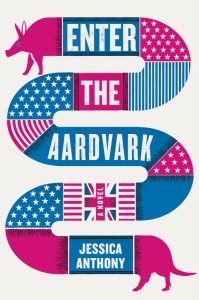 Jessica Anthony, Enter the Aardvark
Jessica Anthony, Enter the Aardvark
Little, Brown, March 24
One day, in Washington D.C., “millennial Congress-bro” Alexander Paine Wilson (a Republican) wakes up to find an enormous taxidermied aardvark on his doorstep, kicking off an outrageous string of events and a novel that romps back and forth between Victorian England and contemporary America to great effect. “If you’ve been wondering, as I have, where the spirit of Nathanael West might be in these berserk and awful times,” wrote Joshua Ferris, “enter Jessica Anthony. With her highly inventive, ever attentive, and morally serious (as all great comedy must be) Enter the Aardvark, she estranges all over again our deplorable political moment, and thereby helps make it bearable.” A feat indeed. –Emily Temple, Lit Hub Senior Editor
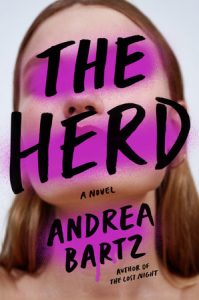 Andrea Bartz, The Herd
Andrea Bartz, The Herd
Crown, March 24
Her hard-hitting debut, The Lost Night, has made Andrea Bartz one to watch, and her second novel, The Herd, confirms her reputation. As The Herd begins, the glamorous owner of a feminist coworking startup vanishes on the eve a big announcement about the company. It’s up to her not-so-faithful stooges to find out what’s going on, and uncover the dark secrets behind the founding of the company. As someone whose building was recently taken over by a WeWork and who now has to wait 10 minutes for the elevator, I can’t endorse this book enough. –Molly Odintz, CrimeReads Associate Editor
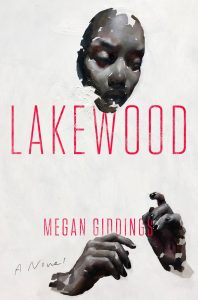 Megan Giddings, Lakewood
Megan Giddings, Lakewood
Amistad, March 24
There is something wrong with Lakewood, Michigan, and a young black woman named Lena Johnson is about to find out what that is. When Lena’s grandmother dies and the family’s debt comes to light, Lena drops out of college to take up a high paying job in the isolated town of Lakewood. She lives a comfortable life here in exchange for her participation in a secret program where strange things are happening: eye drops change the color of people’s irises, pills promise to get rid of bad thoughts, and so on. Like Get Out, Megan Giddings’ Lakewood addresses the real historical horror of scientific “experimentation” on black bodies. –Aaron Robertson, Lit Hub Assistant Editor
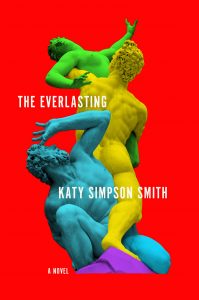 Katy Simpson Smith, The Everlasting
Katy Simpson Smith, The Everlasting
Harper, March 24
This ambitious historical novel spans some 2,000 years, following four characters in the legendary and ever-dramatic city of Rome. In the eternal city, Smith pits her characters—a monk, a biologist, a martyr, a “bastard princess”—up against our most elemental questions: of love and faith and time. Sometimes Satan wryly comments, which is the thing I’m looking forward to most of all. –Emily Temple, Lit Hub Senior Editor
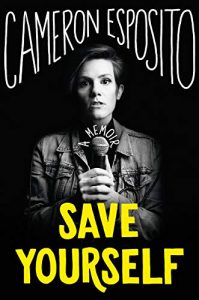 Cameron Esposito, Save Yourself: Essays
Cameron Esposito, Save Yourself: Essays
Grand Central, March 24
In the last couple of years, Cameron Esposito has made comedy from the forefront of representing queer life, including in the show Take My Wife, a Netflix comedy special that raised more than $70,000 for the Rape, Abuse & Incest National Network, and a new set chronicling her experience with lesbian divorce. Now, she’s releasing an essay collection that follows her upbringing in a strictly Catholic environment to her struggle to gain traction as a standup comic in a field hostile to women and queer people. Even as a fan who’s familiar with her story, I’m looking forward to seeing what new additions the book has to offer. –Corinne Segal, Lit Hub Senior Editor
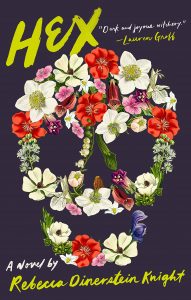 Rebecca Dinerstein Knight, Hex
Rebecca Dinerstein Knight, Hex
Viking, March 31
Academics tie themselves up into a pretzel of betrayal and desire in Rebecca Dinerstein Knight’s propulsive second book, which reads a tiny bit like AS Byatt after dark. When Nell is expelled from a PhD program in botany after her lab partner dies in a toxic experiment, she retreats to Brooklyn to lick her wounds. Then becomes obsessed with finishing her late partner’s work. Unfolding as a series of notebook entries, Hex tracks Nell’s growing obsession with Dr. Joan Kallas, her advisor, and a staggering number of side affairs that begin happening as she chases a poison that will undo itself. This is a bold and highly charged book that makes entertainment seem like not such a bad word. –John Freeman, Lit Hub Executive Editor
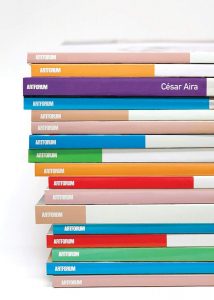 César Aira, tr. Katherine Silver, Artforum
César Aira, tr. Katherine Silver, Artforum
New Directions, March 31
The hero of Cesar Aira’s new novel is obsessed with the magazine Art Forum, and over this 90 page novel, he finds a way to show us why without once becoming the boring guy at the cafe who has a thing or two he knows and wishes to tell you. Once again Aira proves certain laws of gravity just don’t seem to apply to him. –John Freeman, Lit Hub Executive Editor
APRIL
 Chelsea Bieker, Godshot
Chelsea Bieker, Godshot
Catapult, April 7
In this debut, we meet 14-year-old Lacey May, who lives in the drought-stricken town of Peaches, California, and follows Pastor Vern, who promises to end all her struggles. But then her mother disappears, and Vern’s demands begin to twist, and Lacey May begins to doubt. What unravels is a harrowing story of abandonment, pain, a cult that’s never heard of global warming, and ultimately redemption, and true family. –Emily Temple, Lit Hub Senior Editor
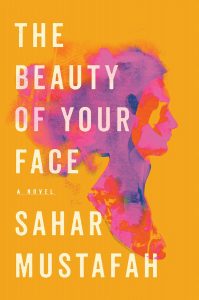 Sahar Mustafah, The Beauty of Your Face
Sahar Mustafah, The Beauty of Your Face
W. W. Norton, April 7
Afaf Rahman is the principal of Nurrideen School for Girls, a Muslim school in the suburbs of Chicago, when a shooter—radicalized by the alt-right online—attacks the school. Alternating between the attack and her memories of Palestine, The Beauty of Your Face explores faith, family, and hate with haunting precision. –Emily Firetog, Lit Hub Deputy Editor
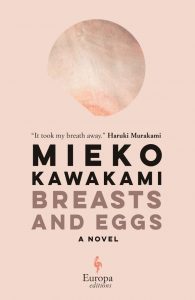 Mieko Kawakami, tr. Sam Bett & David Boyd, Breasts and Eggs
Mieko Kawakami, tr. Sam Bett & David Boyd, Breasts and Eggs
Europa, April 7
Mieko Kawakami’s first full-scale novel to be translated from Japanese into English reveals what a Catherine Wheel of talent she is, how unplaceable and unique. How forceful. In the book, three women undergo transformative change, while trying to keep up appearances. Natsu, her sister Makiko, and Makiko’s daughter, Midoriko. In the book, Makiko goes to Tokyo in search of a reasonably priced breast enhancement; meanwhile, Midoriko refuses to speak to her mother except through writing. A decade later, Natsu wonders about her life without children. Kawakami is an explosive, hilarious, and deeply perceptive writer. The way she moves among her characters here will make clear why Breasts and Eggs is the Makioka Sisters of its time. –John Freeman, Lit Hub Executive Editor
 Marie Mutsuki Mockett, American Harvest
Marie Mutsuki Mockett, American Harvest
Graywolf, April 7
Well, the Iowa caucuses are a couple weeks away and we’re doing it again: fly-by politics-as-sports reporting that frames everything as RED STATE vs. BLUE STATE, in a game that nobody can possibly win. America is much more complicated than that, and needs—if not deserves—to internalize a whole new set of narratives that center empathy and tolerance rather than the calcified mythologies of tribe and creed… Which is why Marie Mutsuki Mockett’s memoir, American Harvest, is such an important book for 2020. Mutsuki Mockett, whose father’s family goes seven generations deep in the Nebraska panhandle was born and raised in Carmel, California, to a Japanese mother, her childhood as removed from a Midwestern wheat field as you might imagine. But when she inherits the family farm, Mutsuki Mockett begins a journey into the center of America—its agrarian rhythms, its generosity, its enormous blindspots—and comes out the other side with the kind of perspective we need more of right now. –Jonny Diamond, Lit Hub Editor in Chief
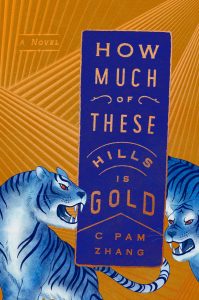 C Pam Zhang, How Much of These Hills Is Gold
C Pam Zhang, How Much of These Hills Is Gold
Riverhead, April 7
At the beginning of this debut novel, a pair of siblings are left orphaned in the American West. Hoping to find a way to bury their father, a former gold prospector and miner, according to Chinese tradition, they stuff the body in a suitcase and set off to scare up the required two silver dollars to cover his eyes. Thus begins an adventure the likes of which you’ve almost certainly never read. –Emily Temple, Lit Hub Senior Editor
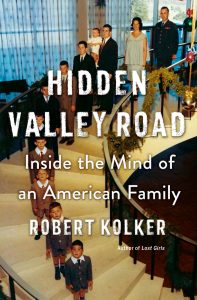 Robert Kolker, Hidden Valley Road: Inside the Life of an American Family
Robert Kolker, Hidden Valley Road: Inside the Life of an American Family
Doubleday, April 7
As in Rebecca Skloot’s phenomenal work of science, this highly readable work of narrative science tells two heartbreaking stories. In one, there is a family, in this case, one of fourteen, six of whom by the 1970s had been diagnosed with schizophrenia. On the other track, Kolker narrates the unfolding saga of the disease, its discovery, treatment, and the many decades of frustrating research. This is an astonishing work of research and empathic reporting. –John Freeman, Lit Hub Executive Editor
 Deon Meyer, The Last Hunt
Deon Meyer, The Last Hunt
Atlantic Monthly, April 7
The indefatigable detective duo of Benny Griessel and Vaughn Cupido has returned in this latest blockbuster adventure from Deon Meyer. This time, the two officers of South Africa’s Hawks elite police unit find themselves investigating a cold case: the murder of a police officer. To solve this, they must ride the world’s most opulent train ride—and hope to receive help from two travelers, who seem to have disappeared. You’ll enjoy the suspense and thrills of this runaway train of a mystery. –Olivia Rutigliano, CrimeReads Editorial Fellow
 Elizabeth F. Thompson, How the West Stole Democracy from the Arabs
Elizabeth F. Thompson, How the West Stole Democracy from the Arabs
Atlantic Monthly, April 7
This eye-popping work of history reveals the extent to which Europe is complicit in the failure of democracy in many parts of the Middle East. During World War I, Arab nationalists in greater Syria rose in revolt against Ottoman Rule, with backing of the British. In 1920, the Syrian-Arab Congress declared a constitutional government in Damascus that guaranteed equal rights to all citizens. Rather than back this move, the British and French imposed a system of mandates on the region, claiming it wasn’t ready for self-government. When the Arabs resisted, the French Army invaded—smashing the growing nascent democracy and crushing a chance for a secular Arab government. A necessary work of history in an era when the region, as ever, is treated as having “ancient hatreds” at the root of its problems. The appearance of Thompson’s book gives yet another important corrective to this historical myopia. –John Freeman, Lit Hub Executive Editor
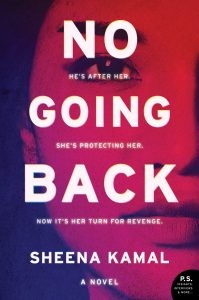 Sheena Kamal, No Going Back
Sheena Kamal, No Going Back
William Morrow, April 7
In this third installment of her excellent Nora Watts series Kamal keeps the plot in the family. The daughter the troubled Watts gave up for adoption, Bonnie, now a teenager, has a powerful enemy: the rich and brutal Zhang family, who kidnapped her in a previous book. Dao, an enforcer for the triads who did private security for the Zhangs, is particularly bent on revenge. Watts must keep Bonnie safe, which means she must track down Dao, who is as wily as he is dangerous. –Lisa Levy, CrimeReads Contributing Editor
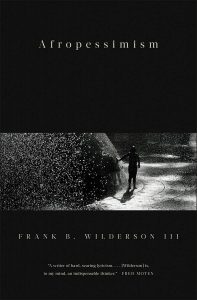 Frank B. Wilderson III, Afropessimism
Frank B. Wilderson III, Afropessimism
Liveright, April 7
What if a modern state needs blackness in order to define itself through the subjection of an other? That in effect to see African-American history as having ever transcended master-slave relationships is a fantasy? Here are two of the central notions of Afro-pessimism, and this ground-breaking book will bring the creation of this radical idea into sharp critical critical, narrative and powerful personal shape. Wilderson, who is a professor of African American studies at UC Irvine, is a lucid thinker and a beautiful writer, and he has made a work of intensely sophisticated effects. Drawing out slowly the shadows of history, as lived; attacking directly the arguments which may be plied against his book.
A former stock broker and Dartmouth graduate, who grew up in the only black family in an upscale Minnesota suburb, Wilderson’s identity is a multi-sided thing. In the last 1980s he moved to South Africa and wrote for the ANC. He has seen racism covert and overt, in many different settings. He has experienced many different kinds of danger. In the best moments this book acknowledges the necessity of allowing the multitudinousness of his self to exist, while acknowledging the world in which he lives will not. The power of this book emerges from the anguish of that gap, its attempt to lessen it some by arguing it has been created and maintained by unmovable forces. Wilderson shows by how many forces within American life, from mental illness and imprisonment, to spectacles of violence can be explained within Afro-pessimism. Here’s to hoping the book leads to many informed debates. –John Freeman, Lit Hub Executive Editor
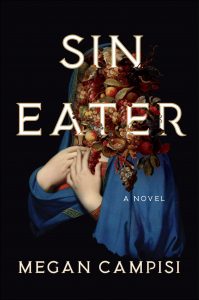 Megan Campisi, Sin Eater
Megan Campisi, Sin Eater
Atria, April 7
In 16th-century England, 14-year-old May is arrested after stealing a loaf of bred and sentenced to become a Sin Eater: one of the women who hear the last confessions of the dying, and then eat ritual foods representing their sins, taking on their burdens so the dying may go to heaven. But when May’s silent mentor refuses to eat the errant deer heart on a dead woman’s coffin—and is executed herself for her refusal—May begins to investigate the mystery herself. . . which is not super easy when you’re forbidden from speaking and other people shrink at your presence. A dark, propulsive novel that twists your stomach in all the right ways. –Emily Temple, Lit Hub Senior Editor
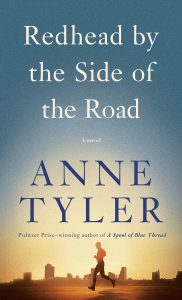 Anne Tyler, Redhead by the Side of the Road
Anne Tyler, Redhead by the Side of the Road
Knopf, April 7
Most of Anne Tyler’s novels teach a lesson to people forced to lose control. Untidiness, in her world, both literal and emotional, is the soil of happiness. Mica, the hero of her latest book is poised for a reckoning in that regard. He cleans his house in a daily routine that would make Marie Kondo beam. He eats breakfast at the same time, jogs on the same trails. He’s so careful a driver he tootles around Baltimore with an inner traffic cop praising and parsing his performance. So fastidious has he become, though, that he recognizes very little of what the world’s telling him, like how his girlfriend is about to lose her apartment. When a teenager turns up at his door, convinced Mica is his father, Tyler’s hero must confront the messier parts of his past and look at the difference between fantasy and reality. –John Freeman, Lit Hub Executive Editor
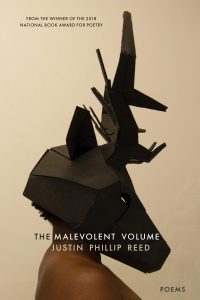 Justin Phillip Reed, The Malevolent Volume
Justin Phillip Reed, The Malevolent Volume
Coffee House, April 7
Justin Phillip Reed’s second collection moves like a mock gothic, stepping into the spaces that have been dangerous and more for the poet, and summoning bestiary of counter-menace. Heads mounted on the wall, hawks that prey in the sky, bees which noisy their hives and sweeten better than tangerine, which is “mostly texture anyway,” Reed animates them all with this huge, lance-like voice of his. Throwing their mighty symbolic power into the space of desire and his body. The beveled densities of Indecency appear less frequently here, and in its place is more of an oracular sound. How Reed found a way to write a book as fanged and fabulous and complexly musical as this one right after his National Book Award-winning debut, Indecency, is a mystery, but one thing’s clear now: he’s here to stay. These are strong poems, showcasing a range of moods and affects. Sometimes punctuated, otherwise so neatly joined they don’t need it. Sometimes gentle, in other moments, wielding fury’s high bright tone. –John Freeman, Lit Hub Executive Editor
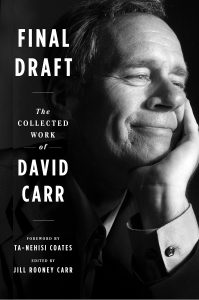 David Carr, Final Draft: The Collected Work of David Carr
David Carr, Final Draft: The Collected Work of David Carr
HMH, April 7
I’m very glad for this collection, because even though the story of David Carr’s darkest days is an important one (as told by the man himself), it is important to remember him also as the wonderful reporter he was, who made a 25-year career with wry, trenchant stories on all manner of subject, from celebrities to media consolidation to national politics. And though it’s a selfish thought, one only wonders at what Carr—and his fearless wit—would have made of the present moment and all its absurd extremes. –Jonny Diamond, Lit Hub Editor in Chief
 Veronica Roth, The Chosen Ones
Veronica Roth, The Chosen Ones
HMH, April 7
Veronica Roth’s first novel for adults (after a little YA series franchise you might you may have heard of called Divergent) has a great hook, especially for those of us who grew up reading countless books about teenagers saving the world. It begins ten years after five teenage Chosen Ones defeated the Dark Lord. Now, as young adults, they are the biggest celebrities in the world—and for some of them, that’s fine, but for others, the ones still suffering from PTSD, it’s almost unbearable. And that’s all before we get to the parallel dimension! I loved it. –Emily Temple, Lit Hub Senior Editor
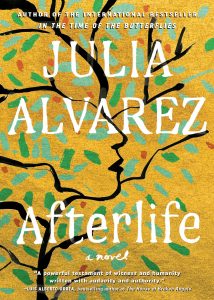 Julia Alvarez, Afterlife
Julia Alvarez, Afterlife
Algonquin, April 7
Julia Alvarez’s first novel in over a decade centers on a widowed professor of literature who must have the worst retirement ever. Shortly after she leaves her hard-won position teaching literature at a New England college, Antonia Vega’s husband of many years dies, her sister goes missing, and an undocumented immigrant girl in need turns up in her life. What an interesting counterpoint this novel makes to Jenny Erpenbeck’s novel Go, Went Gone, also about a professor suddenly roped into the court of political action on behalf of migrants. Here Alvarez imagines, in her usual big-hearted way, that it’s not seeing or reading, necessarily, but loss which tenderizes us to sympathy for others. What a book. –John Freeman, Lit Hub Executive Editor
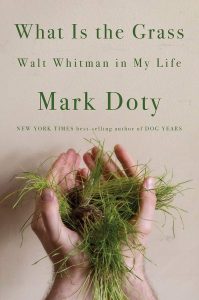 Mark Doty, What is the Grass: Walt Whitman in My Life
Mark Doty, What is the Grass: Walt Whitman in My Life
Norton, April 14
For the past decade, Mark Doty has been writing essays about the cone of light Walt Whitman shone into his life. This beacon illuminated and altered all, from Doty’s attitude toward men and desire to the way he thinks about toward riches. At last he has woven these meditations together into a single book, forming one strong narrative of biography, criticism and memoir-driven rediscovery. Doty puts on a clinic in how to read closely but expansively, going back to Whitman’s greatest poems, bouncing them off incidents in his own life, but also the work of his contemporaries. One of the most fascinating sections of the book compares Stoker and Whitman, two fellow feral souls howling at the moon in the 19th century. This is shining proof that criticism can make you want to hold it close. –John Freeman, Lit Hub Executive Editor
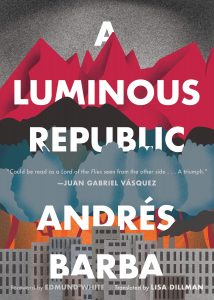 Andrés Barba, tr. Lisa Dillman, A Luminous Republic
Andrés Barba, tr. Lisa Dillman, A Luminous Republic
Mariner, April 14
Barba’s short novel Such Small Hands, also translated by Lisa Dillman, was one of my favorite books of 2017—weird and creepy and wonderful. If you’ve read it, you’ll know that he’s a master of writing about children (and their inherent strangeness and violence), so considering this latest is about a city overrun by 32 feral children, I expect it’s going to be completely brilliant. –Emily Temple, Lit Hub Senior Editor
 Richard Wagamese, For Joshua
Richard Wagamese, For Joshua
Milkweed, April 14
For almost two years now I have been telling anyone who will listen—on Twitter, in bars, on trains—to read Richard Wagamese’s novel Indian Horse, a heartbreaking account of Canada’s infamous “residential schools” in which generations of First Nations children suffered horrifying abuse and neglect at the hands of those charged with their care and their “reform.” Yet through all the misery, Wagamese—who died in 2017—is able to evoke the particular and hidden joys of childhood as they manifest through a love of hockey. So I am eager to read For Joshua, Wagamese’s searching memoir, written as a letter to his son, that explores recovery, identity, and what it means to be an Ojibwe father in a colonized world. Wagamese is a writer of rough grace and fathomless humanity who has given so much more to the world than it ever gave to him. –Jonny Diamond, Lit Hub Editor in Chief
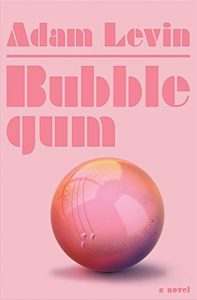 Adam Levin, Bubblegum
Adam Levin, Bubblegum
Doubleday, April 14
The latest novel from the author of the delightful (and enormous) The Instructions is, well, also enormous, at 784 pages, and looks to be pretty delightful too: it is the fictional memoir of a young man living in a fictional present, one in which the internet was never invented, and instead humankind put all its attention on Botimals, aka “cures,” tiny robotic pets. George Saunders called it “a dazzling accomplishment of wit and inventiveness—an irrepressible and insanely entertaining examination of our obsessive culture that doesn’t forget to be fond of that which it is satirizing.” Also, I heard the cover actually smells like bubblegum. –Emily Temple, Lit Hub Senior Editor
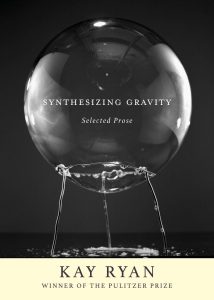 Kay Ryan, Synthesizing Gravity
Kay Ryan, Synthesizing Gravity
Grove, April 14
It should not surprise, given the jeweled perfection of her great poetry, that Kay Ryan can create some damn fine prose when she wanted to, too. This book, assembled with the help of the poet Christian Wiman, collects the best of it, to borrow the title of her Pulitzer Prize-winning collection. What a wonderful voice she displays, writing on everything from Robert Frost and Marianne Moore to the value of emptiness and loneliness. Ryan has always kept her own counsel as a poet. She perfected her game by staying out of the poetry game, and you see the effect here on her voice. She’s a kind of wisecracking philosopher, a truly original thinker, a quantum physicists of space who also, clearly, knows how her own clear voice sounds better than when alone. –John Freeman, Lit Hub Executive Editor
 Marisa Meltzer, This Is Big
Marisa Meltzer, This Is Big
Little, Brown, April 14
Marisa Meltzer was five years old when she went on her first diet. Almost 40 years later, having struggled with her weight for her entire life—and having become a successful writer—she came across an obituary for Jean Nidetch, the housewife who founded Weight Watchers. Meltzer joined the program, and set out to learn about Nidetch; the resulting book is both memoir and biography, entwining the lives of two fascinating women. –Emily Temple, Lit Hub Senior Editor
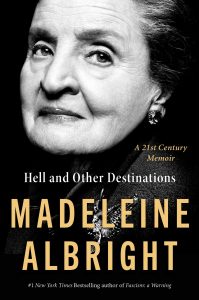 Madeleine Albright, Hell and Other Destinations: A 21st Century Memoir
Madeleine Albright, Hell and Other Destinations: A 21st Century Memoir
Harper, April 14
In a time when the state department seems to be run without design or order, and strategic thinking has been exchanged for outright corruption, Albright’s upcoming memoir can be forgiven its alarming title. America made a lot of the accelerant in many parts of the world on fire today, and we lit the matches, too, sometimes. Still, what could an enlightened use of power do in these times to prevent us from an outright hellish inferno? Why is Albright so determined to keep working for it? It’s been almost 20 years since she left office, and Albright has been busier than most current secretaries of state, writing books (she’s been a NYT bestseller six times), working in an investment capacity, speaking, teaching and joisting with prime ministers and nitwits. Chronicling her late life multi-job reinvention, Hell and Other Destinations will surely make many long for a moment when those leading diplomacy at least thought, read, or even listened to others. –John Freeman, Lit Hub Executive Editor
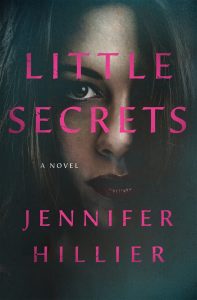 Jennifer Hillier, Little Secrets
Jennifer Hillier, Little Secrets
Minotaur, April 14
Canadian Hillier is a heck of a thriller writer, and for me, at least, her books are like potato chips: I read last year’s Jar of Hearts and couldn’t wait to gobble up her previous books, Creep, Freak and The Butcher. Little Secrets promises to be just as irresistible: golden couple Marin and Derek both run successful businesses and still find time to dote on their son, Sebastian. When Sebastian is taken, however, their marriage hits the skids. Marin lost one of the people dearest to her, and she’s prepared to go to drastic measures to make sure she doesn’t lose her cheating husband too. –Lisa Levy, CrimeReads Contributing Editor
 Mike Davis and Jon Wiener, Set the Night on Fire: Los Angeles in The Sixties
Mike Davis and Jon Wiener, Set the Night on Fire: Los Angeles in The Sixties
Verso, April 14
This huge and exhilarating work of history aims to restore some depth and accuracy to how we talk about Los Angeles in the 1960s, the decade during which “Surfin’ USA” conjured utopian dreams of a beach color, and the 1965 Watts uprising suggested there was some trouble with that dream. As Davis and Weiner show, the reality was far more complex than that pendulum swing, and Los Angeles was very different than other parts of the state in building a culture of resistance. In addition to more than 100 urban protests and near riots that surrounded Watts, resistance was being led by middle and high school students, tens of thousands of whom walked out in the mid to late 1960s. The ACLU did not follow in LA, and the authors pay tribute to their role guiding civil rights pushes. LA had the first LBGTQ street protest, it wasn’t New York, and they were fighting an entrenched white nationalism on the streets of LA too. It wasn’t just the police, but white gangs who made it hard for kids of color to surf on many beaches. Weaving between electoral politics and protest movements, from city hall to Sacramento, Davis and Weiner have created an important book to read in a time where LA needs more than ever to be mobilized. –John Freeman, Lit Hub Executive Editor
 Sara Paretsky, Dead Land
Sara Paretsky, Dead Land
William Morrow, April 14
The great V.I. Warshawski is back, bitches. That’s right: Sara Paretsky’s legendary detective returns in her 20th installment. This time, she’s pulled into a mystery involving sinister land developers when her impulsive goddaughter tries to help a destitute celebrity. But thankfully, Chicago’s touchiest PI is on the case. –Olivia Rutigliano, CrimeReads Editorial Fellow
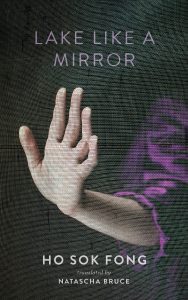 Ho Sok Fong, tr. Natascha Bruce, Lake Like a Mirror
Ho Sok Fong, tr. Natascha Bruce, Lake Like a Mirror
Two Lines, April 14
How must a Malay woman live in a strict religious society? This question is explored throughout Chinese Malaysian author Ho Sok Fong’s second short story collection (and first translated into English), Lake Like a Mirror. Ho slips between narrators, perspectives, and stylistic modes in ways that suggest just how surreal and malleable political and social arrangements really are. Two of Ho’s stories are set in rehab centers for women “judged guilty of licentiousness, deviant ideology, gender confusion, apostasy.” Ho’s women are bored, damaged, and censored, and translator Natascha Bruce helps bring these stories to life by reimagining the author’s concise, eerie writing. –Aaron Robertson, Lit Hub Assistant Editor
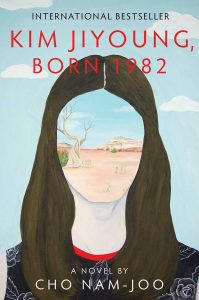 Cho Nam-Joo, tr. Jamie Chang, Kim Jiyoung, Born 1982
Cho Nam-Joo, tr. Jamie Chang, Kim Jiyoung, Born 1982
Liveright, April 14
This feminist novel became a runaway bestseller when it was first published in South Korea in 2016, selling over 270,000 copies in 10 months and over a million copies by 2018—the first Korean novel to do so since 2009. Even President Moon Jae-in read it. What’s exceptional about this book is how unexceptional its main character is: she is living the typical life of a Korean woman. It’s a testimony of subtle hardship and everyday discrimination. You’ll probably see something you recognize in there too. –Emily Temple, Lit Hub Senior Editor
 Ha Jingfang, tr. Ken Liu, Vagabonds
Ha Jingfang, tr. Ken Liu, Vagabonds
Saga, April 14
Hugo Award-winning author Hao Jingfang’s new book is set amid a second civil war, not between nations, but between opposing factions on two planets: Mars and Earth. A colony of young people from Mars is sent to Earth on a diplomatic mission to ease tensions, though the struggle proves more difficult than they’d imagined. They are left without a real sense of community or belonging, are in fact stuck between two worlds. Jingfang is the first Chinese woman to win the Hugo, and her debut novel has been translated into English by The Paper Menagerie author Ken Liu. A winning combination if there ever was one. –Aaron Robertson, Lit Hub Assistant Editor
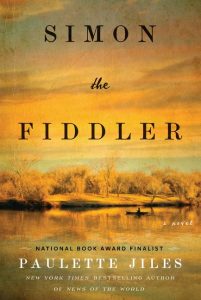 Paulette Jiles, Simon the Fiddler
Paulette Jiles, Simon the Fiddler
William Morrow, April 14
Jiles’ most recent novel, 2016’s thoroughly delightful News of the World, was one of my favorite works of fiction of the last ten years (seriously, you should all read it before the Tom Hanks movie adaptation is released later this year) so I shall most assuredly be picking up a copy of her new one, in which the author returns to her old stomping ground of 19th-century Texas. Set during the dying days of the Civil War, Simon the Fiddler is the story of a vagabond fiddle player, his rag-tag coterie of army musicians, and the Irish servant girl who steals his heart. –Dan Sheehan, Book Marks Editor
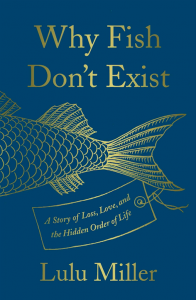 Lulu Miller, Why Fish Don’t Exist
Lulu Miller, Why Fish Don’t Exist
Simon & Schuster, April 14
From the host of NPR’s Invisibilia, this debut book tells the story of a scientist named David Starr Jordan who set out to discover as many of the world’s fish as he could, building one of the most important specimen collections ever. But in 1906, the San Francisco earthquake hit, sending over a thousand of his fish, housed in fragile glass jars, crashing to the floor. As Jordan painstakingly remade his collection, he introduced an innovation that, he believed, would protect it against the chaos of the world. Miller blends science and biography to investigate the age-old question of how to go on when everything seems lost. –Emily Firetog, Lit Hub Deputy Editor
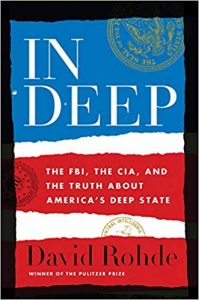 David Rohde, In Deep
David Rohde, In Deep
Norton, April 14
Somehow, three quarters of Americans now believe that a group of unelected security and military officials direct the policy of the United States. How did we get here? Is this group anywhere near that powerful, and what is it exactly that the permanent state does? Drawing on deep sources and impeccable research, two time Pulitzer-winning journalist Rohde tells the story of this fixation and what is actually there, going back to scandals at the NSA, CIA and FBI but also telling the story of what they do and who they report to. This is an important book for an election cycle that will surely be featuring the words deep state over and over again, as if it, not an out of control president, is the story. –John Freeman, Lit Hub Executive Editor
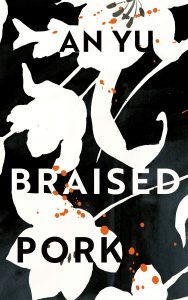 An Yu, Braised Pork
An Yu, Braised Pork
Grove, April 14
A woman walks into her bathroom on a very normal day, only to find her husband dead in the bathtub. Next to his lifeless body, there’s a strange pencil sketch. So begins An Yu’s whirlwind of a novel, which will lead you through Beijing, bring you to Tibet, coax you into hidden bars, and string you along through the protagonist’s unsettling past. The premise itself is intriguing enough, but the real magic is in watching Jia Jia stretch her limbs as she leaves behind a rather restrictive marriage and encounters places and people she never imagined. Come for the mystery, stay for self-discovery of a liberated woman. –Katie Yee, Book Marks Assistant Editor
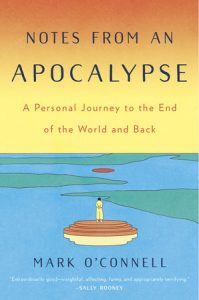 Mark O’Connell, Notes From an Apocalypse
Mark O’Connell, Notes From an Apocalypse
Doubleday, April 14
As any thoughtful observer should have realized by now, the apocalypse—the real one, climate collapse—is no longer a story we tell of the future: it is happening now, all over the world, from the bushfires of New South Wales to the sinking islands of the South Pacific to the no longer perma-frost of the Siberian taiga. Mark O’Connell is one such thoughtful observer, and takes his wry Dubliner’s sensibility on a grand tour through a grifters’ gallery of End Times hustlers and Doomsday fantasists, from the Mars Society meetings of Southern California to the sleek Silicon Valley bolt-holes of New Zealand. O’Connell is an ideal skeptic-by-proxy for such a tour, suspicious of his own sentimentality, yet not given to the death-by-statistics approach of so many recently heralded books. These are notes worth keeping. –Jonny Diamond, Lit Hub Editor in Chief
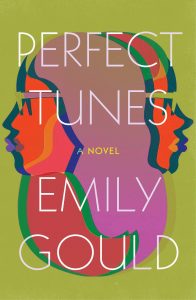 Emily Gould, Perfect Tunes
Emily Gould, Perfect Tunes
Avid Reader, April 14
Emily Gould is a delight on Twitter, and I need you to know how rarely I bestow that compliment. Perfect Tunes, her second novel, which tells the story of a friendship, a tumultuous love affair, and motherhood, is just the right balance of acerbic and warm. The novel follows a young songwriter and musician in early-aughts New York, so bonus points for music scene and jeans nostalgia. –Jessie Gaynor, Social Media Editor
 Graham Swift, Here We Are
Graham Swift, Here We Are
Knopf, April 21
Set in Brighton 60 years ago, this unexpectedly comic novel from the author of Waterland and Last Orders tells the tale of three stage performers having the season of their life, while offstage their lives grow ever more entangled. The “flimsy structure built over swirling water” turns out not to be their pier theatre, but the relationships they’re stuck into. Brisk but loose, this is a satisfying late entertainment from the Booker Prize winner. –John Freeman, Lit Hub Executive Editor
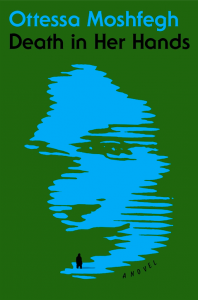 Ottessa Moshfegh, Death in Her Hands
Ottessa Moshfegh, Death in Her Hands
Penguin Press, April 21
Moshfegh returns to the thriller—sort of—with Death in Her Hands, in which an old woman finds a note in the forest near her home: Her name was Magda. Nobody will ever know who killed her. It wasn’t me. Here is her dead body. But there is no dead body, and no clues, except for the ones the woman invents for herself to follow, which gives this novel an edge of metafiction—it’s as if we’re watching Moshfegh herself work out how a mystery novel might be written, how she might weave the generic patterns in with the spark of the idea, and how it all might come together in the end—or not. –Emily Temple, Lit Hub Senior Editor
 Blake Gopnik, Warhol
Blake Gopnik, Warhol
Ecco, April 21
Blake Gopnik, who served as chief art critic of The Washington Post for a decade, has been given unprecedented access to the Warhol archives, and has matched a biographer’s rigor to an art critic’s acumen. It can be very difficult to find the life behind the icon, but as Gopnik himself says of Warhol, “The meanings of his art depend on the way he lived and who he was.” Following on the heels of Benjamin Moser’s Sontag, this looks to be another definitive biography of a massively important American cultural figure. –Jonny Diamond, Lit Hub Editor in Chief
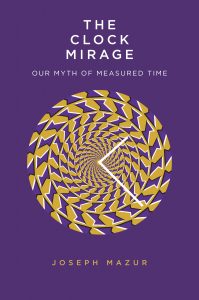 Joseph Mazur, The Clock Mirage: Our Myth of Measured Time
Joseph Mazur, The Clock Mirage: Our Myth of Measured Time
Yale University Press, April 21
Elusive, counter-intuitive (theoretically-speaking), and always looming over our heads, it is no wonder that time has been the repeated subject of contemplation of great thinkers as well as armchair philosophers. Professor of Mathematics Joseph Mazur tackles time from what seems, at first glance, a playful journey: he takes a “tour of clocks” and weaves together the personal stories of truck drivers and Olympic athletes, prisoners, and clockmakers in an effort to show how time is used by our technologies, subsumed by our bodies, and continually affecting our behaviors. Historical and analytical, Mazur’s investigation of time is sure to offer a lot of food for thought. –Eleni Theodoropoulos, Lit Hub Editorial Fellow
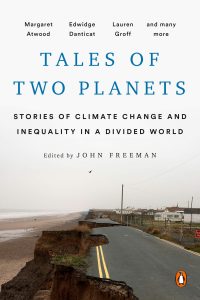 John Freeman, ed., Tales of Two Planets: Stories of Climate Change
John Freeman, ed., Tales of Two Planets: Stories of Climate Change
Penguin Press, April 21
We can no longer afford to separate issues of climate from issues of economic justice—the two are inextricably linked and we are doing a pretty terrible job managing both. You could even say it’s been a disaster. In the past few years we have seen much reported evidence of these disasters, in deeply researched, evidence-based books that recount doomsday scenarios with all the pragmatic clarity of a grocery list. But there is more than one way to write about climate change, as editor John Freeman demonstrates with this anthology of fiction, poetry, essay, and more, featuring writers like Margaret Atwood, Lauren Groff, Eka Kurniawan, Chinelo Okparanta, and others, all speaking to the shared calamity that is our collapsing world. –Jonny Diamond, Lit Hub Editor in Chief
 Rufi Thorpe, The Knockout Queen
Rufi Thorpe, The Knockout Queen
Knopf, April 28
Like her wonderful debut novel, The Girls from Corona del Mar, Rufi Thorpe’s latest, The Knockout Queen, focuses on the intensity of friendship. Two unlikely friends—a closeted gay teen named Michael Hesketh and his extremely tall next door neighbor Bunny Lampert—cope with the unfairness of life and the difficulty of existence. When an act of violence challenges their friendship, they must decide the lengths they will go to protect each other. –Emily Firetog, Lit Hub Deputy Editor
 Sara Sligar, Take Me Apart
Sara Sligar, Take Me Apart
MCD x FSG, April 28
I’m a huge fan of art world mysteries, as well as archival research, but this story should appeal to all fans of psychological thrillers. In Sligar’s confident debut, an out-of-work journalist takes on a job cataloguing the effects of feminist artist who died under mysterious circumstances. Hired by the artist’s brooding son, Sligar’s protagonist is not content to merely catalogue, and soon begins her own investigation into the artist’s demise, even as she finds herself falling for her current employer. –Molly Odintz, CrimeReads Associate Editor
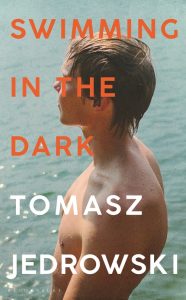 Tomasz Jedrowski, Swimming in the Dark
Tomasz Jedrowski, Swimming in the Dark
William Morrow, April 28
In O Magazine, Michelle Hart described this book as “Call Me By Your Name set in Communist Poland,” which immediately caught my interest. It is, of course, a love story, but it’s also a political one, as two young men fall in love (with a little help from Giovanni’s Room) one summer, but soon find themselves at intense political odds, even as they try to maintain their secret affair. –Emily Temple, Lit Hub Senior Editor
MAY
 Anna Solomon, The Book of V.
Anna Solomon, The Book of V.
Henry Holt, May 5
Anna Solomon’s novel follows three women across three centuries—Lily, a mother and wife (and writer—sometimes) in 2016 Brooklyn coping with what her life could or should have been; Vivian Barr, a perfect political wife dedicated to her husband’s success above her own self-respect; and Ester, a young woman in ancient Persia who becomes a sacrifice to the King in order to save her family. What does it mean to be a woman, across centuries? What does a woman owe her family versus what does she deserve for herself? –Emily Firetog, Lit Hub Deputy Editor
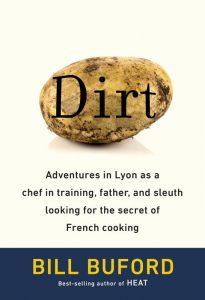 Bill Buford, Dirt
Bill Buford, Dirt
Knopf, May 5
Bill Buford has made a brilliant second career out of getting talented chefs to teach him to cook. Dirt begins at the beginning of this brilliant idea, when Buford and his wife, newly married and flush in love, quit their full-time magazine jobs and leave for Italy. But before long they have twins to think about, so Buford finagles a job learning French cuisine from Michel Richard and his crew at Citranelle, the year Richard won chef of the year (the Obamas celebrated their first date night there). What follows is a warm and funny and very delicious story about a man late in life falling in love with cooking. Buford’s always been an energetic, exquisite writer, but here there’s less Tom Wolfe in his prose and a lot more first-rate food writing. Once he arrives in Lyon for the serious instruction Dirt has really hit its stride, tasty and Dickensian in its characterizations and also ridiculous. Buford bumbles and humbles his way through some truly outstanding meals. In Heat, his 2006 memoir of learning from Mario Batali, there was quite a bit more about chef personality and vanity, big egos to go with big flavors. Most of that is gone here and what remains is sweet indeed. –John Freeman, Lit Hub Executive Editor
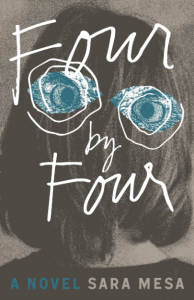 Sara Mesa, tr. Katie Whittemore, Four by Four
Sara Mesa, tr. Katie Whittemore, Four by Four
Open Letter, May 5
Gothic fiction continues to be interesting to writers not only for its obvious promise of thrills by way of haunted, impenetrable places and secrets, but for its rich narrative tradition that allows for experimentation with first-person narratives and deep psychological portraits. Sara Mesa’s gothic novel Four by Four takes place at Wybrany College, a type of stow-away school for rich kids, whose parents seek to protect them from the chaos of the cities. Gossip and tension are always lurking on the surface of the interactions at Wybrany, while “special,” scholarship students are disappearing. The first half of the novel establishes that something is very wrong, while the second half—in the form of diary entries of an imposter who has infiltrated the school—reveals why it is so. I am looking forward to see how Mesa has adapted the timeless themes of the gothic (e.g., isolationism, monstrosity, latent, toxic social structures) to a contemporary viewpoint and language. –Eleni Theodoropoulos, Lit Hub Editorial Fellow

Joe Sacco, Paying the Land
Metropolitan, May 5
The Economist called Joe Sacco the “heir to R. Crumb and Art Spiegelman,” and though his work is probably more in tune with the latter, Sacco is a talent entirely unto himself, applying an exquisitely fine eye for detail to the urgent histories that define the world around us, from Palestine to Bosnia. Now, Sacco brings that eye to the Mackenzie River Valley of the Canadian subarctic, specifically, to the lives of the Dene people, who’ve been in the area for centuries, and have likewise suffered generations of oppression and injustice in the wake of settler-colonial empire, which continues in the form of late-capitalist carbon extraction. Sacco, of course, has gone to see for himself the impact of the mining boom, and the long traumatic fallout of Canada’s “residential schools,” talking to elders and activists, trappers and priests, to get the full picture as only he can. –Jonny Diamond, Lit Hub Editor in Chief
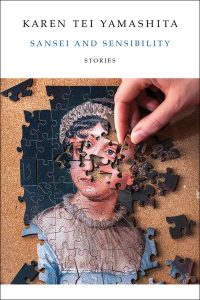 Karen Tei Yamashita, Sensei and Sensibility
Karen Tei Yamashita, Sensei and Sensibility
Coffee House, May 5
Karen Tei Yamashita is one of America’s great unsung geniuses. I, Hotel, a multi-character driven tale of housing in San Francisco and the people fighting for it, is a noisy modernist masterpiece that proves the novel really can accept everything you throw it—recipes, social commentary, crazy bento box construction—and not only hold up, but sing. In each one of her books Yamashita tries on a new construction technique. Here she’s mapped a series of stories onto the plots of Jane Austen novels, telling the tales of Japanese immigrants to the United States through the lens of their shared themes: inheritance, marriage, familial heritage. Entering her seventies, Yamashita is writing some of her finest stories yet. –John Freeman, Lit Hub Executive Editor
 Emma Straub, All Adults Here
Emma Straub, All Adults Here
Riverhead, May 5
Emma Straub is a master of the breezy, but still literary, family drama. Her fifth novel, in which a mother of three grown children experiences the emergence of a repressed memory that reframes her understanding of her kids’ childhood, promises to be another sprawling, big-hearted page-turner. –Jessie Gaynor, Social Media Editor
 Stephanie Danler, Stray
Stephanie Danler, Stray
Knopf, May 5
The first memoir from the author of Sweetbitter sounds quite dark: a childhood in a family of addicts, an inability to find happiness when publishing a bestseller, and a return to California after ten years, to find her mother depressed and handicapped after an aneurysm and her father addicted to crystal meth. And then there are those ten years—but there’s also light at the end of the tunnel. Danler is a deeply capable and captivating writer, and I’m sure this book will be a knockout. –Emily Temple, Lit Hub Senior Editor
 Ivy Pochoda, These Women
Ivy Pochoda, These Women
Ecco, May 5
In her last book, Wonder Valley, Pochoda presented her own distinct version of Los Angeles, populated by homeless people, middle-aged men in crisis, and a hippie commune in the desert. These Women looks like it also has indelible characters in a neighborhood in south LA who are all connected to the same man, and who are all in danger without knowing why. –Lisa Levy, CrimeReads Contributing Editor
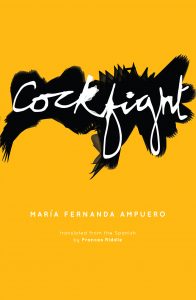 María Fernanda Ampuero, Cockfight
María Fernanda Ampuero, Cockfight
Feminist Press, May 5
María Fernanda Ampuero’s Cockfight, beautifully translated by Frances Riddle, is what happens when the line between love and violence wears thin. These thirteen stories paint a dark portrait of power and trauma, inflicted by hateful brothers, by criminal gangs. Cockfight is necessarily dark (brutal but not for the sake of being brutal), and it dares you to look away. You won’t be able to. –Katie Yee, Book Marks Assistant Editor
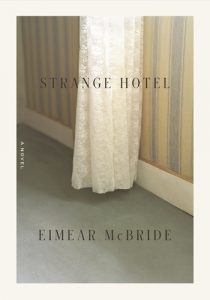 Eimear McBride, Strange Hotel
Eimear McBride, Strange Hotel
FSG, May 5
I’ve been looking forward to this novel ever since it was announced back in June. Considering it’s by McBride, the author of A Girl is a Half-Formed Thing, it’s sure to be a singular experience that no plot description will really illuminate, but the publisher calls it “the beguiling travelogue of a woman in exile: from her past, her ghosts, and herself,” which sounds pretty good to me. –Emily Temple, Lit Hub Senior Editor
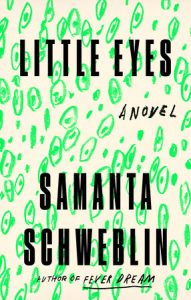 Samanta Schweblin, tr. Megan McDowell, Little Eyes
Samanta Schweblin, tr. Megan McDowell, Little Eyes
Riverhead, May 5
This brilliant and disturbing book resembles Margaret Atwood’s Handmaid’s Tale in how it speculates. The parts you think are made up are actually true. There are indeed wi-fi enabled robotic pets, animals who are cute and plugged in to the matrix, allowing people to talk across continents. But from this tiny detail Schweblin unspools a disquieting portrait of the dark sides of connectivity and the kinds of animalistic cyborgs it can make of us, as we walk through barriers that even spirits cannot cross. –John Freeman, Lit Hub Executive Editor
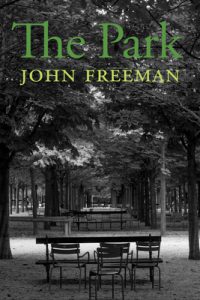 John Freeman, The Park
John Freeman, The Park
Copper Canyon, May 5
Our own John Freeman publishes his second collection of poetry in May—this one investigating and revolving around the city park (in particular the Luxembourg Gardens in Paris), its history and totems (“Almost all statuaries were killers;” one poem begins, “if on horseback, add ten thousand / to the toll.”), and all of the small (and global) human and animal dramas that play out within its limits. “A park’s purpose is to temper the machine in us,” Freeman writes. This is the perfect to take with you to your local park bench come spring, or whenever you need to recover a little humanity. –Emily Temple, Lit Hub Senior Editor
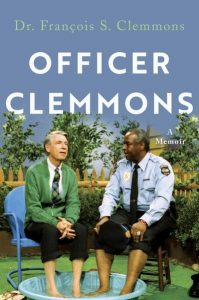 François Clemmons, Officer Clemmons: A Memoir
François Clemmons, Officer Clemmons: A Memoir
Catapult, May 5
François Clemmons played Officer Clemmons on Mister Rogers (making him the first African American with a recurring role on a children’s program) which would be reason enough for me to want to read his memoir. But Clemmons’ life beyond his work on the show, and his friendship with Fred Rogers (who, unfortunately, advised him to marry a woman rather than accept that he was gay) was fascinating, as well. And not for nothing, he’s also a Grammy Award-winning singer who has performed with operas across the country. –Jessie Gaynor, Social Media Editor
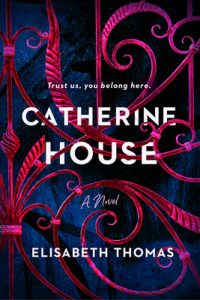 Elisabeth Thomas, Catherine House
Elisabeth Thomas, Catherine House
Custom House, May 12
I might be speaking for myself (even if the demand for this list says otherwise) when I say that campus novels, with their flair of the gothic and use of mystery, are a kind of guilty pleasure, and have come to claim a category of their own. Catherine House by Elizabeth Thomas takes place in a secluded liberal arts university that admits a select, elite group of students and promises the highest caliber of education and ensuing professional success if only: its students will spend three years there, renouncing every other connection they have to the outside world. The young protagonist Ines Murillo is initially thrilled to attend, but then comes to sense evil lurking behind the Draconian laws of the school. The debut novel has been likened to the works and atmosphere of Kazuo Ishiguro and Sarah Waters, and if the plot itself were not enough to lure me in, this certainly does not hurt. –Eleni Theodoropoulos, Lit Hub Editorial Fellow
 Emma Jane Unsworth, Grown Ups
Emma Jane Unsworth, Grown Ups
Gallery/Scout Press, May 12
Unsworth’s follow up to Animals is Grown Ups (which is being published as Adults in the UK, where it comes out in January) is being described as “Fleabag meets Conversations with Friends” and also “a neurotic dramedy of 21st-century manners for the digital age,” which are pretty much the same thing, the same thing being just what I want to read when I need to get away from the internet, and/or myself, and/or all my friends. –Emily Temple, Lit Hub Senior Editor
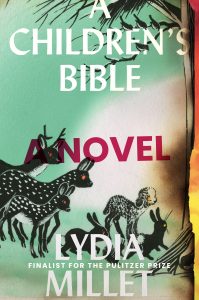 Lydia Millet, A Children’s Bible
Lydia Millet, A Children’s Bible
Norton, May 12
I loved Lydia Millet’s last collection of short stories, Fight No More, (along with her classic, Love in Infant Monkeys) and I honestly think she should be much more famous. If you think it’s hard to find original voices in contemporary fiction, you’re not really reading properly—Millet is one such voice: comic, erudite, humane. I look forward to fighting with my colleagues over her forthcoming novel, A Children’s Bible, an apocalyptic runaway tale that pits a group of children against the chaotic, broken-down world made for them by their parents. Sound familiar? –Jonny Diamond, Lit Hub Editor in Chief
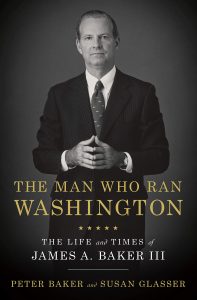 Peter Baker and Susan Glasser, The Man Who Ran Washington: A Life of James A. Baker
Peter Baker and Susan Glasser, The Man Who Ran Washington: A Life of James A. Baker
Doubleday, May 12
James A. Baker may forever go down as the political fixer called in to organize the Republican campaign to stop the recount in Florida during the 2000 election. But he had already had a long and highly wired career in Washington, running five (!) presidential campaigns prior to Bush vs. Gore. This deeply researched biography tells of his life, from Texas aristocracy to the tennis courts of a country club, where he met George Herbert Walker Bush, to a family tragedy that called him in to public service. In our time of outright party thugs and hacks, Baker’s career looks almost genteel, but he could be hard and play rough, as the recount made clear. While it’s inspiring to see how much he reached across the aisle and worked with Democrats, and negotiated with former adversaries as Secretary of State, somehow it’s not hard to come to the conclusion that his 2000 election performance made clear that win at all costs would become the way forward for his party. –John Freeman, Lit Hub Executive Editor
 Jenny Zhang, My Baby First Birthday
Jenny Zhang, My Baby First Birthday
Tin House, May 12
I first found Jenny Zhang through her debut short story collection, Sour Heart, which captures all these weird, beautiful, funny, and intimate angles of the first-generation Chinese-American immigrant experience. It’s a gift to look through her sharp and delightfully surprising lens again. In My Baby First Birthday, she returns to poetry to scratch at survival, innocence, nurturing, being a woman, and being alone. –Katie Yee, Book Marks Assistant Editor
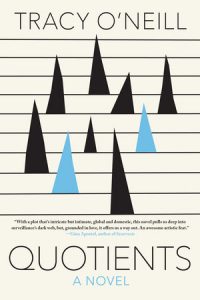 Tracy O’Neill, Quotients
Tracy O’Neill, Quotients
Soho, May 12
I’m a huge fan of Tracy O’Neill’s work, which always manages to be both cerebral and propulsive, tension-filled and deeply thoughtful. She’s a marvelous writer with sublime descriptive powers who also knows how to blend big ideas with intimate, nuanced characterizations. Her first novel, 2015’s The Hopeful, was the story of the psychological collapse of an injured figure skating prodigy. This year’s follow-up, which I am dying to read, is an epic saga about two people trying to leave behind their shadowy former professions and build a new life together “in a world of fractured identities and aliases, global finance, big data, intelligence bureaucracies, algorithmic logic, and terror.” –Dan Sheehan, Book Marks Editor
 Olivia Laing, Funny Weather: Art in an Emergency
Olivia Laing, Funny Weather: Art in an Emergency
Norton, May 12
Does Olivia Laing always seem to have a book coming out or is it just me? Toward the end of 2018 it was Crudo, her rapid-fire novel of one summer’s news cycles, and before that it was the marvelous The Lonely City, a memoir-cum meditation on what it means to exist in solitude surrounded by millions of people. Laing’s latest, Funny Weather: Art in an Emergency makes the case for art in a time of perpetual crisis, proffering it less as a solution to the endless tumult of manmade disaster but rather an antidote to the pervasive poisons of modern life. –Jonny Diamond, Lit Hub Editor in Chief
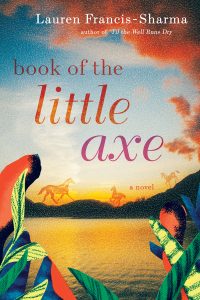 Lauren Francis-Sharma, Book of the Little Axe
Lauren Francis-Sharma, Book of the Little Axe
Grove, May 12
The protagonist of Book of the Little Axe is Rosa Rendón, a native of Trinidad who, ahead of her time in the year 1796, rebels against the antiquated divisions of labor of her hometown. Rather than dedicate her life’s efforts to cooking and keeping house, she is only passionate about running the family farm. However, the future she envisioned for herself is upended when her homeland switches from Spanish to British rule, a circumstance which endangers not only the assets of families of free black property owners like her own, but their very freedom. Decades later, Rosa is living in the Crow Nation of Bighorn, Montana, with her children and husband, and must relive the hardest moments of her life if she is going to help her son, Victor, become his own person. The novel’s prose and research has been praised for its adept and poignant historical narrative; it delves into the struggles of Native and African peoples at the time of colonial expansion. Book of the Little Axe seems like a necessary read at a time when power, identity, nationality are still used to oppress and divide. –Eleni Theodoropoulos, Lit Hub Editorial Fellow
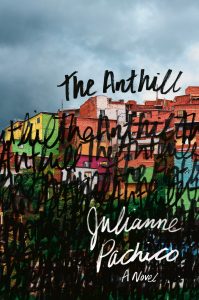 Julianne Pachico, The Anthill
Julianne Pachico, The Anthill
Doubleday, May 12
In The Anthill a homecoming becomes a haunting. Julianne Pachico’s protagonist, Lina, returns to her childhood home, Colombia, 20 years after being sent away to England. Upon her return, Lina looks for answers about her mother’s death. In an attempt to reconnect to her past and the land, she seeks out her childhood friend Matty who runs The Anthill—a daycare providing refuge for the street kids of Medellín. But Medellín and Matty seem to have changed, moving farther and farther away from the past, which Lina finds both disturbing and confusing amidst her quest for self-discovery. Strange things begin to happen at The Anthill, including ghostly sightings, with which Lina must reckon. Pachico has been praised by The New York Times Book Review for her “blunt, fresh, and unsentimental” writing, and the novel is said to be a hallucinatory ride in the company of The Vegetarian and Friday Black. As a fan of reading between the lines of a good-old literary ghost story, I am looking forward to this one. –Eleni Theodoropoulos, Lit Hub Editorial Fellow
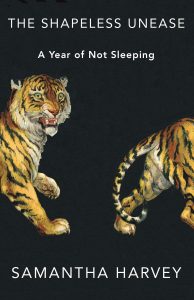 Samantha Harvey, The Shapeless Unease: A Year of Not Sleeping
Samantha Harvey, The Shapeless Unease: A Year of Not Sleeping
Grove, May 12
You’re not the only one not sleeping. For a year, the novelist Samantha Harvey was in her own extended fugue state of waking dreamlessness. This diary like book chronicles its unraveling effects on her, and finds a thin pure line in the small hours to think on the big issues that may be making it worse. In a time of circadian chaos, this book feels at once like a symptom and its balm. –John Freeman, Lit Hub Executive Editor
 Charlie Kaufman, Antkind
Charlie Kaufman, Antkind
Random House, May 12
Being John Malkovich and Adaptation are tied for my favorite movie, so I’m thrilled that Charlie Kaufman, who wrote both of those screenplays, has now also written a novel. Novels are like low-tech screenplays! Antkind is about a “neurotic and underappreciated film critic (failed academic, filmmaker, paramour, shoe salesman who sleeps in a sock drawer)” (sold) who finds unseen, and brilliant, film—”possibly the greatest movie ever made”—which is then destroyed. It sounds bonkers and hilarious and deeply human. It’s also apparently a “searing indictment of the modern world,” which I think is a pretty welcome sentiment right about now. –Jessie Gaynor, Social Media Editor
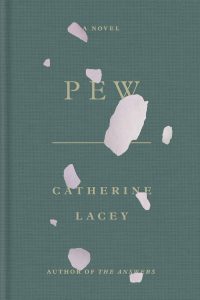 Catherine Lacey, Pew
Catherine Lacey, Pew
FSG, May 12
In the latest novel from the author of Nobody is Ever Missing and The Answers, an unidentified person—apparently genderless, raceless, and voiceless—appears on a pew in a small church whose congregation is busy preparing for something called the Forgiveness Festival. One of the members takes the person in, naming them “Pew.” But of course, when a person has no characteristics, the folks around may put whatever they want onto them—or simply grow to fear and despise them for being unknowable. –Emily Temple, Lit Hub Senior Editor
 Jim Newton, Man of Tomorrow
Jim Newton, Man of Tomorrow
Little, Brown, May 12
Jerry Brown has always been a fascinating politician, a little too regionally… weird (?) for the national stage, but somehow perfect for California, where his father served as governor in the 1960s. After serving as governor himself in the 1970s, Brown returned 28 years later to oversee something of a west coast renaissance, doubling down on a defense of both the climate and the right of immigrants (of all kinds) all while overseeing an economic boom. A longtime editor and writer for the Los Angeles Times, Jim Newton tells Brown’s story, finding in it the seeds of possibility for an America that is truly great. –Jonny Diamond, Lit Hub Editor in Chief
 Richard Ford, Sorry for Your Trouble
Richard Ford, Sorry for Your Trouble
Ecco, May 12
The latest short story collection from the decorated and prolific Ford takes us from Mississippi to Canada to New Orleans in the author’s usual lucid, moving prose. Another thing he is prolific at? Feuds. –Emily Temple, Lit Hub Senior Editor
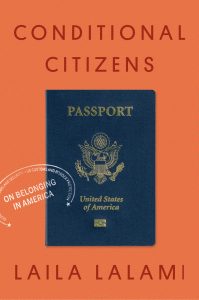 Laila Lalami, Conditional Citizens
Laila Lalami, Conditional Citizens
Pantheon, April 28
Laila Lalami’s previous books The Moor’s Account and The Other Americans brought a nuanced understanding to the ways that the myths of the American dream leave many of its residents, and in particular immigrants, by the wayside. Lalami has told Lit Hub that her work “is concerned with the transformation of identity, and how migration contributes to that transformation.” Now, with Conditional Citizens, Lalami brings this lens to a work of nonfiction that explores the reality of citizenship for those that are still disenfranchised by patriarchal, white supremacist institutions in the US, along with the power systems that work to maintain those institutions. –Corinne Segal, Lit Hub Senior Editor
 Karolina Waclawiak, Life Events
Karolina Waclawiak, Life Events
FSG, May 19
I’ve been a fan of Waclawiak’s work and her gimlet eye ever since I read her strange and delightful debut How to Get Into the Twin Palms, so I’m very much looking forward to her latest novel. In Life Events, a woman at a crossroads becomes an “exit guide,” taking on the task of helping terminally ill patients to make decisions about their own deaths—which inevitably leads to a series of strange encounters. Lydia Kiesling called it “a hypnotic novel that beautifully grapples with fundamental questions about how to die and how to live,” and that’s about all I’m interested in these days. –Emily Temple, Lit Hub Senior Editor
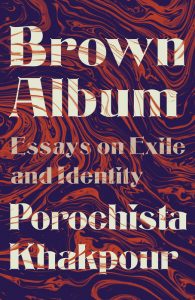 Porochista Khakpour, Brown Album
Porochista Khakpour, Brown Album
Vintage, May 19
The latest book from the author of Sick, The Last Illusion, and Sons and Other Flammable Objects collects essays about her experiences escaping the Iranian Revolution and winding up with her family in LA, growing up as an Iranian American, and living through 9/11—and the Trump presidency so far. There are essays from the last decade of Khakpour’s writing life here, as well as new work; she’s always a striking voice, and one we should heed. –Emily Temple, Lit Hub Senior Editor
 Suzanne Collins, The Ballad of Songbirds and Snakes
Suzanne Collins, The Ballad of Songbirds and Snakes
Scholastic, May 19
Do I really need to say more than “new novel set in the expanded Hunger Games universe”? Fine: The Ballad of Songbirds and Snakes takes place 64 years before the events of The Hunger Games trilogy, on the morning of the reaping for the tenth Hunger Games. That is all I know, and all I need to know. –Jessie Gaynor, Social Media Editor
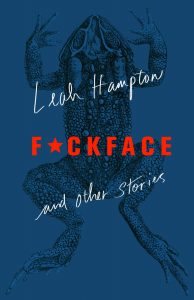 Leah Hampton, F*ckface
Leah Hampton, F*ckface
Henry Holt, May 19
Leah Hampton writes about “Appalachia, corpses, rurality, and smart women,” as says her bio, a fact which her debut collection F*ckface corroborates. F*ckface sure has grit—complemented by great compassion, wit, and ingenious connections between startlingly unrelated subjects. The title story features a queer young woman who comes to learn more about herself than she expected: it turns out she has more in common with the dead bear behind the store where she works than she ever would have thought. “Meat” is set during a funeral: “It was early autumn, that hushed, forthright season, and the chapel hummed with good, clean, true grief.” The protagonist Allison, a student of agriculture, is visiting her uncle, who takes it upon himself to tell the community about his niece’s undertakings. Hampton switches the narrative between the funeral (“The air in the church was dense with flesh.”) and Alison’s hellish, past internship in the slaughterhouse—both of which share an atmosphere of squalor that makes the reader squirm, while marveling at Hampton’s piercing prose. Leah Hampton really sees people. So this allows her, without any pretenses, to deliver a hell of a story. –Eleni Theodoropoulos, Lit Hub Editorial Fellow
 Barton Gellman, Dark Mirror: Edward Snowden and the American Surveillance State
Barton Gellman, Dark Mirror: Edward Snowden and the American Surveillance State
Penguin Press, May 19
Barton Gellman was one of the journalists to which Edward Snowden reached out as he leaked a cache of NSA documents, in the process becoming one of the most infamous whistleblowers in US history. In Dark Mirror, Gellman, who shared a Pulitzer with Glenn Greenwald and Laura Poitras for their reporting on Snowden, adds new details to the story of those documents, which instigated a major debate about surveillance, privacy, and government overreach in the US. The story also promises to offer a new perspective on the state of investigative journalism and more details about a complicated, fascinating reporter-source relationship. –Corinne Segal, Lit Hub Senior Editor
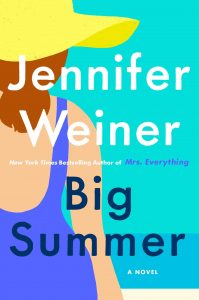 Jennifer Weiner, Big Summer
Jennifer Weiner, Big Summer
Simon & Schuster, May 19
Jennifer Weiner writes tremendously enjoyable books that hit me in the same pleasure center as romantic comedies do, so I’m very excited for her latest novel, set in the midst of a “lavish society wedding” on Cape Cod. Friendship, weddings, and rich people being weird? Obviously I am in. –Jessie Gaynor, Social Media Editor
 Ilana Masad, All My Mother’s Lovers
Ilana Masad, All My Mother’s Lovers
Dutton, May 26
Ilana Masad’s debut novel held my attention as early as its title, All My Mother’s Lovers, which renders a wit and promise of complication that makes for exciting reading. Maggie Krause, triggered by her mother’s death, returns home to find the remainder of her broken family and unveil the circumstances of her mother, Iris’s, death. Maggie, who carries the burden of a fraught mother-daughter relationship, follows the breadcrumbs of Iris’s will and sets off to deliver the five letters her mother addressed to unknown men. Maggie discovers that her mother had a secret life. In turn, she must deal with what her mother’s death has left behind, including her anger at Iris’s overt disapproval of her sexuality. The narrative unfolds over a funeral and shiva and will tackle identity from many angles: the familial, the sexual, the repressed, the hopeful. –Eleni Theodoropoulos, Lit Hub Editorial Fellow
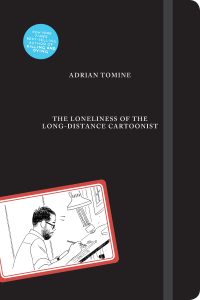 Adrian Tomine, The Loneliness of the Long-Distance Cartoonist
Adrian Tomine, The Loneliness of the Long-Distance Cartoonist
Drawn & Quarterly, May 26
Adrian Tomine’s latest is a kind of sketchbook and autobiography at once, or probably as close to it as he’ll ever come. It goes back to his childhood, when a medical illness laid him up and he discovered the pleasures of comics. From there grew a love and obsession and great talent. But Tomine’s always had a foot out the side comic world, something that has become clearer as his lusciously plain, moody panels have become mainstays of the New Yorker and elsewhere. This book, in its own way, will take you behind the scenes of that artistic coherence and equipoise to show the author himself tumbling into parenthood and midlife the way many of us do, by accident and in a state of bewilderment. –John Freeman, Lit Hub Executive Editor
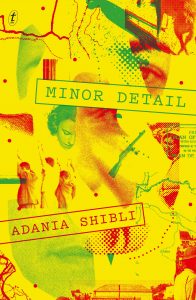 Adania Shibli, tr. Elisabeth Jaquette, Minor Detail
Adania Shibli, tr. Elisabeth Jaquette, Minor Detail
New Directions, May 26
In this shattering novel, Adania Shibli tells the tale of the brutal rape and murder of a Palestinian woman by Israeli soldiers in the Negev. They bury her in the sand and leave her behind. Decades later, Shibli’s unnamed narrator becomes fascinated with this crime and its victim, who was killed 25 years to the day before she was born. Moving between these two stories, Shibli has written a acutely disturbing novel, a book of violence and its aftermath, her prose as fine and chiseled as ever. –John Freeman, Lit Hub Executive Editor
JUNE
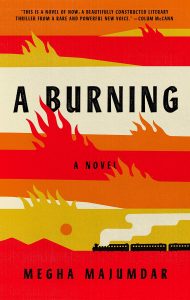 Megha Majumdar, A Burning
Megha Majumdar, A Burning
Knopf, June 2
Megha Majumdar’s debut novel centers on three characters—a young woman living in the slums in contemporary India, a gym teacher, and a social outcast dreaming of another life—who find themselves connected after a terrorist attack shakes the foundation of all their lives. A Burning narrates their stories against the backdrop of some of India’s most pressing social and political issues, including Hindu nationalism and the promises of upward mobility. Having followed Majumdar’s work as an editor at Catapult, I couldn’t be more excited to read the perspective and sensitivity that she’s sure to bring to these characters and the challenges they face. –Corinne Segal, Lit Hub Senior Editor
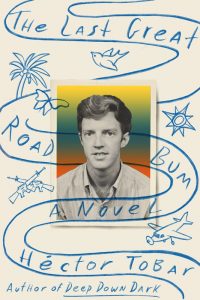 Héctor Tobar, The Last Great Road Bum
Héctor Tobar, The Last Great Road Bum
MCD, June 2
As a reporter and novelist, Héctor Tobar often acts as a biography in miniature. In his fantastic—and ought to be rereleased—travelogue, Translation Nation, he criss-crossed America, interviewing Latinx people and retelling their stories, how they came to where they lived, what they did, how life seemed to them. The speed and respect and sensitivity with which Tobar can encapsulate a life, whether its a trapped Chilean miner, as in his Deep Down Dark, or a domestic worker just trying to get children to safety, as in his fantastic 2011 novel, Barbarian Nurseries, is dazzling.
Finally Tobar is back to fiction in The Last Great Road Bum and he’s written a kind of inside out version of one of his books. It tells the tale of a real life white man from Illinois, Joe Sanderson, who spent most of his life traveling the globe, from Vietnam to El Salvador, where he wound up finding (and dying) with Che-inspired guerillas. Tobar first wrote about the story in an LA Times column, he has now turned into a highly absorbing and thought provoking novel about the forces that can blow a person sideways through life. Drawing from Sanderson’s letters, the novel thinks who gets to tell stories as it probes the lines between myth and reality. This is first rate fiction from a writer who deepens the sky with every book he writes. –John Freeman, Lit Hub Executive Editor
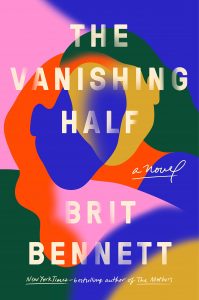 Brit Bennett, The Vanishing Half
Brit Bennett, The Vanishing Half
Riverhead, June 2
The New York Times bestselling author of The Mothers is back with a multi-generational saga of identical twin sisters living in a small southern black community in the 1950s who run away from home at the age of sixteen to embark upon very different lives. Ten years on from their flight, one is back living with her black daughter in the same town from which she once escaped. The other is passing for white, keeping her past a secret from her new husband. Early buzz suggests that this new novel is every bit as moving and thought-provoking as Bennett’s acclaimed debut. –Dan Sheehan, Book Marks Editor
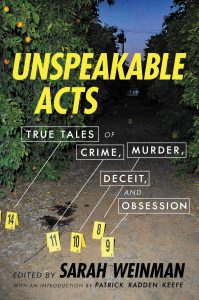 Sarah Weinman, Unspeakable Acts
Sarah Weinman, Unspeakable Acts
Ecco, June 2
This anthology of contemporary true-crime writing, edited by the incomparable Sarah Weinman, contains thirteen short pieces of high-caliber journalism that shook the culture and helped inspire today’s true-crime phenomenon. With pieces by Michelle Dean, Pamela Colloff, and with an introduction by Patrick Radden Keefe, this book will be sure to rivet you again and again. –Olivia Rutigliano, CrimeReads Editorial Fellow
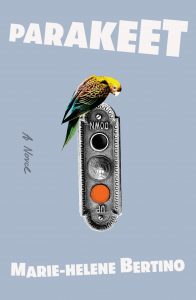 Marie-Helene Bertino, Parakeet
Marie-Helene Bertino, Parakeet
FSG, June 2
This uncanny, darkly comic novel was the first book I read in the year of our lord 2020 and let me tell you: it is an absolute gem. Warm and weird, full of brilliant observations and entrancing, unnerving surrealist touches. It begins with a young woman, sitting alone in a hotel room four days before her wedding, whose dead grandmother appears before her in the form of a parrot. The grandmother-parrot warns her not to get married, and commands her to seek out her estranged brother, a reclusive playwright who made his name with a play about his sister’s troubled childhood. In the days that follow, the bride’s journey to the altar becomes a rabbit-hole descent, both bizarre and profound, into both her past and her beguilingly troubled psyche. –Dan Sheehan, Book Marks Editor
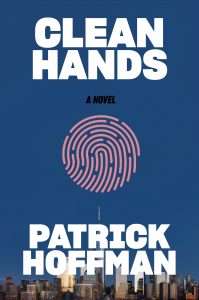 Patrick Hoffman, Clean Hands
Patrick Hoffman, Clean Hands
Grove, June 2
In this clever thriller by private detective turned crime writer Patrick Hoffman, ex-CIA officer Valencia Walker and corporate lawyer Elizabeth Carlyle must team up when Carlyle’s firm becomes the target of theft and blackmail, all leading to something must darker. As documents are slowly leaked to the press and tragic events begin happening, Walker and Carlyle know they do not have long to follow the paper trail and and catch a sinister agent of destruction. Also, this book has an excellent cover. Just saying. –Olivia Rutigliano, CrimeReads Editorial Fellow
 David Mitchell, Utopia Avenue
David Mitchell, Utopia Avenue
Random House, June 2
Galleys are as hard to find as Mitchell’s own cameo in the Sense8 tv series (he’s there!), but David Mitchell’s first novel in five years sounds highly promising. It plans to unfurl the story of a band called Utopia Avenue, a group that emerges in the psychedelic scene of the mid to late 1960s in London. Mitchell follows them as they rise up the charts with two albums and then split up at the point when free love and all that jazz curdled to something else, especially when the state found brutal ways to crack down on it. How do we get beyond ourselves, in drugs, or music, what tools do we use; how we change the world? –John Freeman, Lit Hub Executive Editor
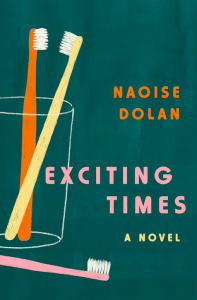 Naoise Dolan, Exciting Times
Naoise Dolan, Exciting Times
Ecco, June 2
Your next read in the exploding canon of books with ironic, enigmatic, borderline emotionless (but actually not really) female narrators should be Naoise Dolan’s Exciting Times (I mean just the title is impossibly ironic—I feel it should only be spoken in that certain dry tone, you know the one), in which Ava, a young Irish woman living in Hong Kong, is kind of sort of dating an English banker, Julian, and then is swept off her feet by a Hong Kong-born lawyer, Edith. But even though there is technically a love triangle, this novel is not really about that—it’s about class, and self-conception, and language, and love, but most importantly, it’s one of those you could read and read without anything having to happen at all, because it’s fascinating—and satisfying—to sit inside Ava’s mind, and watch what happens there. –Emily Temple, Lit Hub Senior Editor
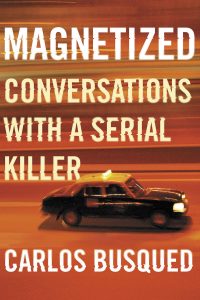 Carlos Busqued, tr. Samuel Rutter, Magnetized
Carlos Busqued, tr. Samuel Rutter, Magnetized
Catapult, June 2
Serial killers will never not be compelling, but we risk much when we seek in them entertainment and diversion without considering what the darkness means, or where it comes from. In Magnetized, Carlos Busqued seeks after some of that meaning in his conversations with Argentine serial killer Ricardo Melogno, who was convicted for the 1982 murders of four Buenos Aires taxi drivers, each one committed with cold precision. Busqued bolsters his conversations with forensic reports and newspaper stories, revealing a life lost before it has really begun, and the tragedy it visits upon the world. –Jonny Diamond, Lit Hub Editor in Chief
 Edward Ball, Life of a Klansman
Edward Ball, Life of a Klansman
FSG, June 2
Just over 20 years ago Edward Ball won a National Book Award for his profoundly good memoir, Slaves in the Family. That it did not spawn a similar reckoning among southerners—as Gunter Grass’s memoir did with Germans, who found their own families full of Nazi pasts—should have earned more attention. One of the great things about that book was the way Ball made it a story driven by the lives of those his family had, in essence, erased. Now in his biggest book since then, Ball has written a biography of his great-great-grand-father, who was active in the Klu Klux Klan in Louisiana after the Civil War, a man who on the outside appeared to be living a mundane existence. But who in reality had committed himself to spreading racial terror in the most hateful and violent ways. This is a disturbing and powerful book that shines a much needed light on the roots of white supremacy. –John Freeman, Lit Hub Executive Editor
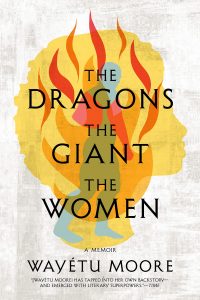 Wayétu Moore, The Dragons, the Giant, the Women
Wayétu Moore, The Dragons, the Giant, the Women
Graywolf, June 2
The first memoir from the author of She Would Be King tells the story of Moore’s experiences as a child during the Liberian Civil War, and her new life in Texas—with a magical realist twist (as befits the mind of a five year old during massive upheaval). In an interview, Moore said that she hoped the book might “give a new perspective to the African war story that isn’t about some aid worker who came in and saved us, and we weren’t in a refugee camp. This was my dad doing what he could to make sure we were safe, my mom risking everything to go back, and this network of women soldiers that created a business trafficking people’s families out of the country when no one was allowed out of the country at the time.” –Emily Temple, Lit Hub Senior Editor
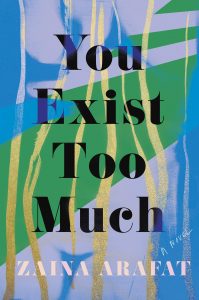 Zaina Arafat, You Exist Too Much
Zaina Arafat, You Exist Too Much
Catapult, June 9
The title of Palestinian American writer Zaina Arafat’s novel echoes a bit of dialogue between the protagonist and her mother. When the young woman intimates to her mother that she is queer, her mother replies, “You exist too much.” The narrator subsumes the weight of her mother’s words, a stress that is added to the one incident that has followed her throughout her childhood and has made her feel shame and embarrassment for merely existing in her body.
Arafat tells the woman’s story by switching between cities, like New York, where she currently lives as a successful DJ and writer, and the Middle East (e.g., Palestine and Lebanon); this kind of narrative accentuates the narrator’s sense of disorientation and search for home. At the same time, in looking for love, the narrator bounces between lovers and obsessions and ultimately is diagnosed with “love addiction.” Told with sympathy and what seems like, some irony, You Exist Too Much intrigues me for its multiculturalism and dissection of the notion that romantic love can be an all-bearing measure of personal fulfillment. –Eleni Theodoropoulos, Lit Hub Editorial Fellow
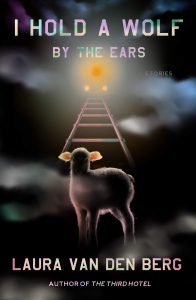 Laura van den Berg, I Hold a Wolf By the Ears
Laura van den Berg, I Hold a Wolf By the Ears
FSG, June 9
On the heels of her 2018 novel The Third Hotel—a brilliant, mesmerizing grief odyssey in the spirit of Pedro Páramo and David Lynch that I couldn’t shake for days after finishing—Laura van den Berg’s ghostly new short story collection confronts “misogyny, violence, and the impossible economics of America” though a focus on women teetering over the edge. Already named one of the most anticipated books of 2020 by Entertainment Weekly, Oprah Magazine, and the BBC, readers of I Hold a Wolf by the Ears can expect more of van den Berg’s vivid atmospherics, bitingly dark humor, and grimly profound meditations on the human condition. –Dan Sheehan, Book Marks Editor
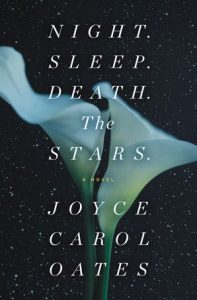 Joyce Carol Oates, Night. Sleep. Death. The Stars.
Joyce Carol Oates, Night. Sleep. Death. The Stars.
Ecco, June 9
The latest novel from the extraordinarily prolific Joyce Carol Oates explores a family’s complicated reaction to the death of its patriarch. According to its publisher, it is also “a vivid exploration of race, psychological trauma, class warfare, grief, and eventual healing, as well as an intimate family novel in the tradition of the author’s bestselling We Were the Mulvaneys.” –Emily Temple, Lit Hub Senior Editor
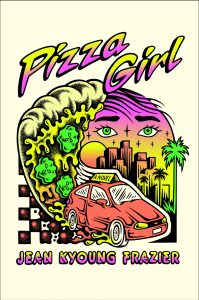 Jean Kyoung Frazier, Pizza Girl
Jean Kyoung Frazier, Pizza Girl
Doubleday, June 9
In Pizza Girl, our hero is a pregnant 18-year-old pizza delivery girl, working in the suburbs of Los Angeles, going through life with a kind of tunnel vision. She’s putting all thoughts of her future on hold and fixating on a customer, a mother who’s just moved into the neighborhood. If you like obsessive narrators, if you like quirky coming-of-age arcs, if you like stories about people in deep denial about their realities, if you like unlikely female friendships that blur boundaries (think: Miranda July’s The First Bad Man), if you like pizza—you’ll probably enjoy Jean Kyoung Frazier’s Pizza Girl. It’s got heart and heartbreak and a whole lot of humor to boot. –Katie Yee, Book Marks Assistant Editor
 Elena Ferrante, tr. Ann Goldstein, The Lying Life of Adults
Elena Ferrante, tr. Ann Goldstein, The Lying Life of Adults
Europa, June 9
We know very little about this book except that it has a crushing opening line. “Two years before leaving home my father said to my mother that I was very ugly.” In June we can read the rest. –John Freeman, Lit Hub Executive Editor
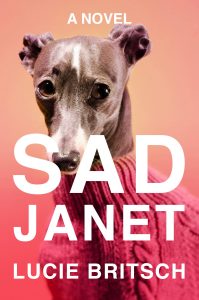 Lucie Britsch, Sad Janet
Lucie Britsch, Sad Janet
Riverhead, June 16
First of all, the cover makes me laugh. Second of all, “a blackhearted comedy about doctors, dating, dogs, and depression”? How did the book gods know that was exactly what I wanted to read this summer? –Emily Temple, Lit Hub Senior Editor
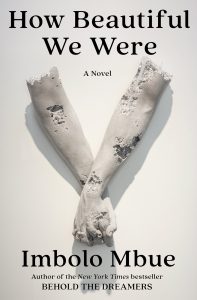 Imbolo Mbue, How Beautiful We Were
Imbolo Mbue, How Beautiful We Were
Random House, June 16
This extraordinary novel reads like an update of Things Fall Apart in the era when multinational oil companies are the new colonial rulers. In the book, Mbue shows what happens when a diverse cast of people living in a village decide to stand up to an oil conglomerate taking over their area, destroying their land. Whereas Mbue’s PEN/Faulkner winning debut Behold the Dreamers moved with deceptive lightness, this novel is a powerful indictment of the world such companies leave behind. Children are dying from drinking polluted water. Reparation payments are promised and then shrugged off. A generation was made in this climate, Mbue’s book reveals, and we see this up close through the story of a girl named Thula, who grows up to be a revolutionary. –John Freeman, Lit Hub Executive Editor
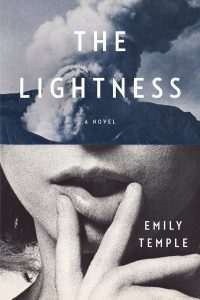 Emily Temple, The Lightness
Emily Temple, The Lightness
William Morrow, June 16
If there is any justice in the literary world, this spellbinding novel by Lit Hub’s own Emily Temple will be one of the most acclaimed debuts of 2020. The Lightness is the story of Olivia, a teenage girl who enrolls herself in a program for troubled youths at the same Buddhist meditation center from which her adored father disappeared a year previous. Once there, she falls in with a trio of mysterious girls, led by the alluring and unhinged Serena, who are determined to master the art of levitation at any cost. Darkly stylish, full of verve, acerbic wit, and shimmering intelligence, Temple’s debut is a mesmeric and unflinching exploration of adolescent female friendship and awakened sexual desire, as well as a fiery meditation on the obliterative nature of unwavering faith. Perhaps most impressively for a debut (for any novel, in fact): every sentence sings. If Donna Tartt rewrote The Craft as a novel, it might look something like this fierce, extraordinary work. –Dan Sheehan, Book Marks Editor
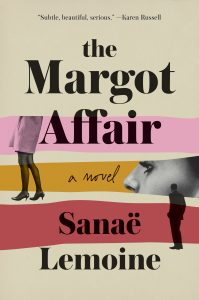 Sanae Lemoine, The Margot Affair
Sanae Lemoine, The Margot Affair
Hogarth, June 16
Margot Louve, the illegitimate daughter of a French politician and a famous actress, has decided that she will no longer live her life as a secret. Determined to reveal the truth, she befriends a journalist willing to help her. But in exposing her family’s truth, the adult world of deceit, desire, and transgression reveals itself to be more complicated than she could have imagined. –Emily Firetog, Lit Hub Deputy Editor
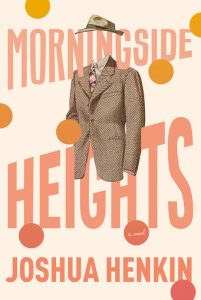 Joshua Henkin, Morningside Heights
Joshua Henkin, Morningside Heights
Pantheon, June 16
The latest novel from beloved writer’s writer (and director of the Brooklyn College MFA in fiction) Joshua Henkin is the tender, graceful story of a family, from its beginnings, when a young woman comes to New York City in the 70s and falls in love with her Shakespeare professor, through its hardships, as the couple falls apart in more ways than one, and its recoveries, when a long lost son may just save his father’s life. –Emily Temple, Lit Hub Senior Editor
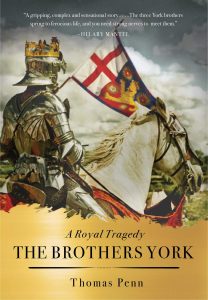 Thomas Penn, The Brothers York
Thomas Penn, The Brothers York
Simon & Schuster, June 16
This thrilling biography of the three sons of the Duke of York—who fought won and lost the War of Roses—proves that Thomas Penn is among the most gifted historians at work in England today. It would be shocking if this book isn’t adapted for a mega series, with the drama of its family so potent, the details of their lives so freshly seen here. The fate of their country—plague wracked, underfunded, in search of cash—so knife’s edged. Edward IV was a teenager who’d never led an army and who suddenly through power of will and magnetism did so with awesome force. His physicality was so absurd as to be a kind of mania, from the sheer volume of sexual partners he took, to the way he constructed a variety of diets and diuretics to allow him to purge and gorge. In spite of it all, it was Edward’s feats of mind and cleverness as a ruler though that outlast him, shining a dim light on his younger brother, George, Duke of Clarence, who never expanded his territory or even attained the title of king. His failure to launch makes this a familiar family drama, complete with the youngest, Richard, whose brief two-year reign was as tumultuous as his brothers. This is juicy, impeccably researched work that ought to earn Penn a massive audience. –John Freeman, Lit Hub Executive Editor
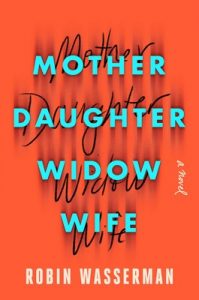 Robin Wasserman, Mother Daughter Widow Wife
Robin Wasserman, Mother Daughter Widow Wife
Scribner, June 23
It only makes sense that Robin Wasserman is also a television writer since Mother Daughter Widow Wife opens with a premise that is reminiscent of many a bingeable-thrillers. Wendy Doe is found aboard a Peter Pan bus to Philadelphia with no memory of her life or identifying information on her. She is admitted to the state, where medical professionals give her a name and diagnosis and wait to see if her memory will return. Viewing her as a fine specimen for experimental observation, a Dr. Benjamin seizes the opportunity to take her into his lab and study her. Through the respective actions and viewpoints of Dr. Benjamin, his ambitious student Lizzie, and Wendy’s daughter Alice, the reader comes to see projected onto Wendy Doe a plethora of expectations of womanhood. For those who are fans of thriller tropes as well as deeper questions like, the concept and nature of identity itself—whether it is socially constructed, individually fashioned, ingrained or created—this one should be on your radar. –Eleni Theodoropoulos, Lit Hub Editorial Fellow
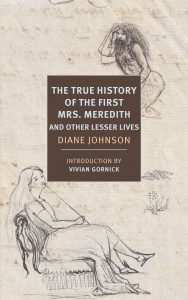 Diane Johnson, The True History of the First Mrs. Meredith and Other Lesser Lives
Diane Johnson, The True History of the First Mrs. Meredith and Other Lesser Lives
NYRB, June 23
Diane Johnson turned 85 last year and what a long, spectacular life in writing she has had. In the early 1950s, while still a student at a small women’s college in Missouri, she came to New York and interned along side Sylvia Plath at Mademoiselle. Like so many of her contemporaries, Plath included, Johnson married young, in her case, leaving school early, and within a dozen years she had four children, a PhD in Literature from UCLA, and a newly minted divorce. That year, 1965, she issued her first novel and has been publishing across many genres ever since. For fifty years she has been one of several writers the New York Review has dispatched to write on lives missing in public.
Her novels, from the satirical tales of ex-pat life, like Le Divorce, one of three National Book Award finalists she’s written, to Lying Low, her 1970s Patty Hearst aria of the consequences of radical life, are stylish and thrilling adult pleasures. Novels that work within the marriage plot, yet show how capacious that space can be when interrogated well. Persian Nights, a Pulitzer finalist in 1988, bears rereading now, with its tale of innocents abroad in the build up to the Shah’s revolution in 1979. A group of Americans in residence at an Iranian hospital are so preoccupied with their energetically low-key extra-marital couplings that they don’t see what’s right before them. Along the way, Johnson moonlit in Hollywood, co-writing the screenplay to The Shining, and also molded herself into an excellent biographer, of Dashiell Hammett and others. The best of her work in this form is The True History of Mrs Meredith and Other Lesser Lives, first issued in 1972, now republished, which begins with this powerful series of sentences. “Many people have described the Famous Writer presiding at his dinner table. . . . He is famous; everybody remembers his remarks. . . . We forget that there were other family members at the table—a quiet person, now muffled by time, shadowy, whose heart pounded with love, perhaps, or rage.” Thus begins Johnson’s life of the Mary Ellen Peacock Meredith, the daughter of the painter Thomas Love Peacock and later first wife to the poet George Meredith. What a sterling book this is, an early version of a genre—the “lesser” life—and as such, bursting with energy as it makes a new form. Vivian Gornick contributes an excellent introduction, arguing why rereading the lives within the life of a writer is an essential moral task. –John Freeman, Lit Hub Executive Editor
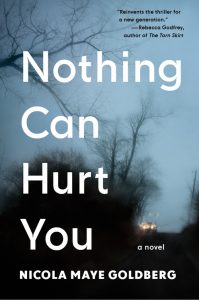 Nicola Maye Goldberg, Nothing Can Hurt You
Nicola Maye Goldberg, Nothing Can Hurt You
Bloomsbury, June 23
This debut literary thriller, which is based on a true story, investigates the complicated reverberations of a college student’s murder in a small community in upstate New York. “This novel feels wholly new,” Rebecca Godfrey wrote. “Goldberg elegantly destroys all the ‘dead girl’ tropes we’ve tired of, and in doing so reinvents the thriller for a new generation—her heroines, like her voice, are wise, darkly funny, and often startingly beautiful.” Sounds good to me. –Emily Temple, Lit Hub Senior Editor
 Elijah Cummings, We’re Better Than This
Elijah Cummings, We’re Better Than This
Harper, June 30
If you feel grim about government, or fearful of where the U.S. is going. If you need hope—or courage—that to fight for justice in a civic sphere is worth your time, your very breath: follow this link here and listen to the late representative Elijah Cummings. His passionate, decent and enlarging idea of what the U.S. can be is bound to stir. He does not for a second coat over the many spectacles of injustice one encounters every day. As he points out in this interview, he lived through them. “My passion comes from pain,” he says. Then proceeds to list the ways his grand-father, his father, and his mother struggled. We’re better than this is a frequent refrain, it doesn’t need to be explained; he used it frequently in other speeches he gave on capitol hill. Congress lost a beacon of light and love when he died, but Cummings has left behind this book. If there’s any resemblance between it and the way he lived, what he fought for, what he spoke about, it will provide necessary communion with our better natures. –John Freeman, Lit Hub Executive Editor
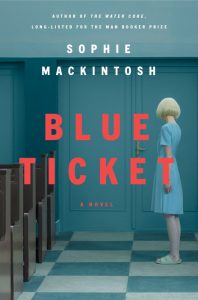 Sophie Mackintosh, Blue Ticket
Sophie Mackintosh, Blue Ticket
Doubleday, June 30
As you may have noticed, I am a huge fan of Sophie Mackintosh’s luminous, intense The Water Cure, so I cannot wait for her second novel, set in a world in which a lottery system tells women what kind of life they’ll have: will they be a wife and mother or a career? But when Calla begins to question her ticket, she winds up on the run and at odds with the world she knows. Sign me up. –Emily Temple, Lit Hub Senior Editor
JULY
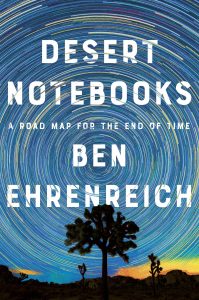 Ben Ehrenreich, Desert Notebooks
Ben Ehrenreich, Desert Notebooks
Counterpoint, July 7
The past few years of an accelerated, increasingly destructive climate crisis have brought a number of books that struggle to respond accordingly to a crisis of such magnitude; several writers have met this existential challenge with an equally existential discussion of the ways that the climate crisis affects our understanding of human history and time itself. Ben Ehrenreich, a columnist for The Nation, takes this discussion to the American southwest, examining the intersection of science, mythology, and landscape in the desert, in particular in Joshua Tree and Las Vegas. In these settings, Ehrenreich’s book reflects on the ways that the prospect of extinction has affected our understanding of time, and how we use that shift in perspective as we move forward. –Corinne Segal, Lit Hub Senior Editor
 Leila Slimani, Sex and Lies
Leila Slimani, Sex and Lies
Penguin, July 14
Five years ago, in Morocco for the publication of her bracingly erotic first novel, Adele, Leila Slimani had a series of unexpected conversations. I know what your book is about, Slimani’s childhood nanny said to her, I could tell you stories. Later, at an event at a bookshop, a sex worker approached the author and said something similar. Slimani’s novel—published last year in the US as Adele—told the story of a recently married woman in Paris who spirals toward oblivion through a series of increasingly risky sexual encounters. It’s not hard to see why it’s publication in Arabic would provoke a reaction.
Slimani began her writing life as a journalist, so she paid attention to what she was hearing, and began a series of interviews with Moroccan women of all kinds about the secrets they kept amongst each other in their sexual lives. Sex and Lives is the result of these conversations, which proceeded over several trips. Slimani keeps a light presence in the interviews, not unlike Svetlana Alexievich’s conversations with former Soviet women soldiers remembering their role in World War II, so the effect is an ensemble portrait of women drawn together through the force of pressures they all face. Each interaction, like this one, excerpted in the power issue of Freeman’s, is potent with the force of that pressure being briefly lifted. –John Freeman, Lit Hub Executive Editor
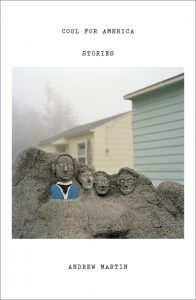 Andrew Martin, Cool for America
Andrew Martin, Cool for America
FSG, July 7
If you read Andrew Martin’s debut novel Early Work, which came out in 2018, you might just recognize a few of the characters—and more than a few of the themes—in his follow-up, a short story collection about making art, thinking about making art, and also trying to be a person (sometimes in the company of other persons, sometimes whilst, you guessed it, making art). I know I’m making it sound insane, but just read the title story and I think you’ll be convinced. –Emily Temple, Lit Hub Senior Editor
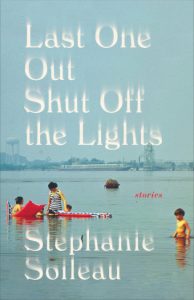 Stephanie Soileau, Last One Out Shut Off the Lights
Stephanie Soileau, Last One Out Shut Off the Lights
Little, Brown, July 7
These quietly moving stories are set in the backwater of the winding down Louisiana oil economy, where the climate crisis is a new destructive force: wetlands are dying and whole towns are becoming unlivable. The characters in Soileau’s struggle to live in a world where home is a tentative thing, searching for purchase elsewhere in their lives. Enchanting and so neatly planed they feel made by time, this book marks the debut of a writer to watch. –John Freeman, Lit Hub Executive Editor
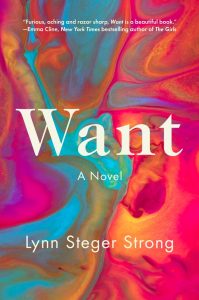 Lynn Steger Strong, Want
Lynn Steger Strong, Want
Henry Holt, July 7
Lit Hub contributor Lynn Steger Strong’s second novel centers on an overworked, overeducated, and underpaid woman living in New York, who reconnects with an old friend at what may be just the right moment. Leslie Jamison called it “a fierce, funny, and consistently surprising exploration of friendship, bankruptcy, motherhood, and that slippery thing we call privilege,” and wrote that “the voice is electric and nuanced; it feels possessed by a rare, inexplicable urgency. It’s less that this novel peels away the surfaces of daily life―school pick-up, subway commutes, vomiting toddlers―to expose the deeper truths dwelling underneath, and more that it exposes the ways those deep truths already saturate every crevice of our day-to-day lives.” Sold. –Emily Temple, Lit Hub Senior Editor
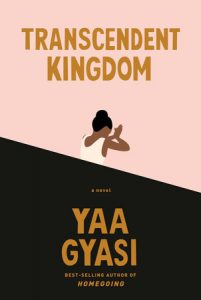 Yaa Gyasi, Transcendent Kingdom
Yaa Gyasi, Transcendent Kingdom
Knopf, July 14
Yaa Gyasi’s Homegoing, the story of the slave trade’s toll on a family lineage across three centuries, was a stunning, sweeping debut; Ron Charles of The Washington Post described Gyasi’s style as “agile enough to reflect the remarkable range of her first novel.” I’m eager to read her next book, the story of a Ghanaian family set in Alabama whose protagonist studies neuroscience at Stanford University and recently lost her brother to a heroin overdose. That deep loss raises questions about the abilities of faith and science to address human suffering; addressing those questions is an ambitious undertaking, one for which Gyasi seems uniquely suited. –Corinne Segal, Lit Hub Senior Editor
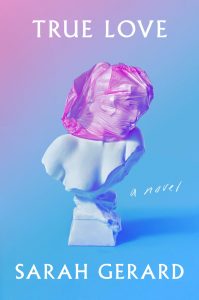 Sarah Gerard, True Love
Sarah Gerard, True Love
Harper, July 7
In the latest novel from the author of Binary Star and the acclaimed 2017 essay collection Sunshine State, a struggling writer drops out of college to start over and find love, and burns her way through a cast of outrageous and dismal characters as she does so. Which, you know, relatable. –Emily Temple, Lit Hub Senior Editor
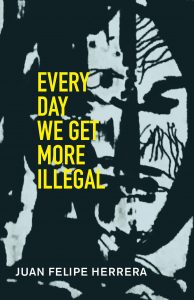 Juan Felipe Herrera, Every Day We Get More Illegal
Juan Felipe Herrera, Every Day We Get More Illegal
City Lights, July 14
Syncopated by a series of song-like addresses to a firefly on a road north, this dexterous and luminous new book by former US Poet Laureate is part Basho, part protest poem. Herrera’s roving eye captures all, from moments of ephemeral calm, to the way workers work—Herrera, the son of migrant farm workers, laments how hard it has been for high culture to even regard people like them. The migrants who travel in shadows. Here as in other books, Herrera has stripped punctuation from many of the poems, leaving them to blow as if a holy wind moves through them. A prolific voice for justice, Herrera continues to see the world with compassion, a goofy sort of humor, and a liberationist’s roving kind of care. These are warm poems for hard times. –John Freeman, Lit Hub Executive Editor
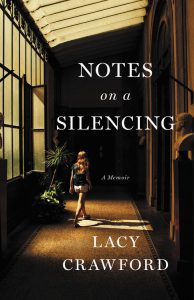 Lacy Crawford, Notes on a Silencing
Lacy Crawford, Notes on a Silencing
Little Brown, July 14
Lacy Crawford, writer, wife, and mother, thought she had put the sexual assault she survived at age 15 behind her. But when Crawford heard that her old alma mater, the elite St. Paul’s School in Concord, New Hampshire, had come under state investigation after widespread reports of sexual abuse on its campus, she got in touch with the detectives—and soon found out how extensive the coverup and gaslighting she experienced had become. A riveting story of and for our time. –Emily Temple, Lit Hub Senior Editor
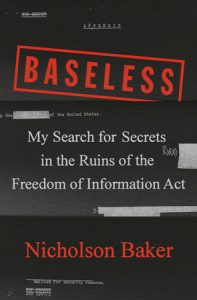 Nicholson Baker, Baseless: My Search for Secrets in the Ruins of the Freedom of Information Act
Nicholson Baker, Baseless: My Search for Secrets in the Ruins of the Freedom of Information Act
Penguin Press, July 14
From the very beginning of his writing life, in the brief, brilliant novel, The Mezzanine, Nicholson Baker has approached the process of describing the present as an ever expanding archive of moments. Thoughts and movements so tiny they can expand infinitely all the way down to the quark. In time, Baker moved from such imaginary archives to real ones, such as the rotten piling up stacks of old time newspapers he described rescuing in Double Fold, which won a NBCC award 20 years ago, to Human Smoke, which dug way into the margins of recorded history and found a burgeoning pacifist movement right up until and through World War II. Now Baker has gone to the archive tool on everyone’s mind in our bizarro times, the Freedom of Information Act. Here’s Baker’s account of its history and his own attempt to use it, what he found, what he didn’t. This will make for important context as a blizzard of FOIA requests form, in some cases, one of our only defenses between a lying mendacious president and his next term. –John Freeman, Lit Hub Executive Editor
 Chelsea Manning, Untitled Memoir
Chelsea Manning, Untitled Memoir
FSG, July 21
“This is one of the most significant documents of our time removing the fog of war,” Chelsea Manning wrote in 2010, when transferring over 750,000 documents to Wikileaks, arguing what she was showing revealed “the true nature of 21st-century asymmetric warfare.” Adding, “have a good day.” She ultimately spent seven years in prison for refusing to testify against Assange, “fighting to stay alive,” he told the Guardian in an interview a year after her sentence was commuted by President Obama. She now is going to tell her story in a memoir and it is sure to be moving, powerful, explosive, at the heart of so many aspects of American life today. –John Freeman, Lit Hub Executive Editor
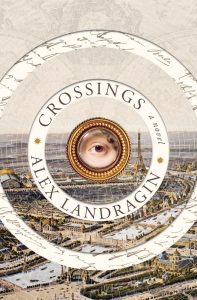 Alex Landragin, Crossings
Alex Landragin, Crossings
St. Martin’s, July 28
This genre-bending debut is more than a novel within a novel: it’s a letter from Baudelaire to an illiterate girl, a noir Romance, and the memoir of a deathless queen . . . within a novel. It’s a puzzle box that can be read in two different directions, and as someone who likes a little play (not to mention post-modernism) in their literature, I am awaiting it eagerly. –Emily Temple, Lit Hub Senior Editor
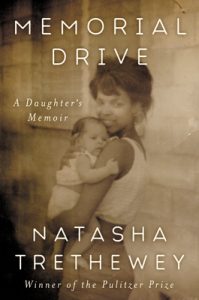 Natasha Trethewey, Memorial Drive
Natasha Trethewey, Memorial Drive
Ecco, July 28
A terrible event she has survived informs so much of Natasha Trethewey’s poems. When she was 19, Trethewey’s step-father shot and killed her mother. Trethewey has said she turned to poetry to understand what had happened. Now she turns to prose. What a devastating story she has to tell; if it is at all like her Pulitzer Prize-winning poems, it will lift and mourn and think at the same time. –John Freeman, Lit Hub Executive Editor
 Lauren Beukes, Afterland
Lauren Beukes, Afterland
Mulholland, July 28
I am always here for new Lauren Beukes, but this one sounds particularly good: in a wold in which a pandemic has killed almost all of the men in the world, Cole is on the run across the American west with her twelve-year-old son, who is disguised as a girl to protect him from those who would use him for their own devices—including his own sister. But regardless of plot, you can always trust Beukes to surprise and delight—as long as you’ve got a strong stomach. –Emily Temple, Lit Hub Senior Editor
AND BEYOND
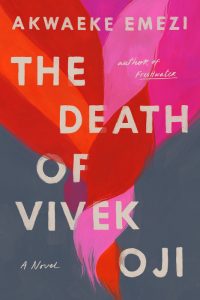 Akwaeke Emezi, The Death of Vivek Oji
Akwaeke Emezi, The Death of Vivek Oji
Riverhead, August 4
Awkaeke Emezi is one of the most daring, blazingly imaginative young writers at work today. Their debut novel, Freshwater, was a coming-of-age tale of a girl of Igbo ethnicity born with multiple selves, each under the domain of a different ogbanje, dark spirits of the Igbo belief system, was a breath of fresh air when it was released in early 2018. Their new novel, a Nigeria-set mystery, begins with a mother opening her front door to discover her son’s body, wrapped in colorful fabric, at her feet. We then follow this mysterious, somewhat unknowable child, Vivek, through childhood, adolescence and adulthood as he navigates his disorienting blackouts, an emotionally distant father, and a close bond with his cousin, all leading up to “a heart-stopping act of violence in a moment of exhilarating freedom.” –Dan Sheehan, Book Marks Editor
 Edward O. Wilson, Tales from the Ant World
Edward O. Wilson, Tales from the Ant World
Liveright, August 4
“Ants are the most warlike of all animals, with colony pitted against colony. . . . Their clashes dwarf Waterloo and Gettysburg.” Sorry, but what else do you want from a book? (There’s a reason Achilles’s soldiers were called Myrmidons aka, ants). Legendary biologist Edward O. Wilson takes a grand tour of the world’s great ant colonies, from Mozambique to New Guinea to the backyards of Alabama. Again, what else do you want from a book? It’s right there in the title, people. –Jonny Diamond, Lit Hub Editor in Chief
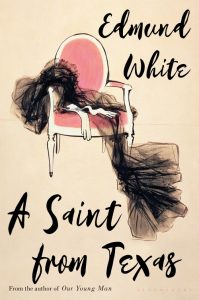 Edmund White, A Saint From Texas
Edmund White, A Saint From Texas
Bloomsbury, August 4
A new novel from decorated writer and social critic Edmund White—who turned 80 years old this month—is always cause for celebration. This one follows two Texas sisters, Yvette and Yvonne, who will take two very different paths: one into the highest Parisian social classes, the other into the church. Anne Beattie called it “a brilliantly observed story about how we find ourselves by losing ourselves, about family bonds and how the harm done to us can warp us into something new.” –Emily Temple, Lit Hub Senior Editor
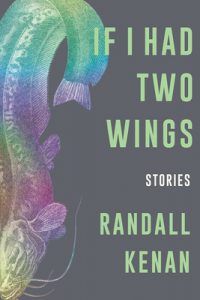 Randall Kenan, If I Had Two Wings
Randall Kenan, If I Had Two Wings
Norton, August 4
Randall Kenan has taken a nearly 30-year break from publishing short fiction. Let the Dead Bury the Dead, his linked 1992 collection, unfolded the tales of real life Tims Creek, a corner of North Carolina that one of its residents explains in the book was founded as a “maroon society,” a place so off the beaten path no one would disturb the runaway slaves who settled there. Supernatural and odd, full of the living dead and fairy tales that will raise your hair, the book took southern gothic and exploded it on the spot. For almost 30 years Kenan worked in nonfiction, rewriting The Fire This Time, traveling the US, from Alaska to Maine, collecting oral histories of African Americans. Now Kenan has returned to Tims Creek and more tales to tell. They involve a man at a nursing home, a rich man haunted by a pig, and a woman in the last years of her life who turns into a miracle worker. What a joy it is to have Kenan back in the teller’s seat. –John Freeman, Lit Hub Executive Editor
 J. Courtney Sullivan, Friends and Strangers
J. Courtney Sullivan, Friends and Strangers
Knopf, June 23
I am an absolute sucker for books about complicated female friendships, so this one, which tells the story of a desultory Brooklyn transplant to a small-town who befriends her infant’s young babysitter, is right up my alley. As their friendship develops, the younger woman grows closer to the older’s father-in-law, which causes a rift between them. Then: betrayal! That is a maddening tease, and one which has absolutely hooked me. –Jessie Gaynor, Social Media Editor
 Pankaj Mishra, Bland Fanatics
Pankaj Mishra, Bland Fanatics
FSG, August 4
Pankaj Mishra is out there doing the thankless work of dealing with people like Jordan Peterson—who we’d all just rather ignore—combatting a thousand tossed-off pseudo-centrist op-eds with vibrant, rigorous prose. This is a massive industry, now, these intellectual underlaborers of empire in decline, toiling in the mephitic depths of YouTube in hopes of graduating to Fox or the conference circuit; and though the lion’s share of their “ideas” are based in hysterical pseudoscience and racist nostalgia, these ideological farts have begun surfacing in actual American policy. We should be grateful for Mishra, hydra-slayer, and I only hope he has the endurance for many more essay collections to come. –Jonny Diamond, Lit Hub Editor in Chief
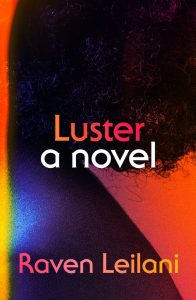 Raven Leilani, Luster
Raven Leilani, Luster
FSG, August 4
I’m really excited for this debut novel, in which a young black woman, an aspiring painter living in New York City, finds herself enmeshed in the open marriage of a white family in New Jersey, and the confidante of their adopted daughter, Akila, who is desperately in need of role models who look like her. By all accounts, the voice is sharp and witty and fresh, which makes it a book for me. –Emily Temple, Lit Hub Senior Editor
 Darin Strauss, The Queen of Tuesday
Darin Strauss, The Queen of Tuesday
Random House, August 15
This extraordinary double biography tells the story of Strauss’ grandfather and of Lucille Ball, both of whom were at a party hosted by Fred Trump in New York on 1949. It was the kind of party that shows you from where Donald Trump got his media sense. That night Fred Trump hosted a giant bash at the Pavillon of Fun, a grand, architecturally significant pavilion in Steeplechase Park in Coney Island. Trump had bought the place and planned to demolish it, and already there was push back on the flagrant destruction of a landmark. So the party was throw to coax as much society as possible into the building. Then, at the stroke of midnight, they would be given bricks and told to smash through the glass ceiling. They did, it was a hit, and that Trump got his way.
Strauss sees this as the apotheosis of a time, of which we’re seeing a new kind of moment now. Moving between his grandfather and Lucille Ball, he paints a dual portrait, of people made by will, seemingly charmed. And in a final section, entirely fictional, he imagines them having an affair together. Both are dead, have long since been dead, and there’s very little here to harm anyone, including Strauss’ father, who told him, go ahead, write the story. In this fantastic period piece about a people and a time who had the power to imagine everything, going the moon, even. Strauss seems to be asking: did they imagine the best things? The most tender or unlikely? This book moves like a metaphysical cover of a Frank Sinatra song, full of familiar brassy sounds, but it leaves a mournful afterglow. –John Freeman, Lit Hub Executive Editor
 Suleika Jaouad, Between Two Kingdoms
Suleika Jaouad, Between Two Kingdoms
Random House, August 18
You may already be familiar with Suleika Jaouad and her story—diagnosed with cancer at age 22—from her New York Times column, “Life, Interrupted,” which she began writing at the bone marrow transplant unit at Memorial Sloan-Kettering Cancer Center. But whether you already know about her or not, you’ll want to be on the lookout for her first memoir, which is indeed about her four-year battle with cancer—but also about the battle of re-entering a world she had thought was lost to her forever. –Emily Temple, Lit Hub Senior Editor
 Nick Flynn, This is the Night Our House Will Catch Fire
Nick Flynn, This is the Night Our House Will Catch Fire
Norton, August 25
I really can’t decide whether I like Nick Flynn’s poetry or his memoirs better; luckily, we don’t have to choose. The author of Another Bullshit Night in Suck City‘s latest memoir investigates his own tumultuous childhood—including the time his mother set fire to their house—and looks at its reverberations into his current life as a parent. Flynn is a ferocious and fascinating writer, and I can’t wait to dig into his latest. –Emily Temple, Lit Hub Senior Editor
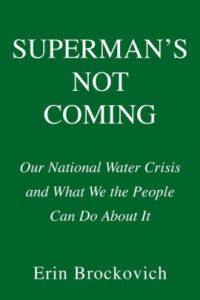 Erin Brockovich, Superman’s Not Coming
Erin Brockovich, Superman’s Not Coming
Pantheon, August 25
Many of us are already familiar with environmental activist Erin Brockovich’s story from the award-winning film that portrayed her work in Hinkley, California, where she helped residents win a case against Pacific Gas and Electric after the company’s irresponsible disposal of carcinogens affected the town’s groundwater. The title of her newest book, Superman’s Not Coming, reflects an attitude Brockovich has long brought to her activist work as she has urged residents to educate and advocate for themselves in the face of environmental degradation. The book looks at communities that have done just that, from upstate New York to Missouri and beyond, in a collection of stories that testify to the ingenuity of residents fighting for the right to access clean, safe water. –Corinne Segal, Lit Hub Senior Editor
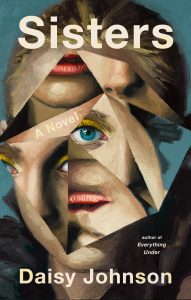 Daisy Johnson, Sisters
Daisy Johnson, Sisters
Riverhead, August 25
In 2018, Daisy Johnson became the youngest ever writer to be shortlisted for the prestigious Booker Prize—for her debut novel, no less. Everything Under announced her as a major talent, and so I’m very much looking forward to her sophomore effort, in which a pair of close sisters move across the country with their mother, into a strange and creepy house, and soon begin to come apart at the seams. –Emily Temple, Lit Hub Senior Editor
 Alex Ross, Wagnerism: Art and Politics in the Shadow of Music
Alex Ross, Wagnerism: Art and Politics in the Shadow of Music
FSG, September 1
It’s been over a decade since Alex Ross’s now definitive study of classic music came out, and this new book, apparently all that time in the making and more, will be his definitive book, a study of music and its relationship to politics and cruelty as told through the story of Wagner. –John Freeman, Lit Hub Executive Editor
 Evie Wyld, The Bass Rock
Evie Wyld, The Bass Rock
Pantheon, September 1
The new novel from the author of All the Birds Singing intertwines the life of three women, decades apart, whom men seek to control on the Scottish coast. Max Porter called it “a multi-generational modern gothic triumph. It is spectacularly well-observed, profoundly disquieting, and utterly riveting. Like all Evie Wyld’s work it is startlingly insightful about psychological and physical abuse. It is a haunting, masterful novel.” Another one I can’t wait to read. –Emily Temple, Lit Hub Senior Editor
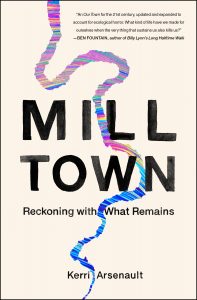 Kerri Arsenault, Mill Town
Kerri Arsenault, Mill Town
St. Martin’s, September 1
Kerri Arsenault grew up in a small town in rural Maine next to a mill which employed her father, her ancestors, and most of the people in the surrounding area. In time, the dioxins it pumped into the river running through the area would kill many people dependent on the mill, including her father. And yet, many people in town believed in the mill, they adored it, they fought its sale, and then they have worried about its departure. Why did they stay? How could they go? This profoundly important book reports on the way so many parts of America are killing the people who love them. Tender, angry, full of respect and bewilderment, it is a complex love letter to a hometown. It’s also a powerful glimpse of how corporate power, small town pride, and death are entwined in America: a vivid insight to the unbuilding of an American dream. With blurbs form Richard Russo and others, this will be one of the major nonfiction books of a year in which the debate over what America is will rage. –John Freeman, Lit Hub Executive Editor
 Emma Cline, Daddy
Emma Cline, Daddy
Random House, September 1
As previously reported, we are at long last getting another book from wunderkind Emma Cline. The first short story collection from the Plimpton Prize-winning author of The Girls is sure to be incredible—or at least I personally think Cline’s stories are even better than her bestselling, much-hyped novel. Read “Marion” for a little preview of this one. –Emily Temple, Lit Hub Senior Editor
 David Karashima, Who We’re Reading When We’re Reading Murakami
David Karashima, Who We’re Reading When We’re Reading Murakami
Soft Skull, September 1
Karashima, a Japanese novelist and translator, has conducted a profound riff on the art of translation in considering the work of Haruki Murakami, and how it differs in English from its original publications in Japanese. Tracking the work of the major Murakami translators who have rendered his work into English, this book shows the way it is shaped, edited, and reformed by who is working on it. Like William H. Gass’s book, Reading Rilke, this will probably become a must read for translators and fans of Murakami alike. –John Freeman, Lit Hub Executive Editor
 Hari Kunzru, Red Pill
Hari Kunzru, Red Pill
Knopf, September 1
Hari Kunzru is writing a color trilogy, of which this is volume two, set in the Berlin suburb of Wannsee, featuring a writer on fellowship in the moody present tense. The work is not going well, so at night he binge watches a violent cop drama called Blue Lives, mesmerized by its hollowed out, Darwinian view of human nature. Or he goes for very long walks. Across the lake from where the narrator stays looms the building where the Nazis planned the Final Solution. One night, he is dragged out to a club by friends and meets Anton, the creator of Blue Lives. Bit by bit, the narrator begins to wonder if Anton is red-pilling the fans of Blue Lives, working them up into a froth of anti-social violence. Kunzru is one of our most media savvy novelists, his antennae so finely tuned to the way messaging has been awry for some time now that this book arrives less as a warning, but rather a note to how we got here. –John Freeman, Lit Hub Executive Editor

Ayad Akhtar, Homeland Elegies
Little, Brown, September 8
In Ayad Akhtar’s second novel, after 2012’s American Dervish, the Pulitzer Prize-winning screenwriter delves again into the Pakistani-American experience. His publisher calls the book “an astonishing and deeply personal work about hope and identity in a nation coming apart at the seams. Drawn from Akhtar’s life as the son of Muslim immigrants, Homeland Elegies blends fact and fiction to tell an epic story of belonging and dispossession in the world that 9/11 made. Part family drama, part social essay, part confessional, part picaresque adventure, readers will encounter a darkly comic and wildly ambitious portrait of the late-stage American Dream.” I’m eagerly awaiting this new offering from one of the greats. –Emily Temple, Lit Hub Senior Editor
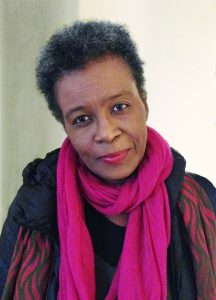 Claudia Rankine, Just Us: An American Conversation
Claudia Rankine, Just Us: An American Conversation
Graywolf, September 8
As you may have noticed, we fully and aggressively stan MacArthur Genius Grantee Claudia Rankine here at Literary Hub (I mean, who doesn’t), and none of us can wait to get our hands on her latest essay collection, about which we have very little information except that, like Citizen, it will use both text and visuals to explore race—in this case focusing on whiteness. Or as the publisher puts it “white privilege, well-meaning liberal politics, white male aggression, the implications of blondness, white supremacy in the White House, the Brett Kavanaugh hearings, and the alarming move toward Brexit.” Any book from Rankine is sure to be an essential addition to our cultural conversation; hopefully this will be a little bit of light in what’s shaping up to be a terrifying fall. –Emily Temple, Lit Hub Senior Editor
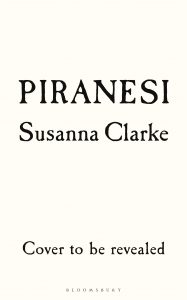 Susanna Clarke, Piranesi
Susanna Clarke, Piranesi
Bloomsbury, September 15
As previously reported in this space, 15 years after her boundary-breaking and widely beloved debut, Jonathan Strange and Mr. Norrell, Susanna Clarke is back. Piranesi is set in a new kind of dreamlike labyrinth: a strange, irreal house with infinite rooms and infinite statues and an ocean trapped within; the eponymous Piranesi lives there with The Other, and the two research A Great and Secret Knowledge. But what is beyond the infinite house? Absurd that we must wait until September to find out. –Emily Temple, Lit Hub Senior Editor
 Christopher Paolini, To Sleep in a Sea of Stars
Christopher Paolini, To Sleep in a Sea of Stars
Tor, September 15
The bestselling author of the Inheritance Cycle has a new book coming in September, which he describes as “a massive science-fiction space opera, full of spaceships, lasers, aliens, explosions, and of course. . . tentacles.” Peggy Olson would approve. “More seriously,” he writes, “I really wanted to capture the sense of wonder I feel when looking up at the stars at night—as well as the sense of optimism I feel when imagining humanity’s future as we expand into space. I’ve spent over seven years working on this book—figuring out the science, the characters, and most importantly, the story—and I can’t wait for you to read it.” By September, I think we’ll be in dire need of some honest-to-goodness wonder. –Emily Temple, Lit Hub Senior Editor
 Dan Chiasson, The Math Campers
Dan Chiasson, The Math Campers
Knopf, September 22
From the poet and New Yorker critic comes a new collection that unpacks both the methods of artistic creation—showing us how poems are formed, and how they evolve—and in the methods of human creation, as Chiasson, the father of teenage boys, reflects of their passage through the years and through the world. –Emily Temple, Lit Hub Senior Editor
 Rumaan Alam, Leave the World Behind
Rumaan Alam, Leave the World Behind
Ecco, October 6
I know nothing at all about this novel, except that Alam himself described it on Twitter as “part horror novel part racial farce and about the relationship between garden variety parental anxiety and climate change anxiety it’s really funny and almost killed me.” To which I say: sold. –Emily Temple, Lit Hub Senior Editor
 Sayaka Murata, Earthlings
Sayaka Murata, Earthlings
Grove, October
Sayaka Murata’s new novel Earthlings takes the mood of colorful disquiet she honed in Convenience Store Woman and pushes it further out. The boy and a girl at the heart of her latest believe they have landed on earth from outer space. Raised by separate families, treated badly, they tack toward each other in this immensely charming, strange and heart-stomping tale. The imagination of this writer grows and grows like outer space. Earthlings should be one of the main fictional events of 2020. –John Freeman, Lit Hub Executive Editor












